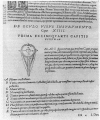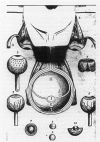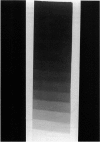Abstract
PURPOSE: This thesis explores the idea that light energy, especially ultraviolet light, contributes to the unequal distribution of cataract around the world and to the development of cortical opacities. METHODS: In the first section, the thesis reviews historical concepts of the function of the lens and the nature of cataract, epidemiologic data on the global distribution of cataract, and clinical observations of the predominant location of cortical opacification. Second, computer ray tracings and geometric optics demonstrate the passage of light of varying angle of incidence within the lens. Third, two models of the human eye are used to study the refraction of light by the cornea and lens and illustrate the concentration of energy at the equatorial plane of the lens. RESULTS: Cataract prevalence increases with proximity to the earth's equator, and cortical cataract is most common in the inferior and inferonasal lens. Theoretical studies and the eye models both demonstrate that the concentration of light within the lens increases with angle of incidence, and the eye models suggest that the inferior and inferonasal lens receives significantly more energy than other sections of the lens. CONCLUSION: The prevalence of cataract and exposure to ultraviolet energy both increase with decreasing latitude. The most common location of cortical cataract in the inferonasal lens is consistent with the greater dose of light energy received by this portion of the lens. These studies suggest that the global distribution of cataract and the development of cortical cataract are at least in part dependent on the dose of ultraviolet light received by the lens.
Full text
PDF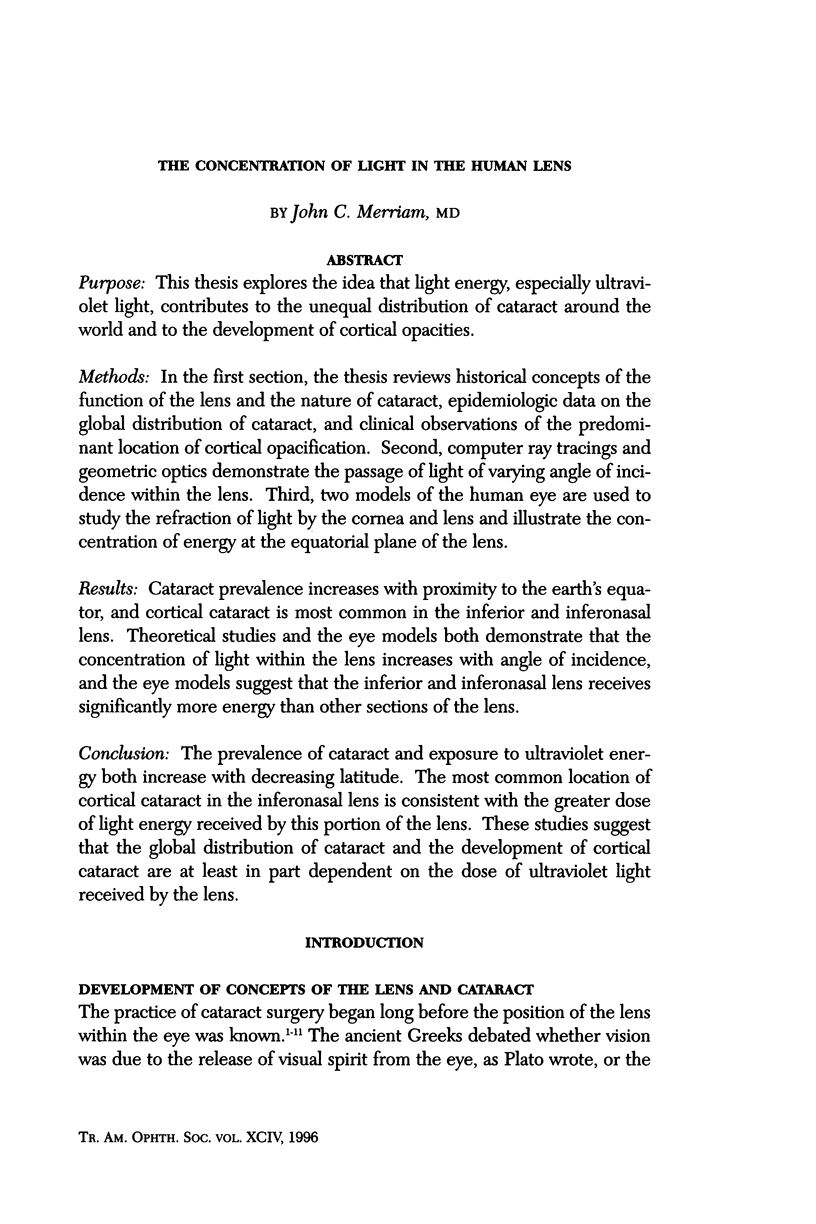
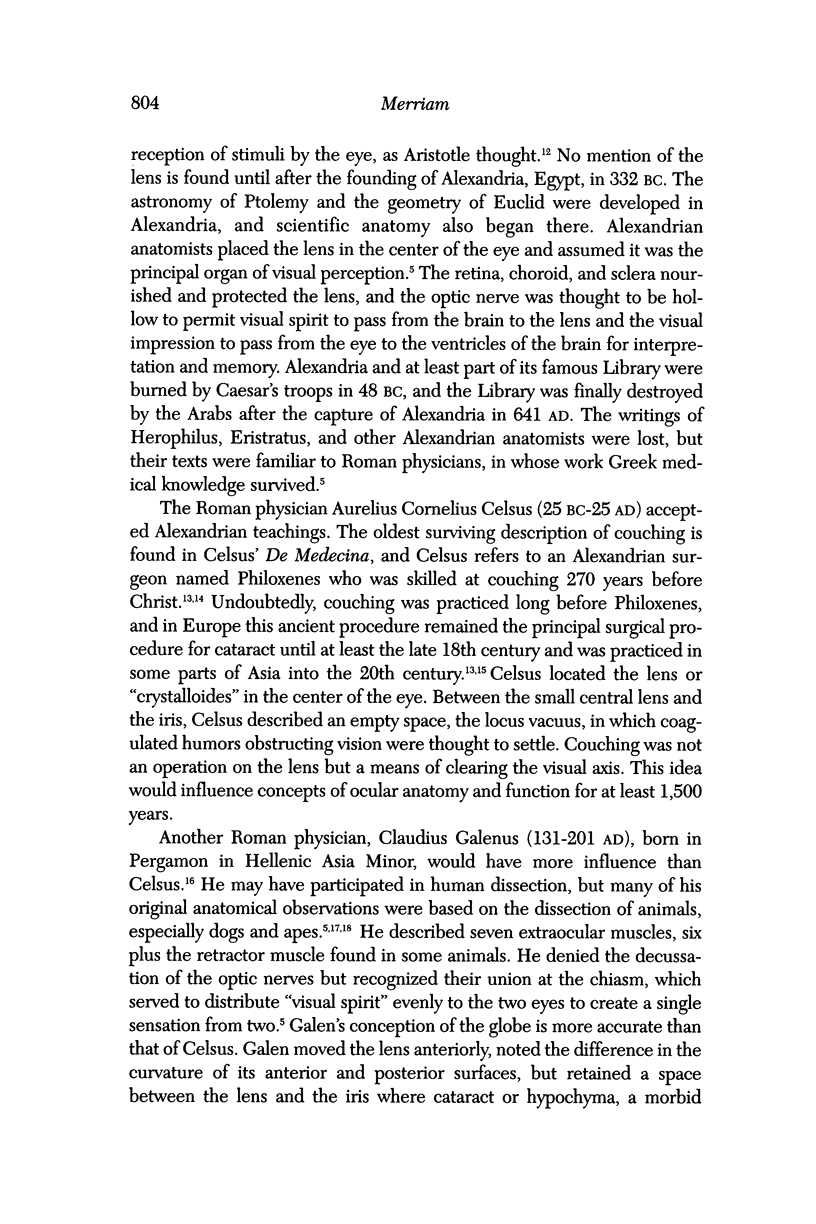
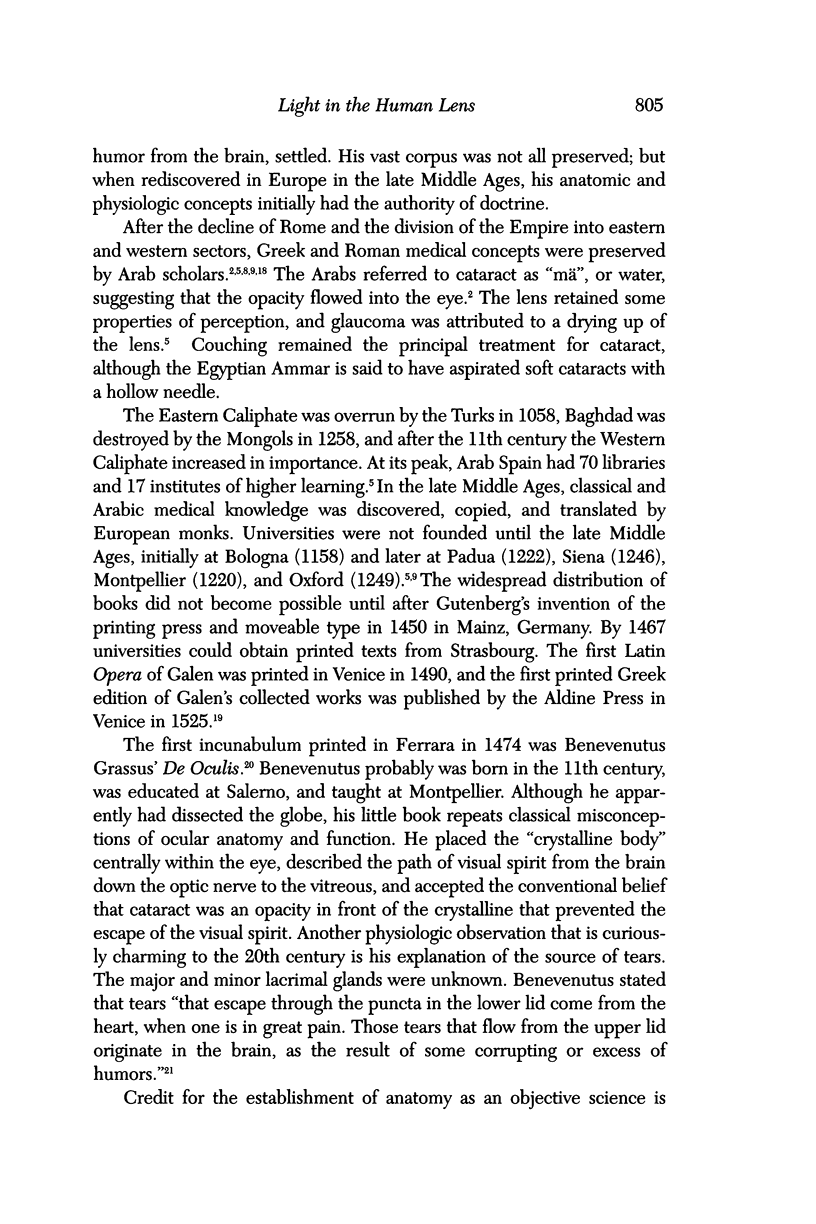
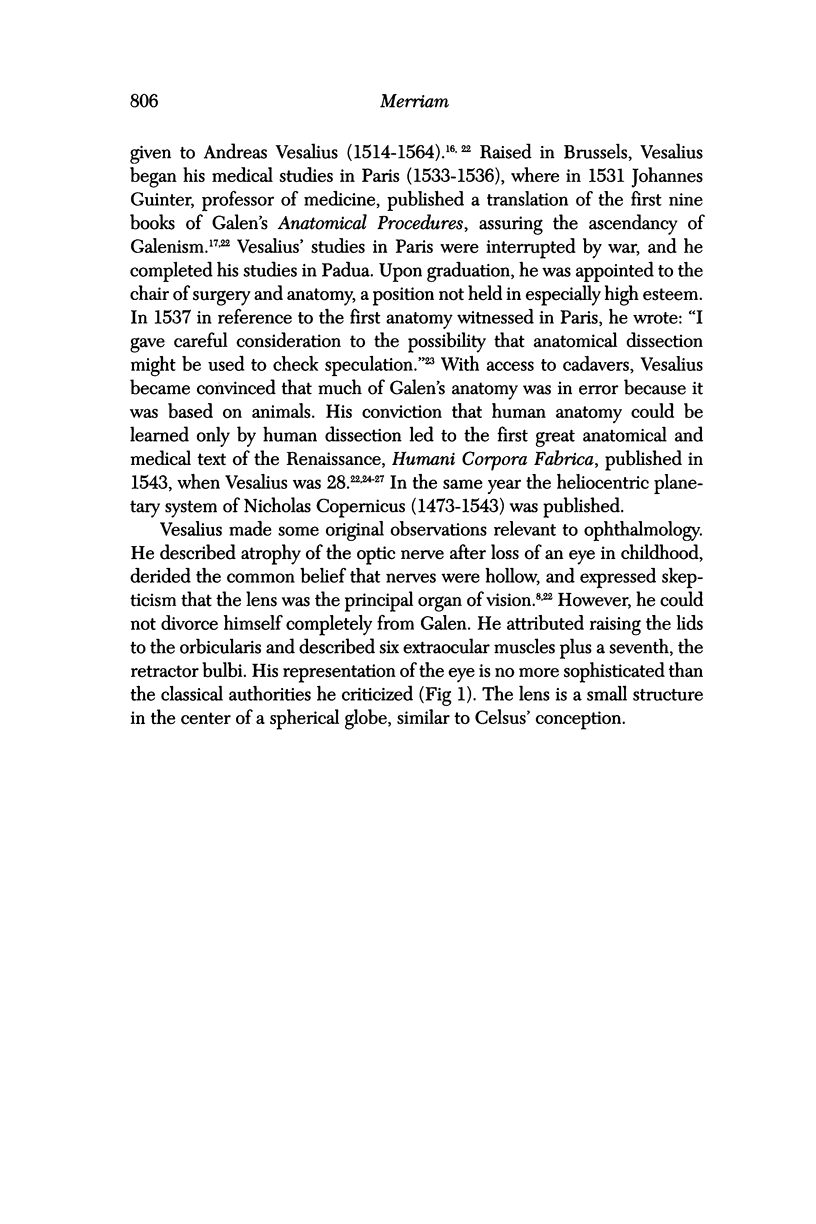
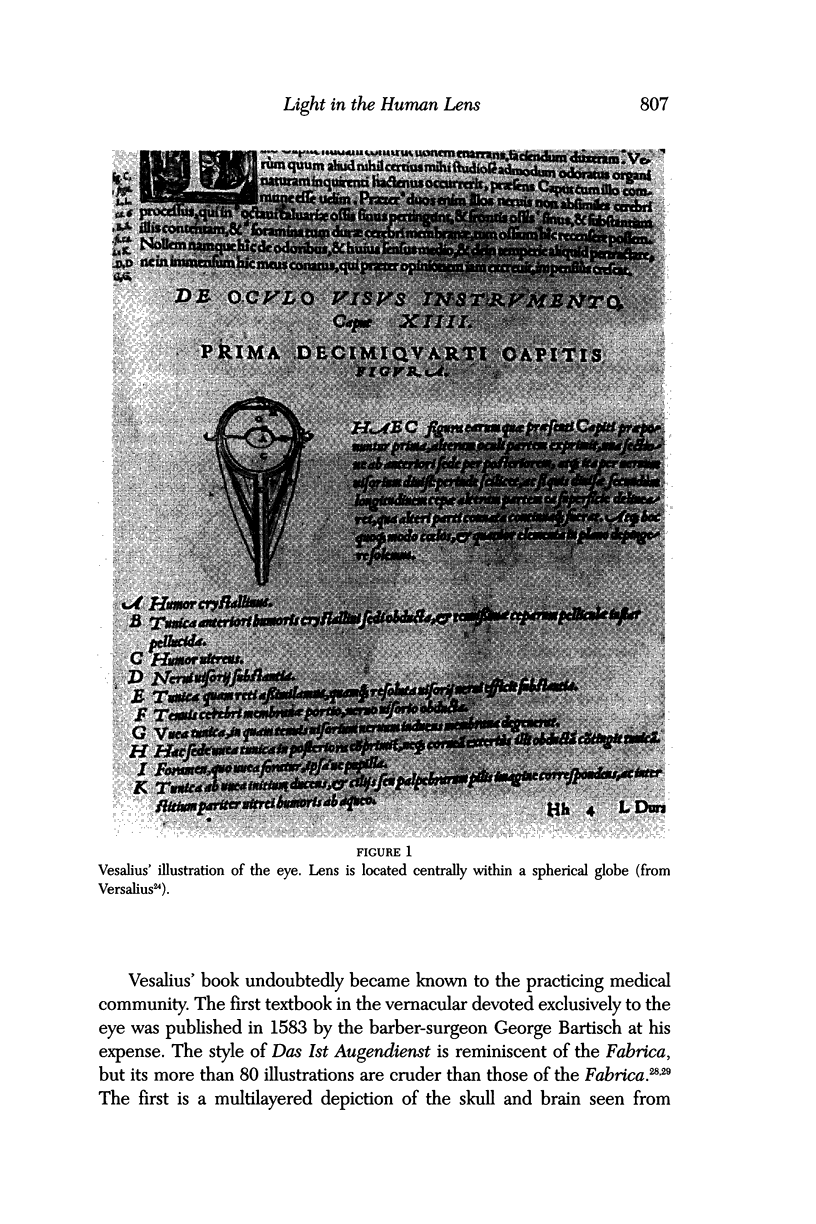
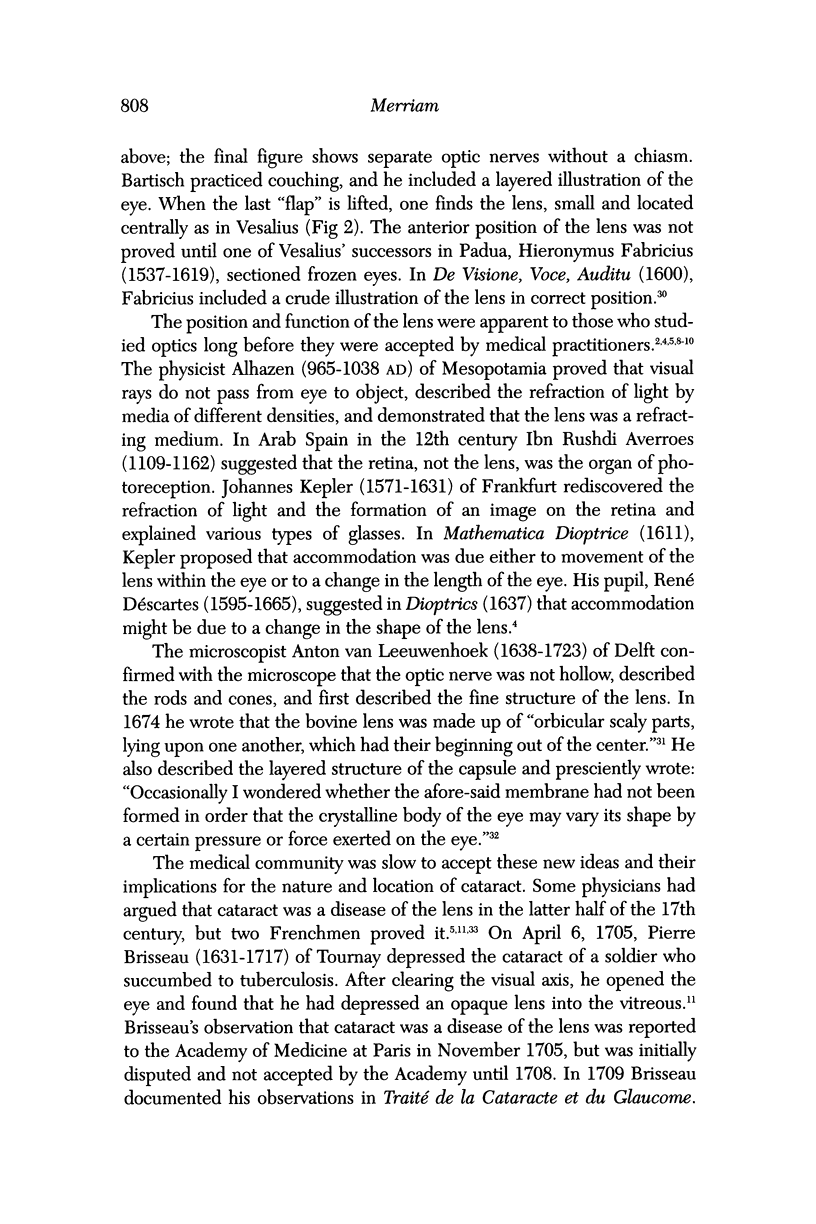
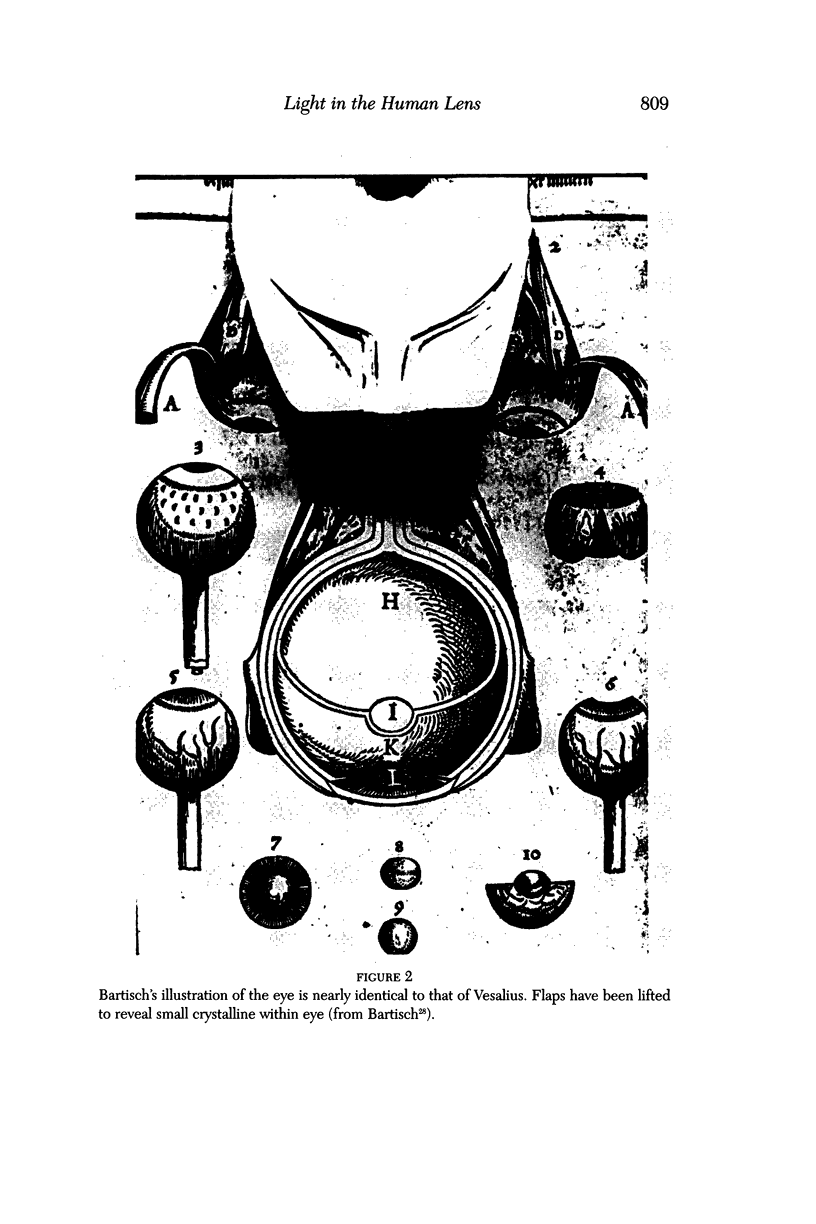
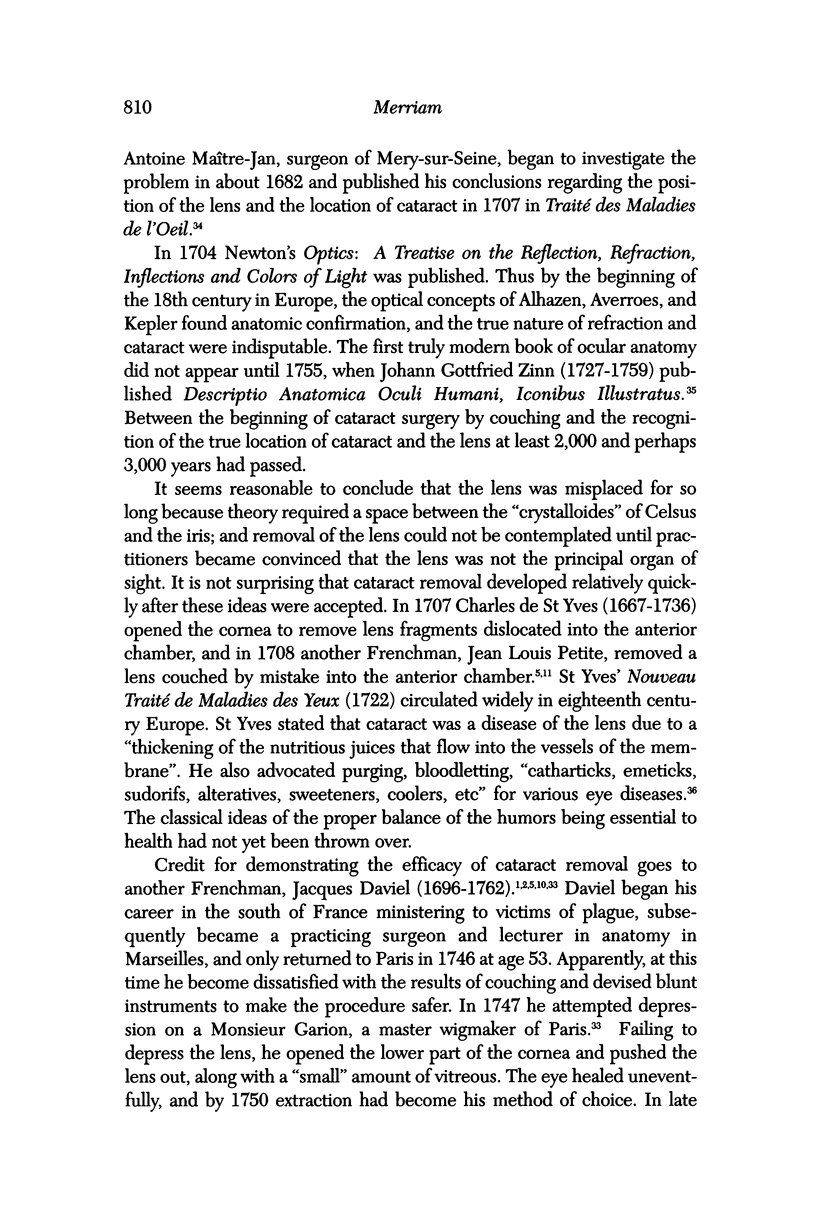
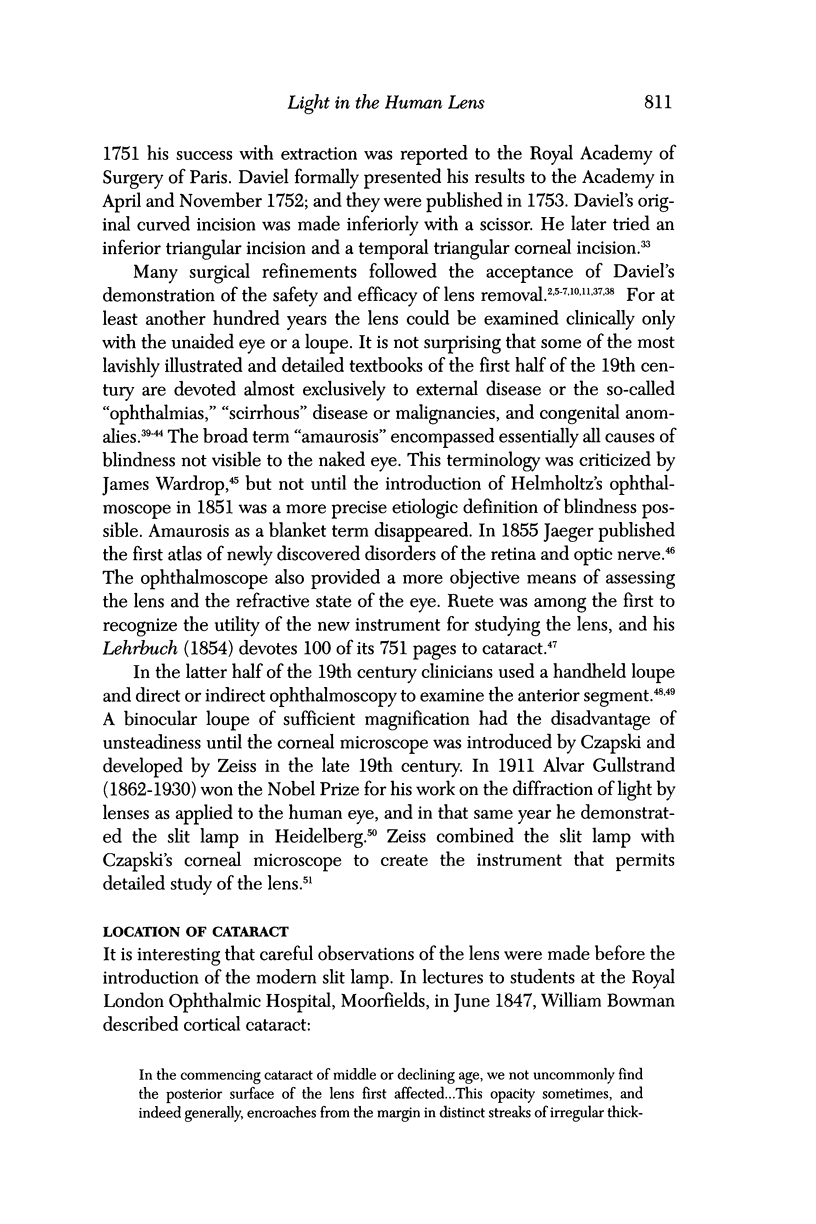
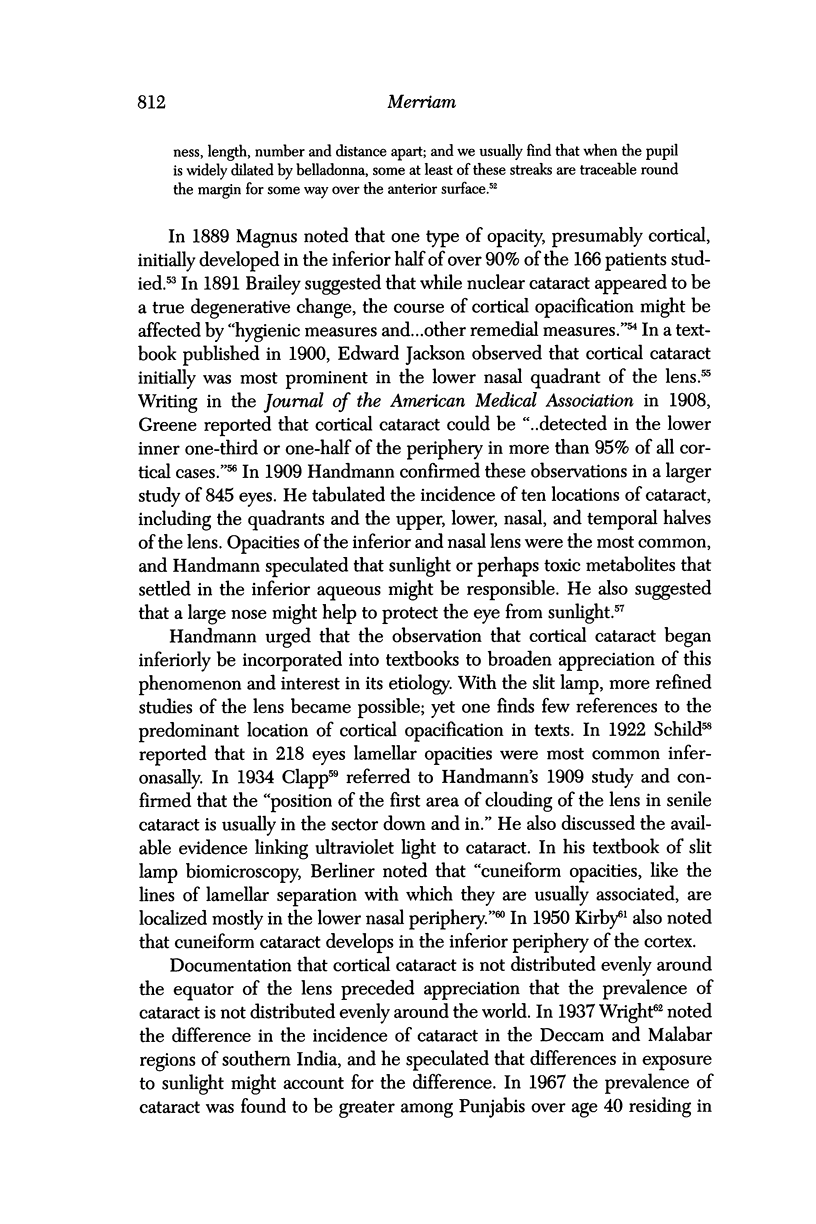
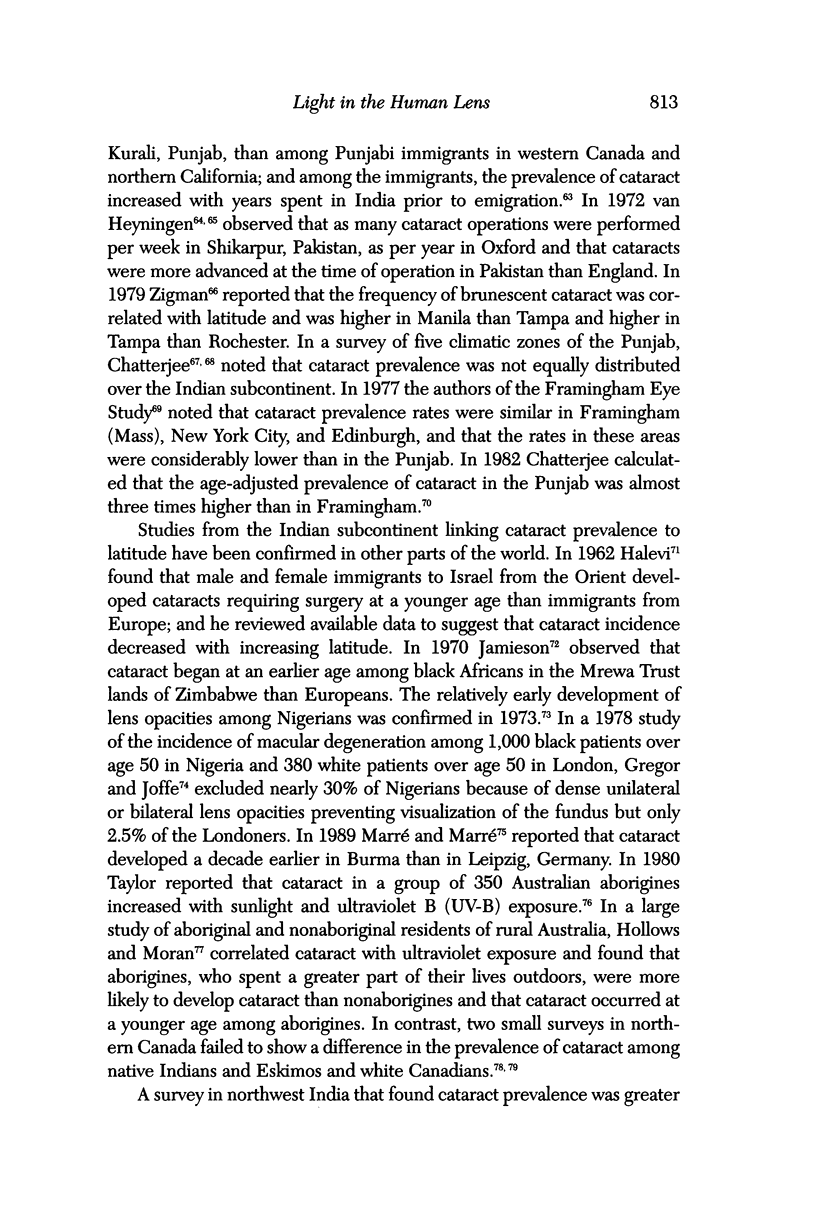
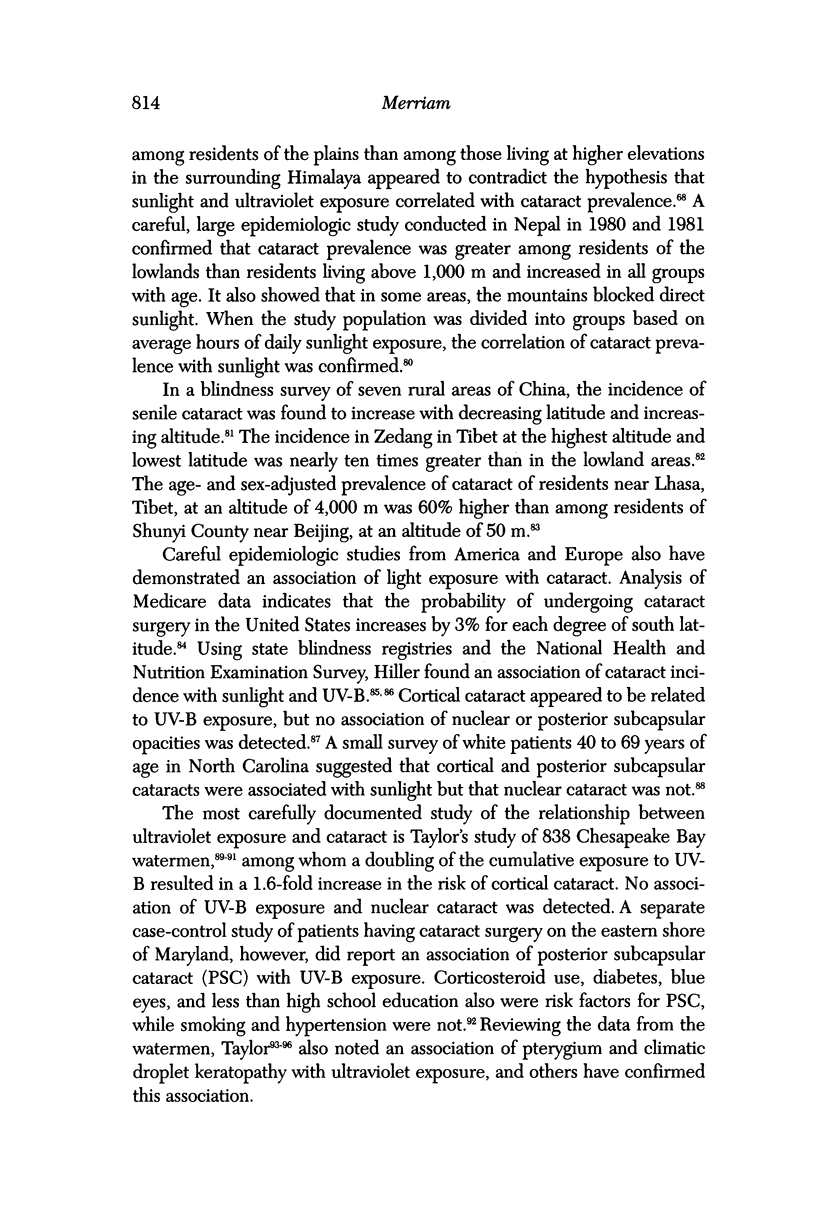
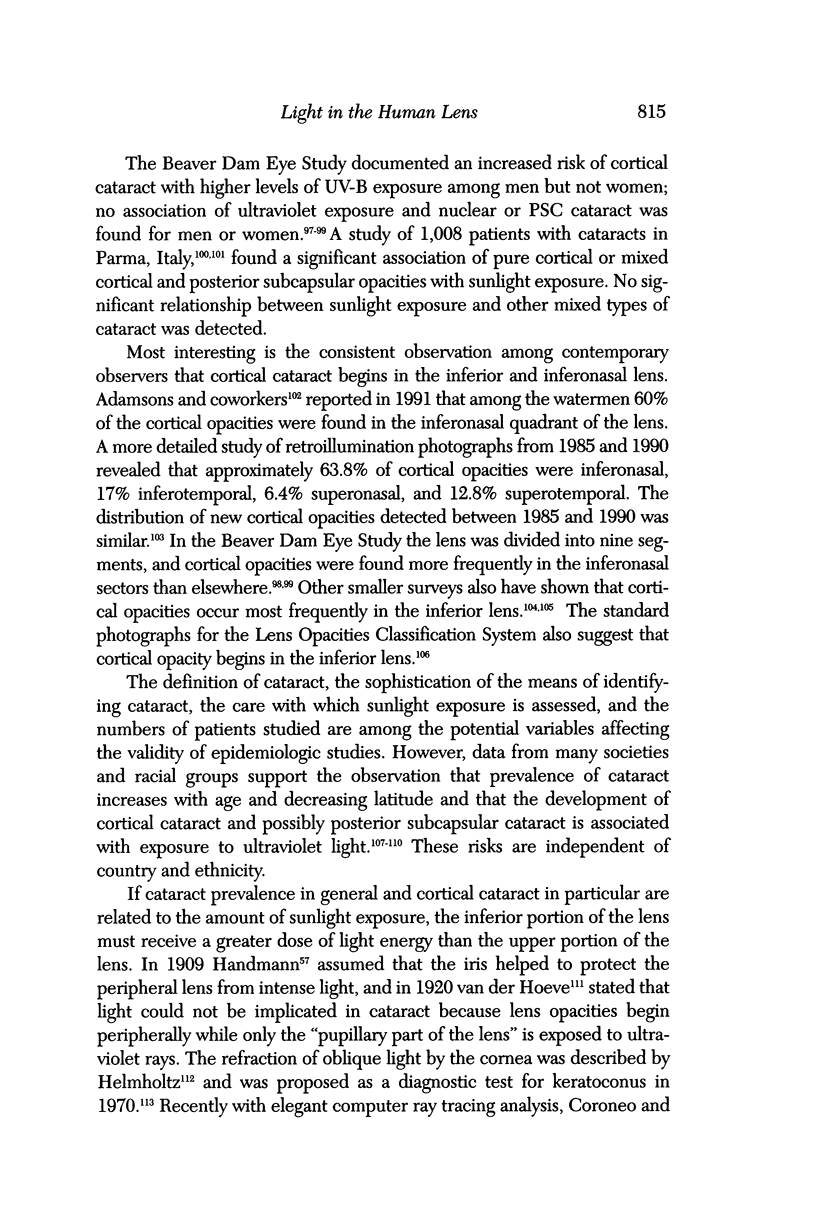
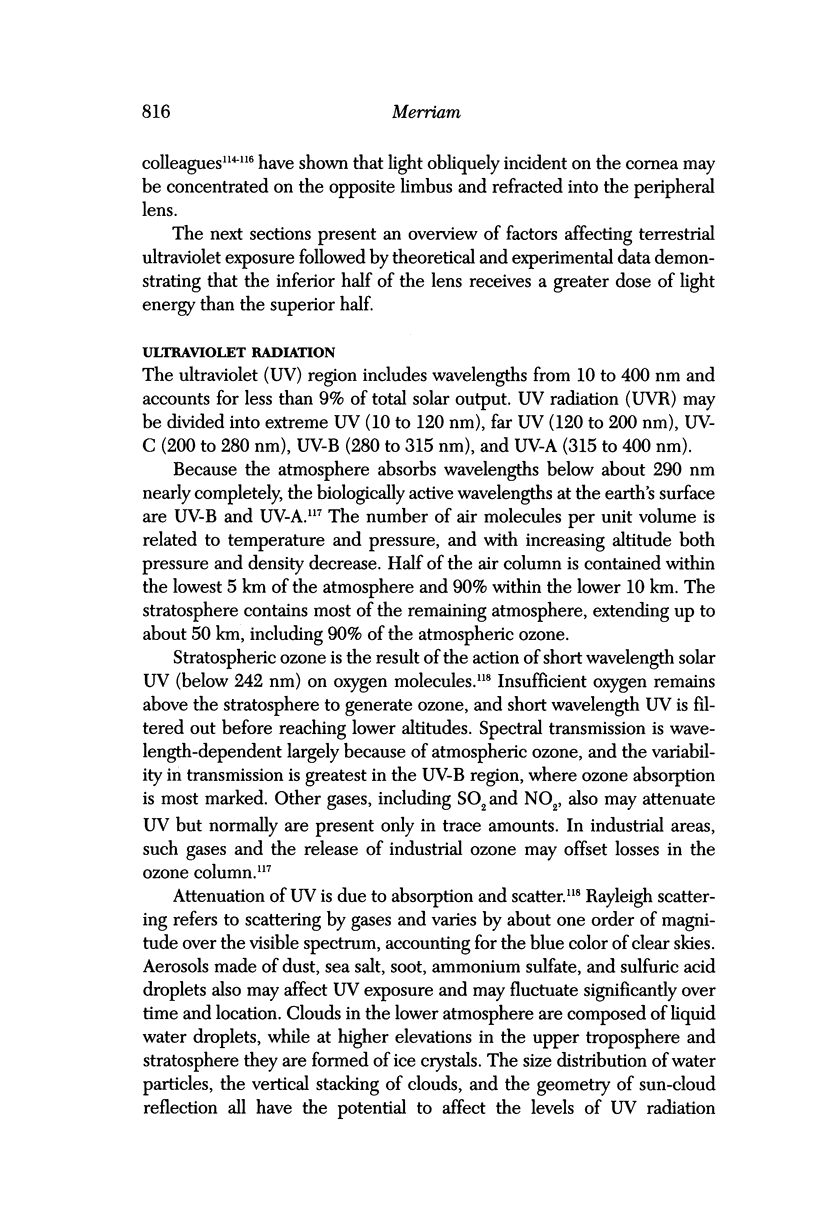
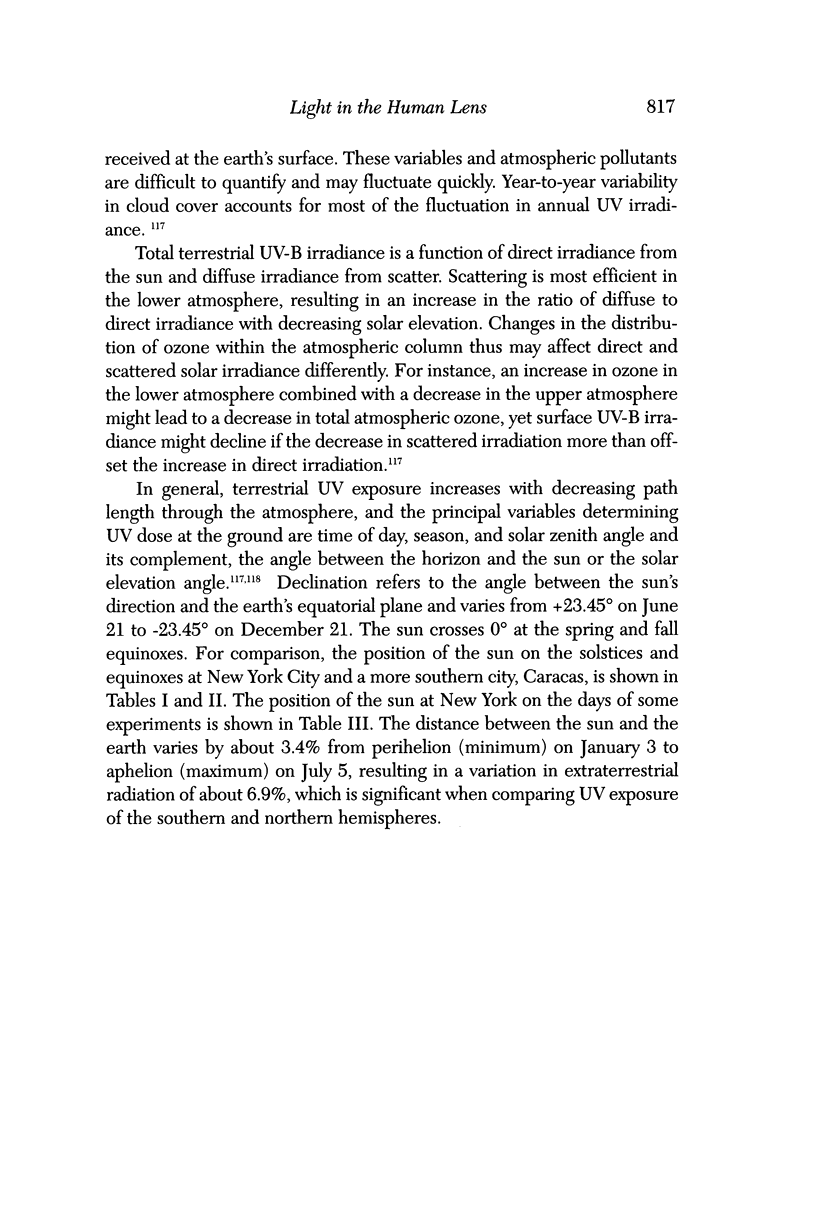
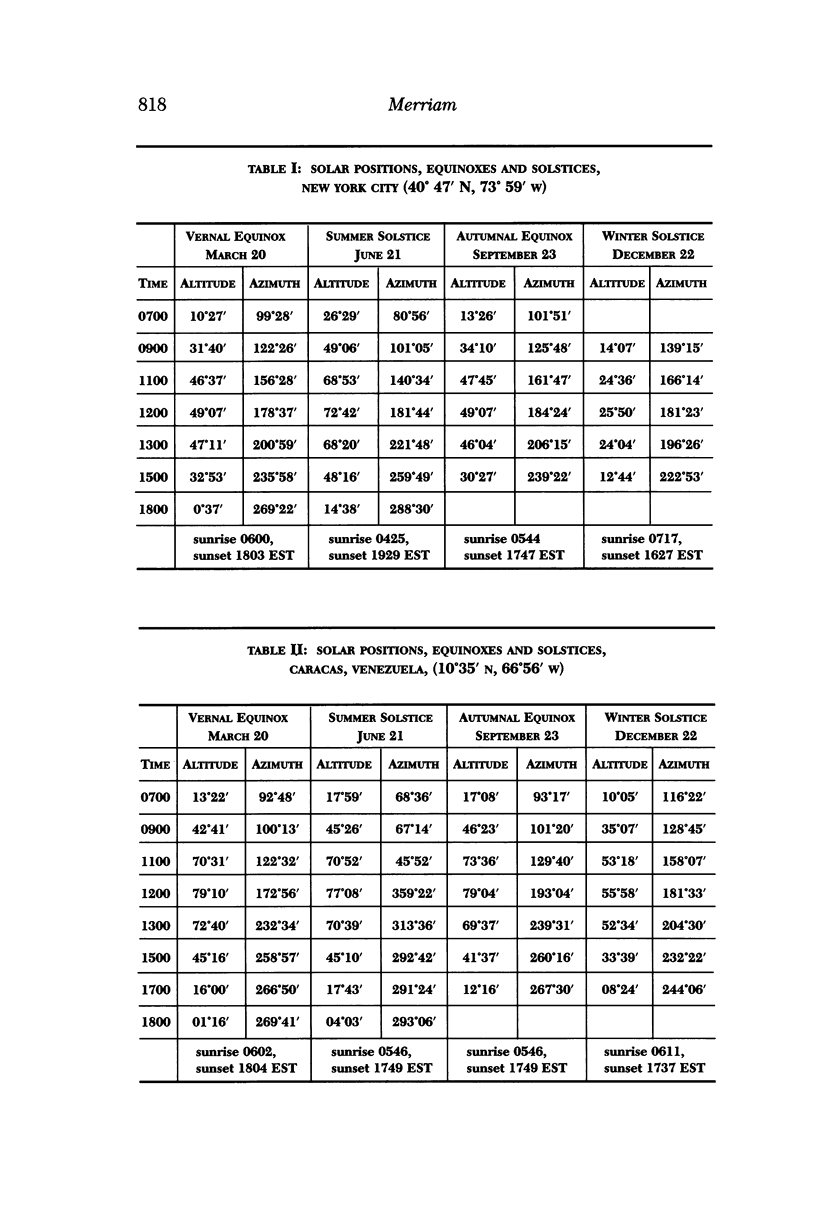
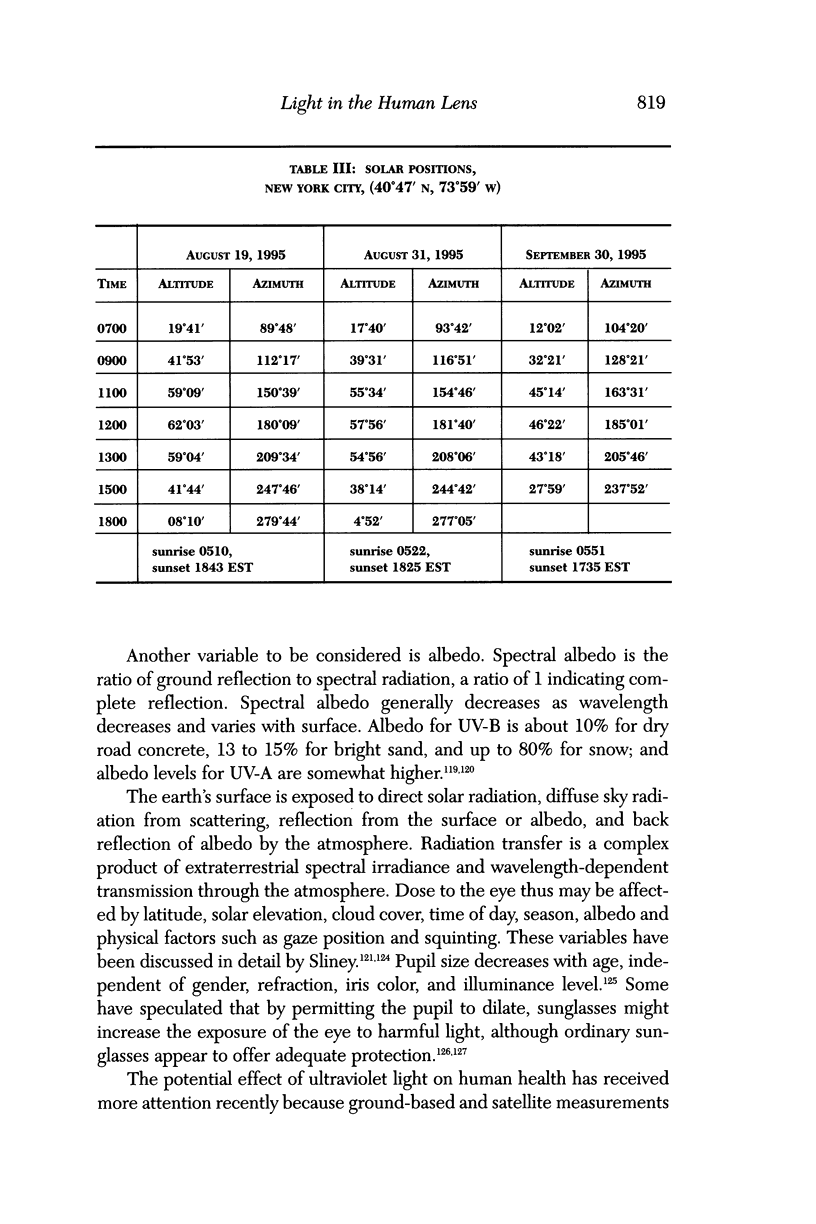
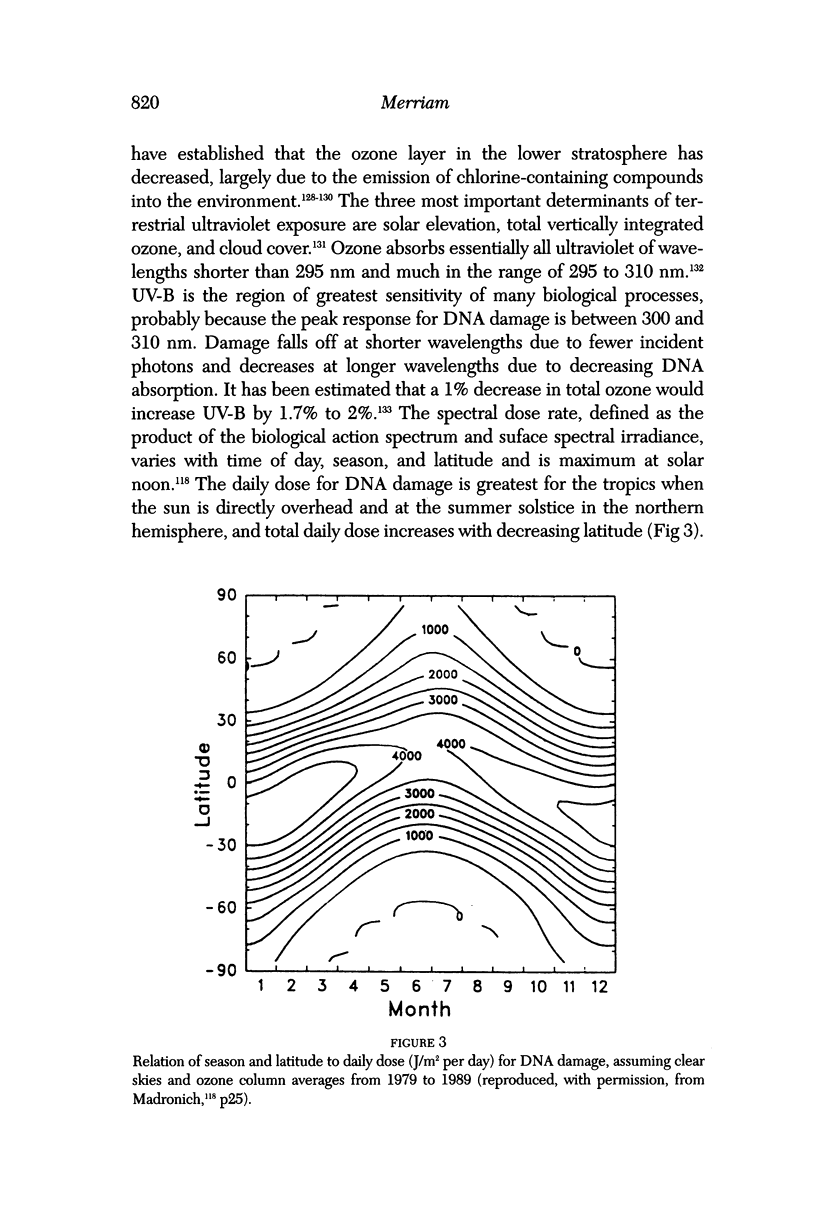
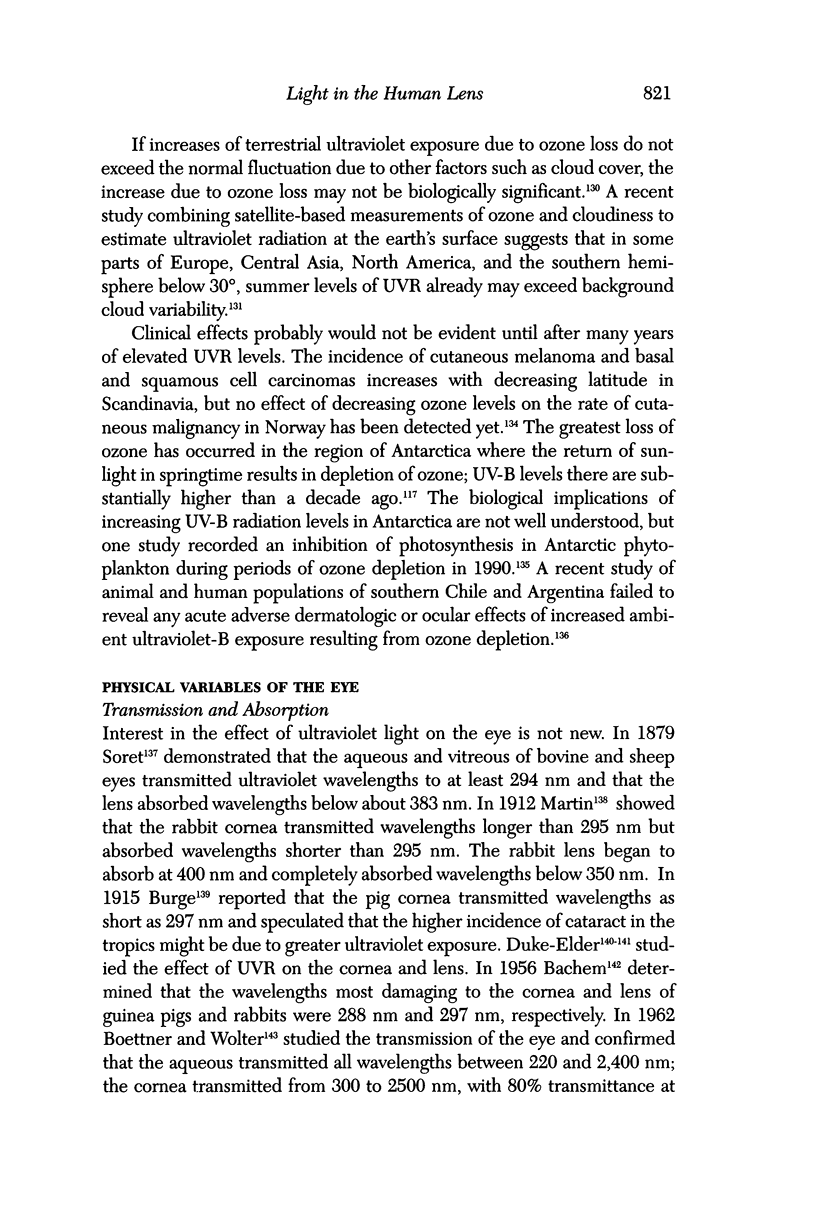
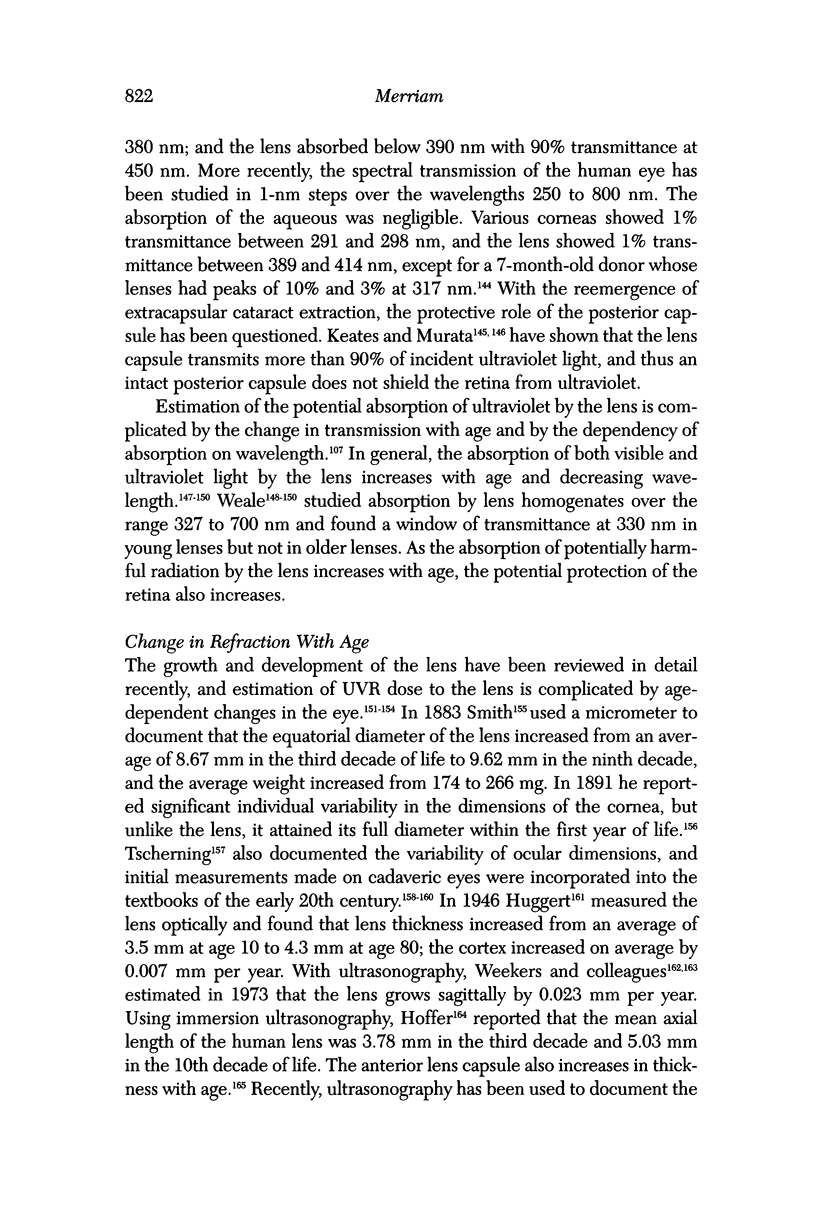
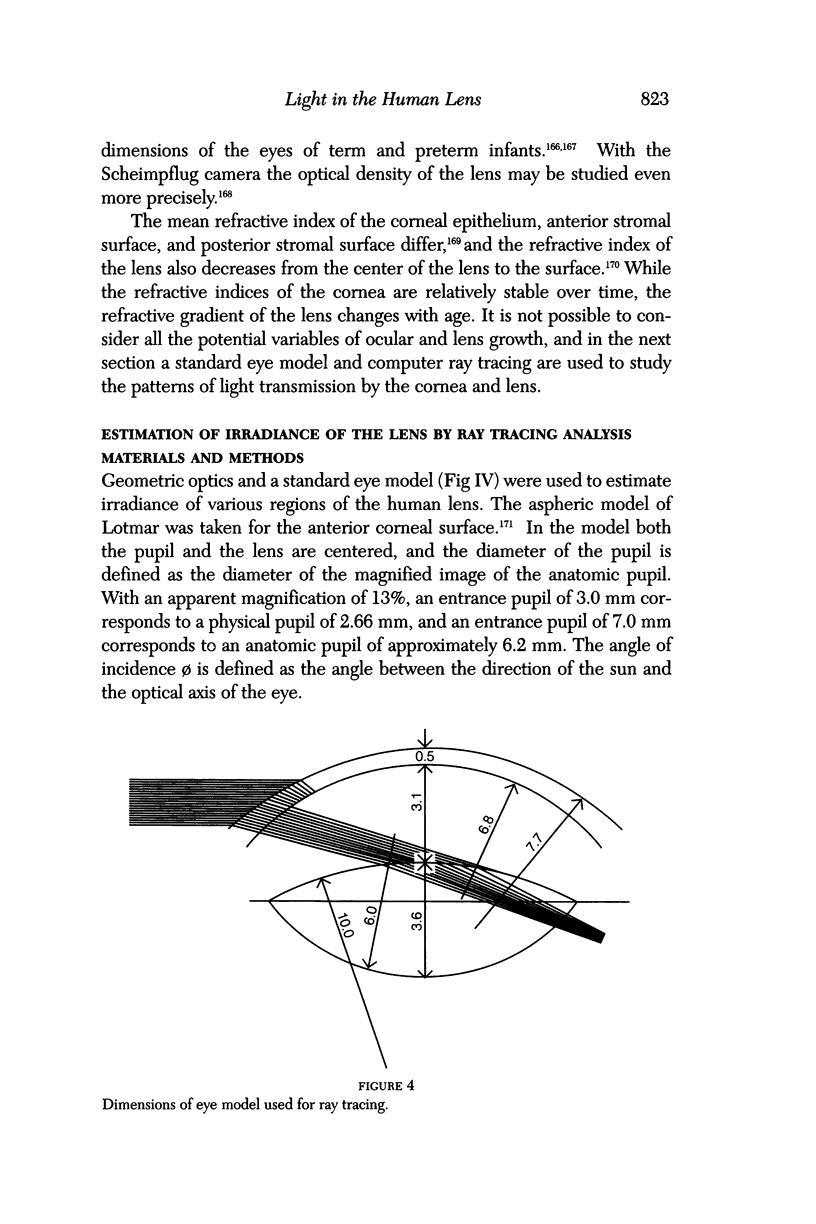
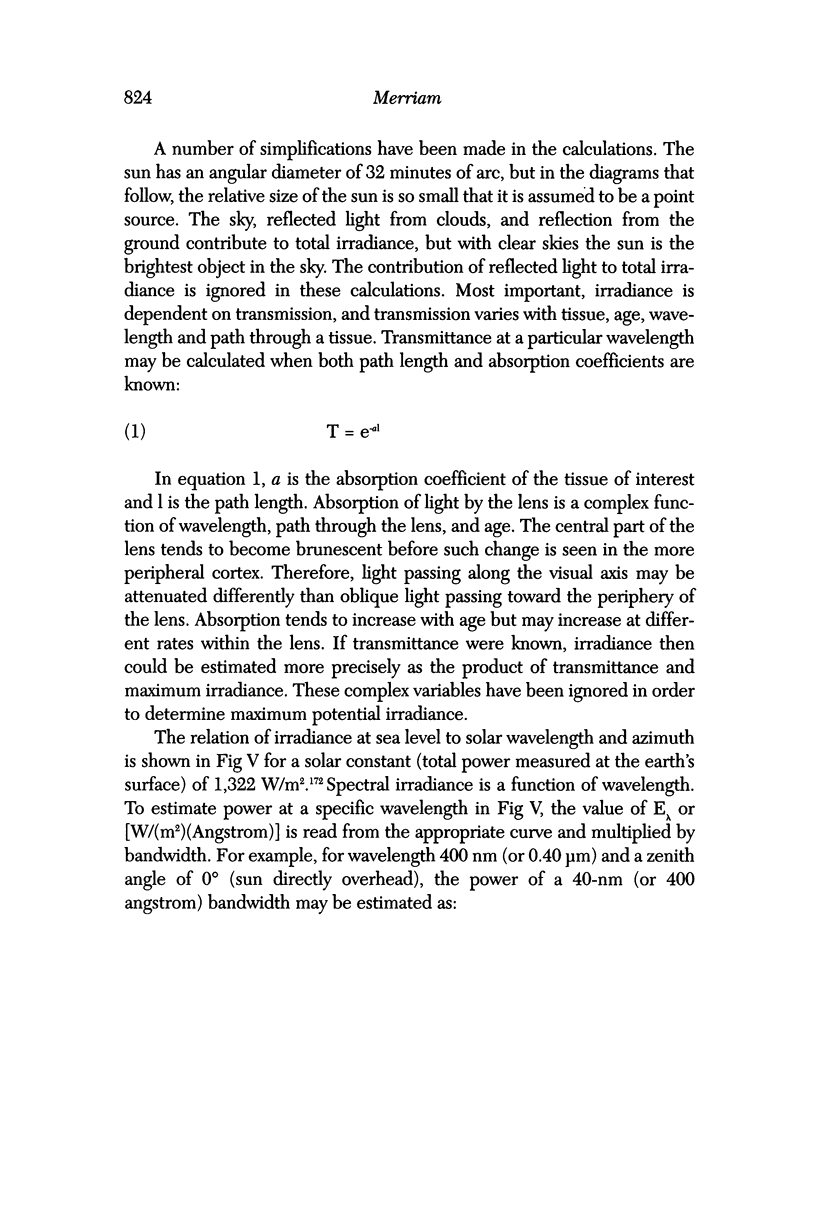
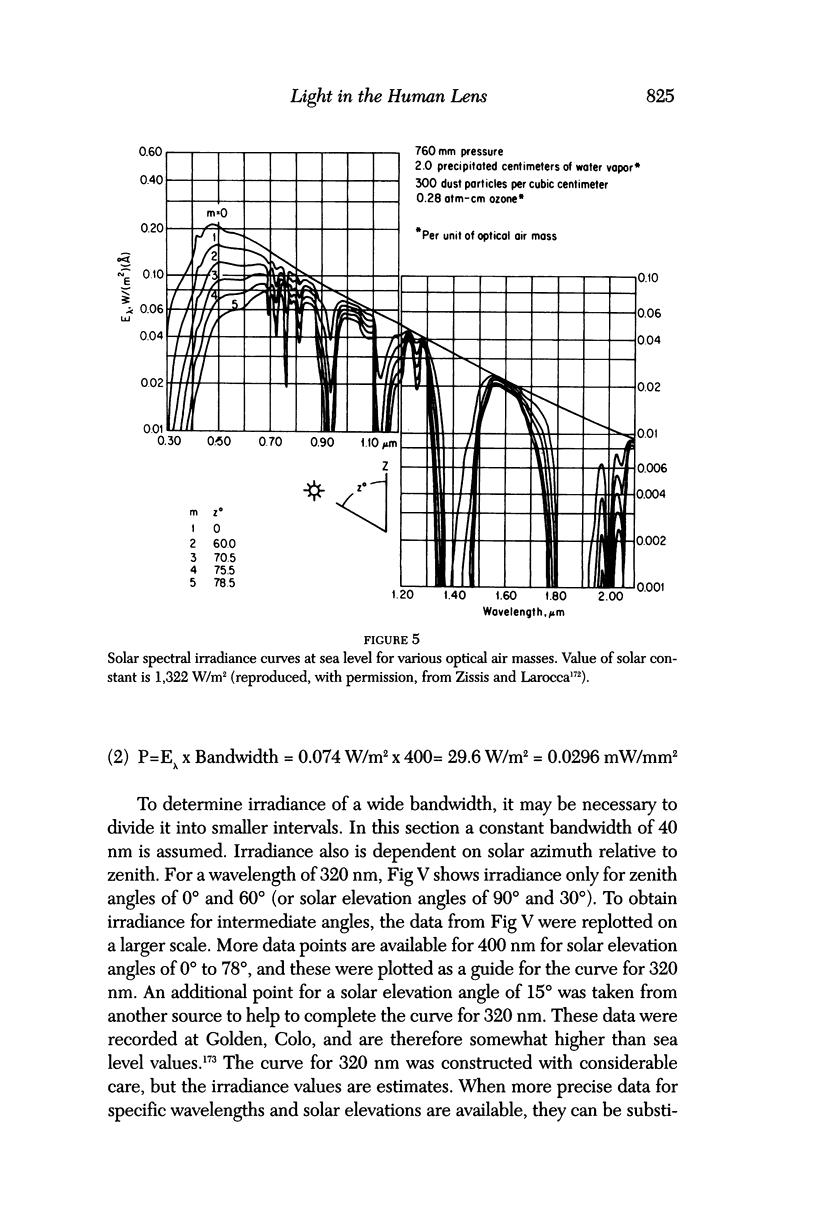
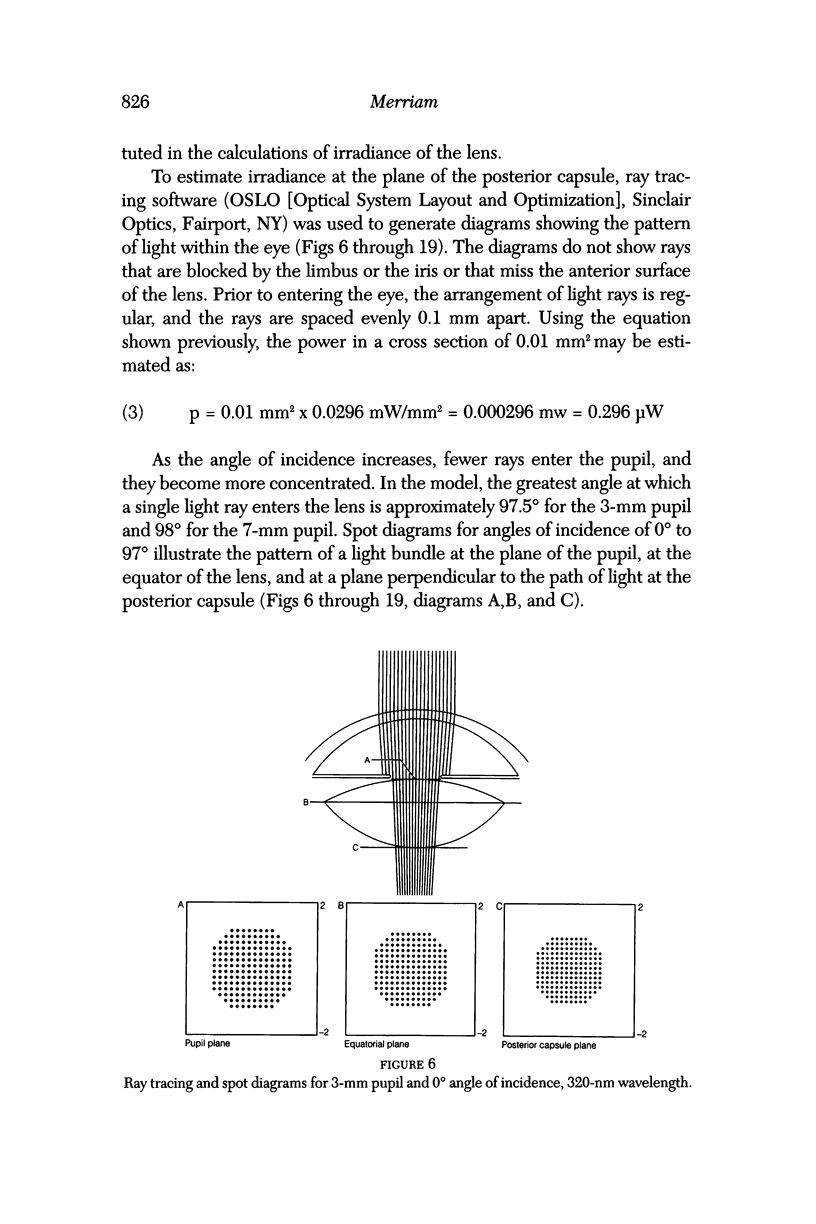
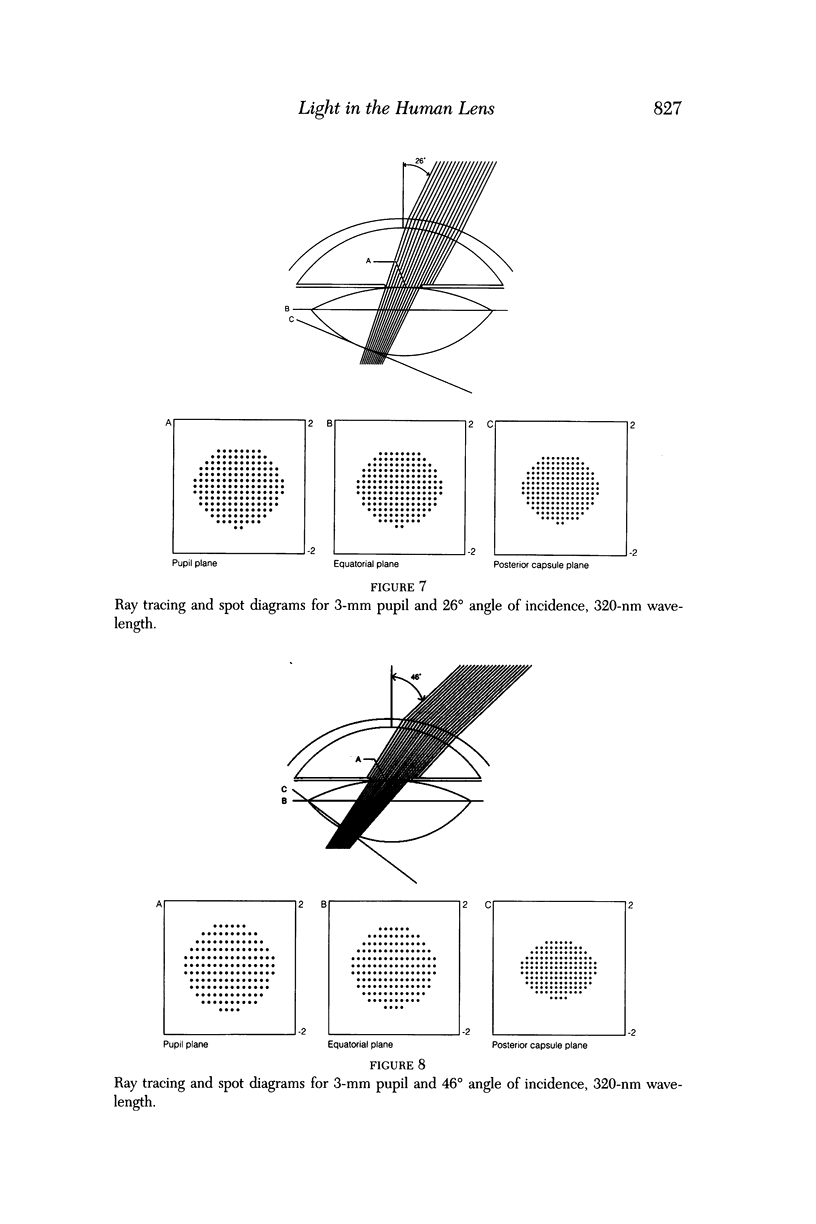
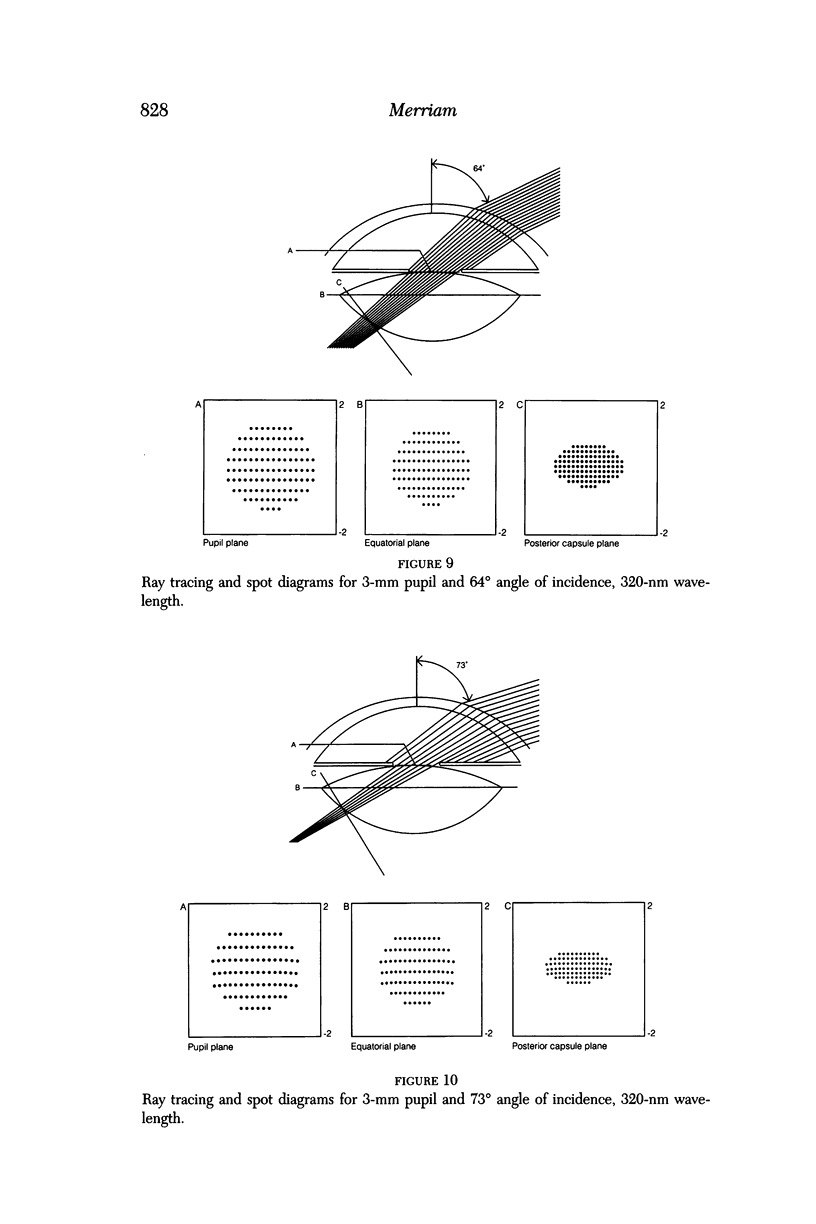
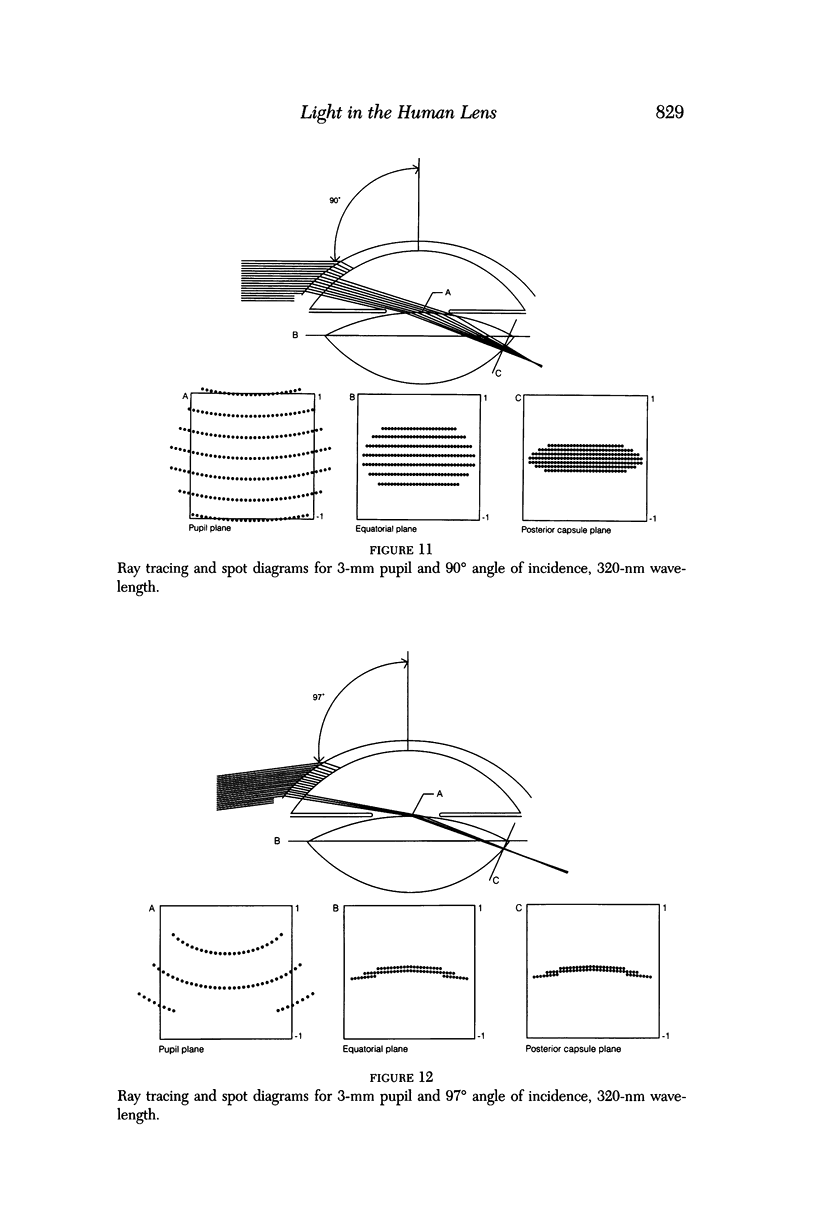
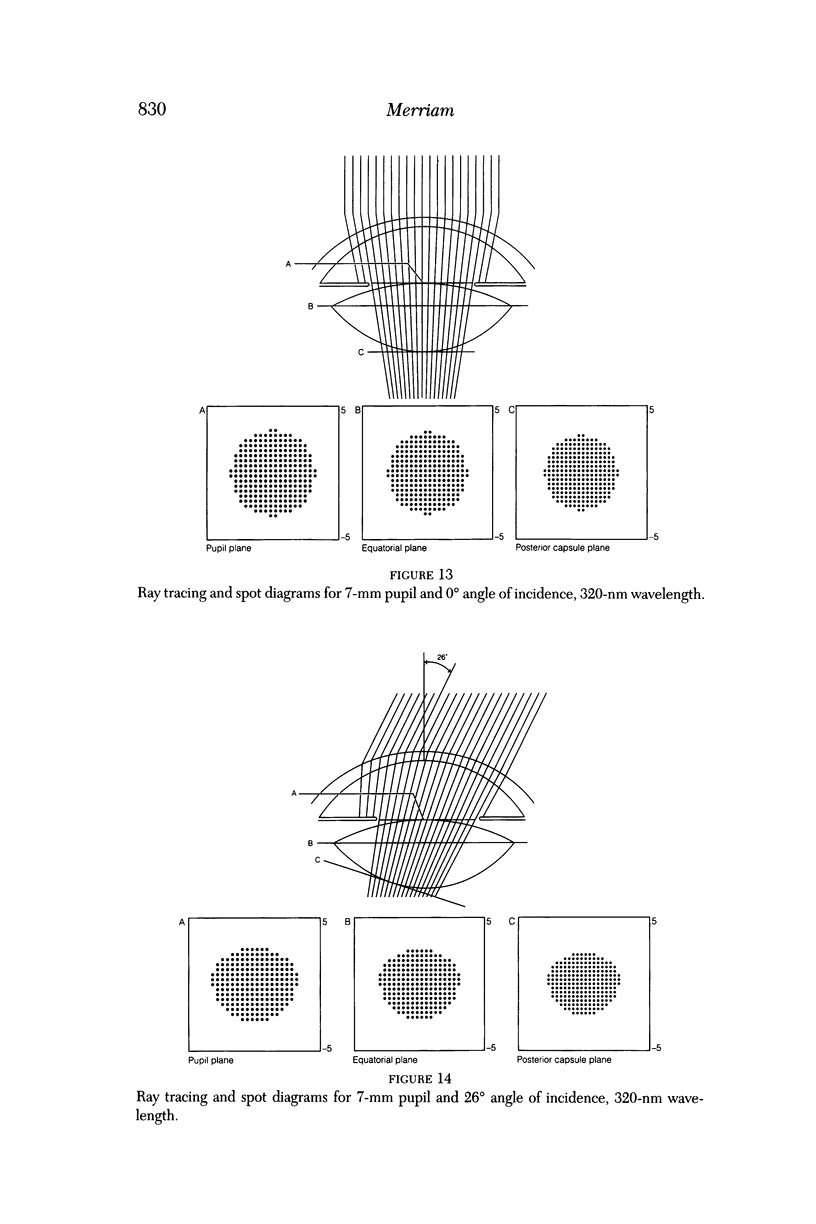
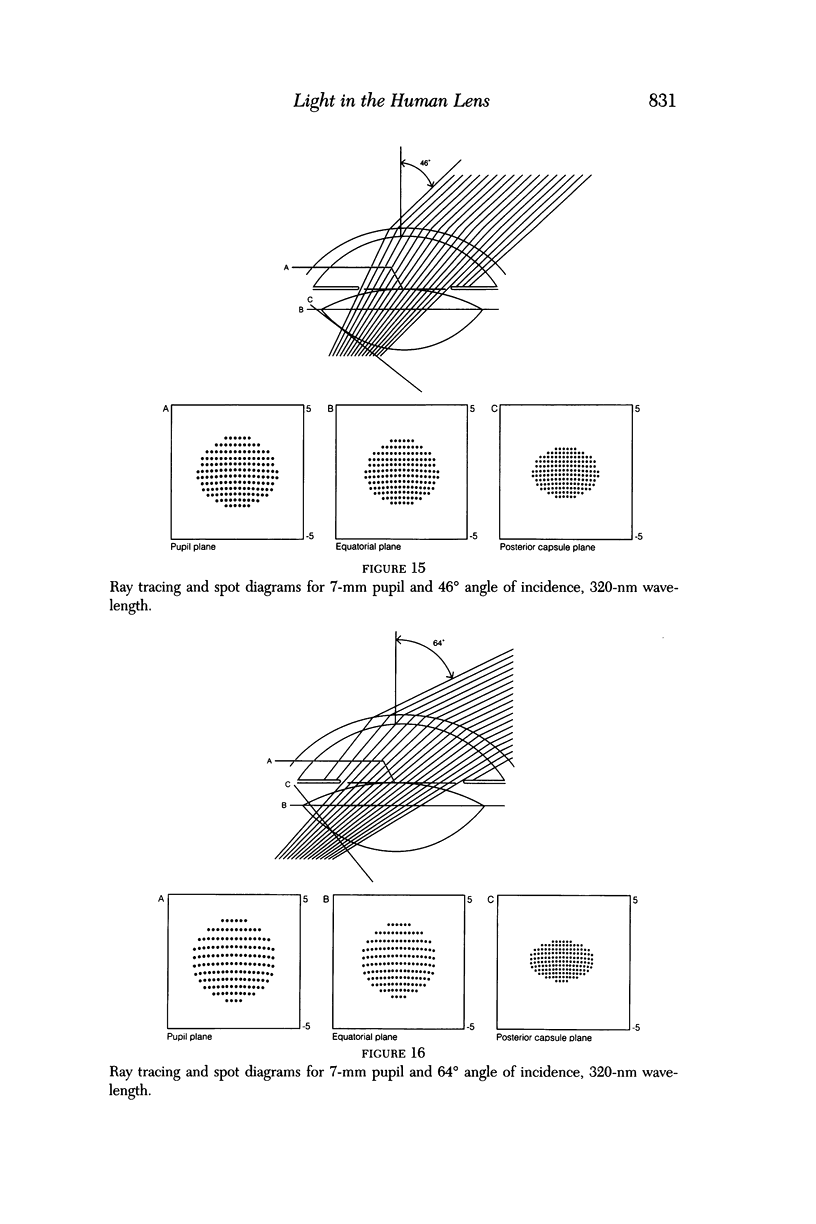
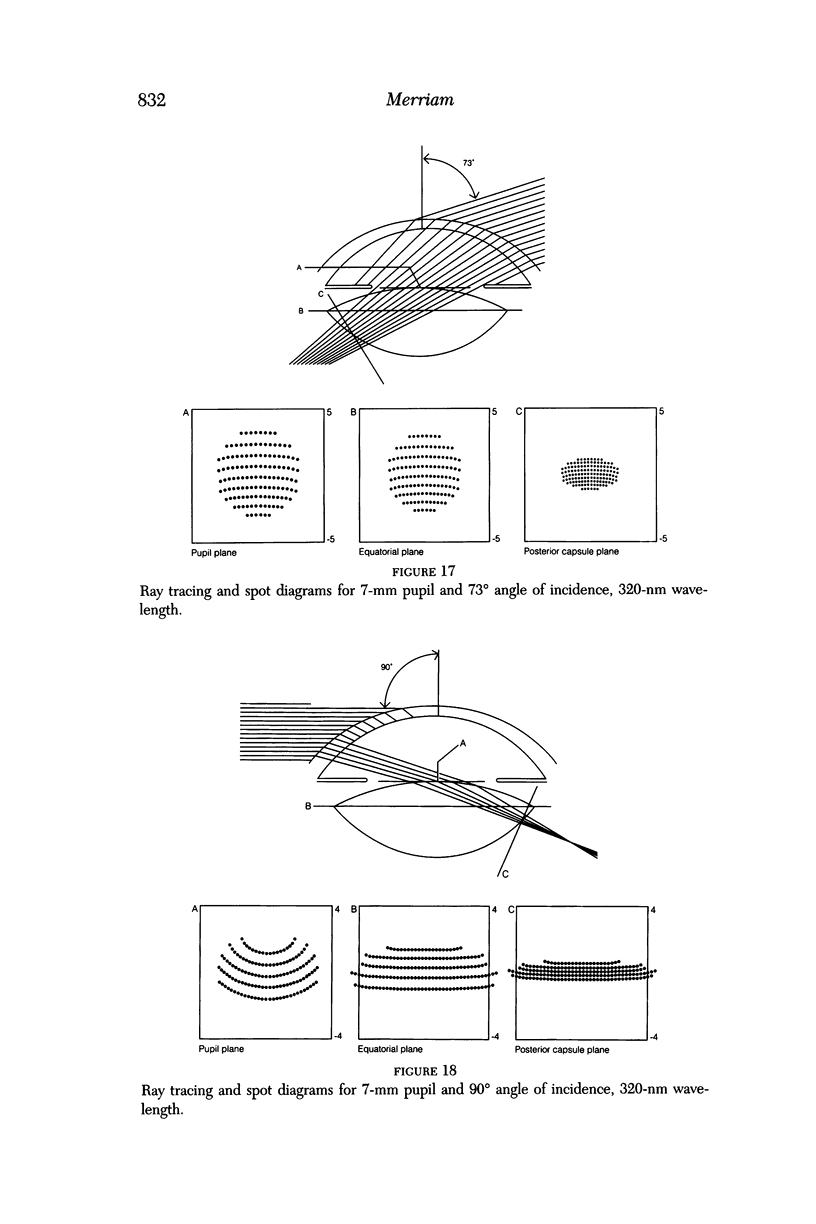
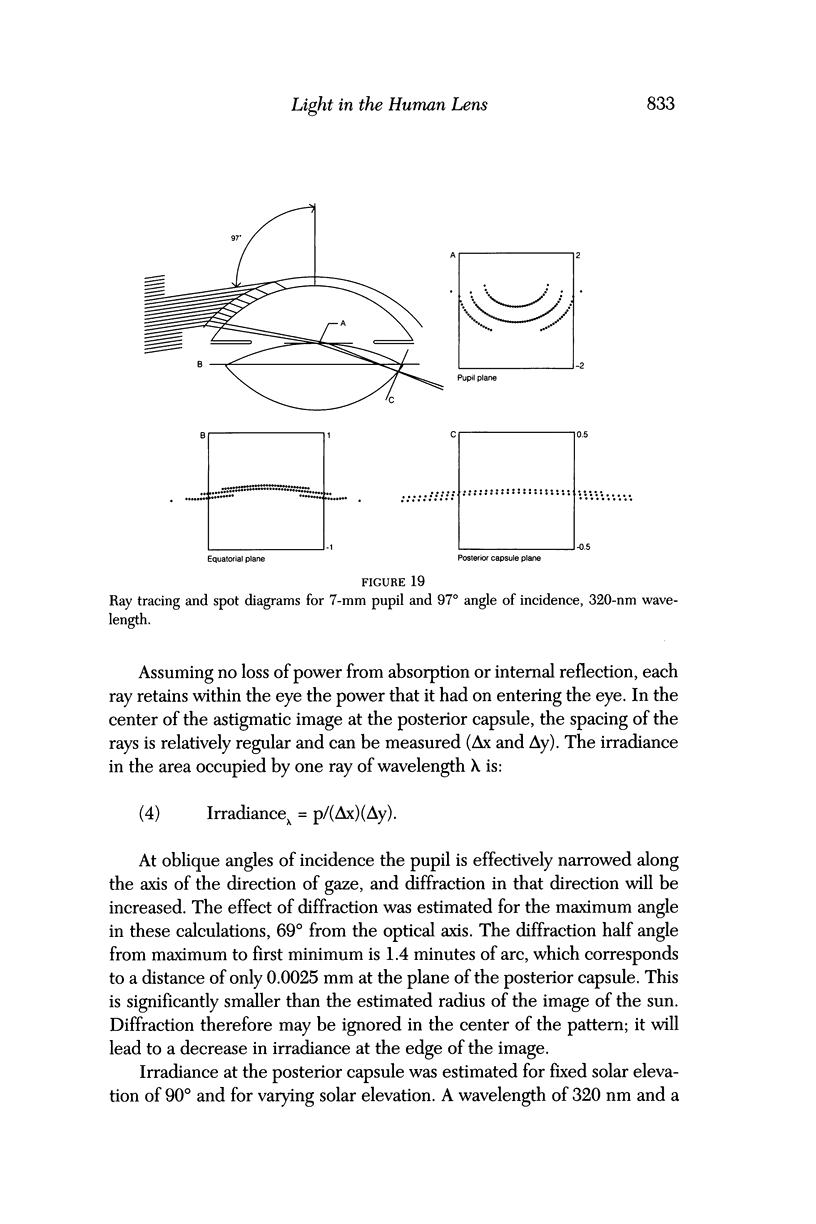
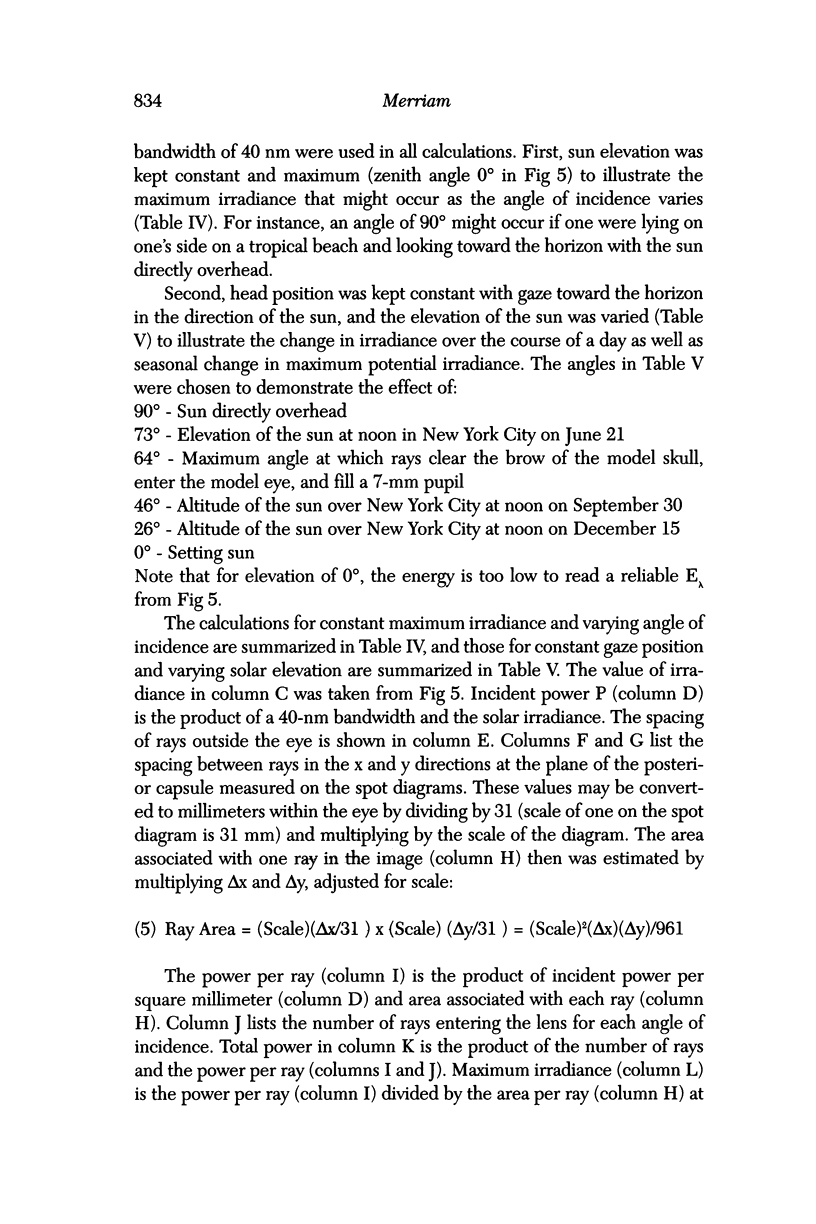
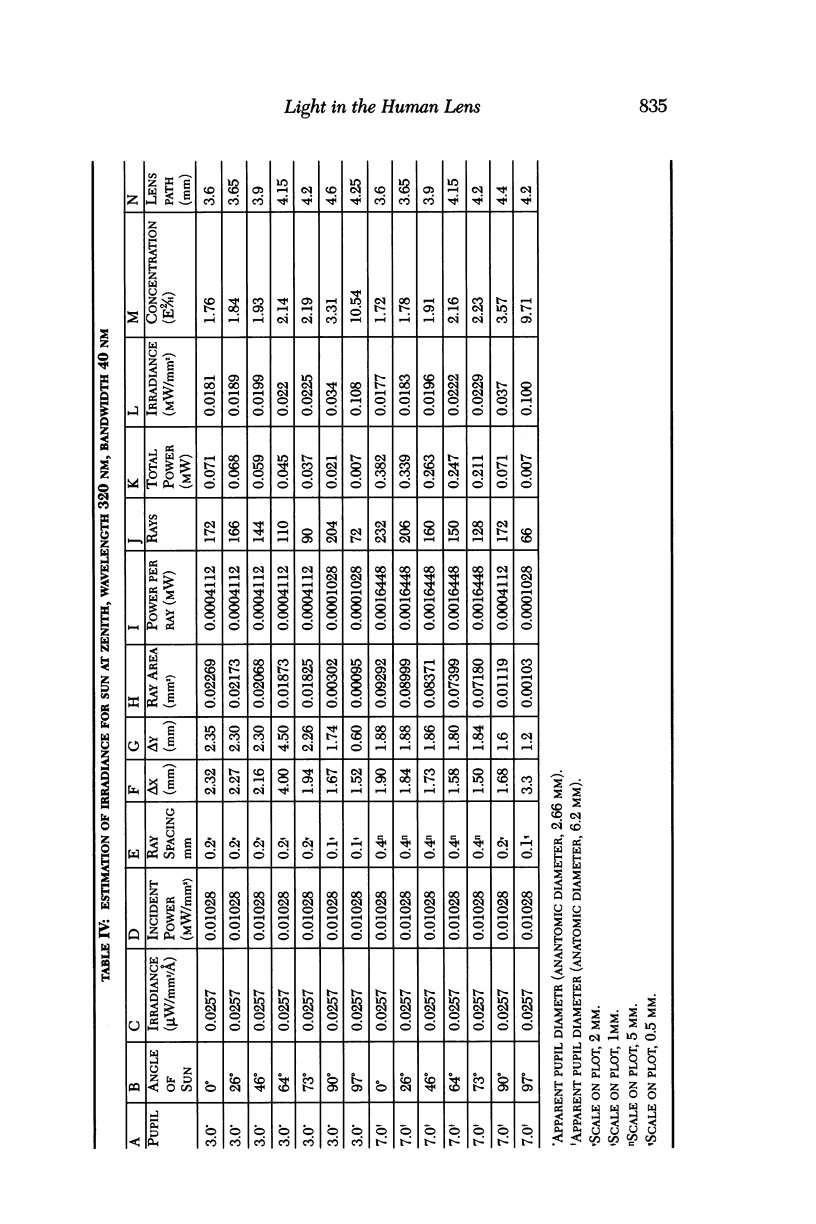
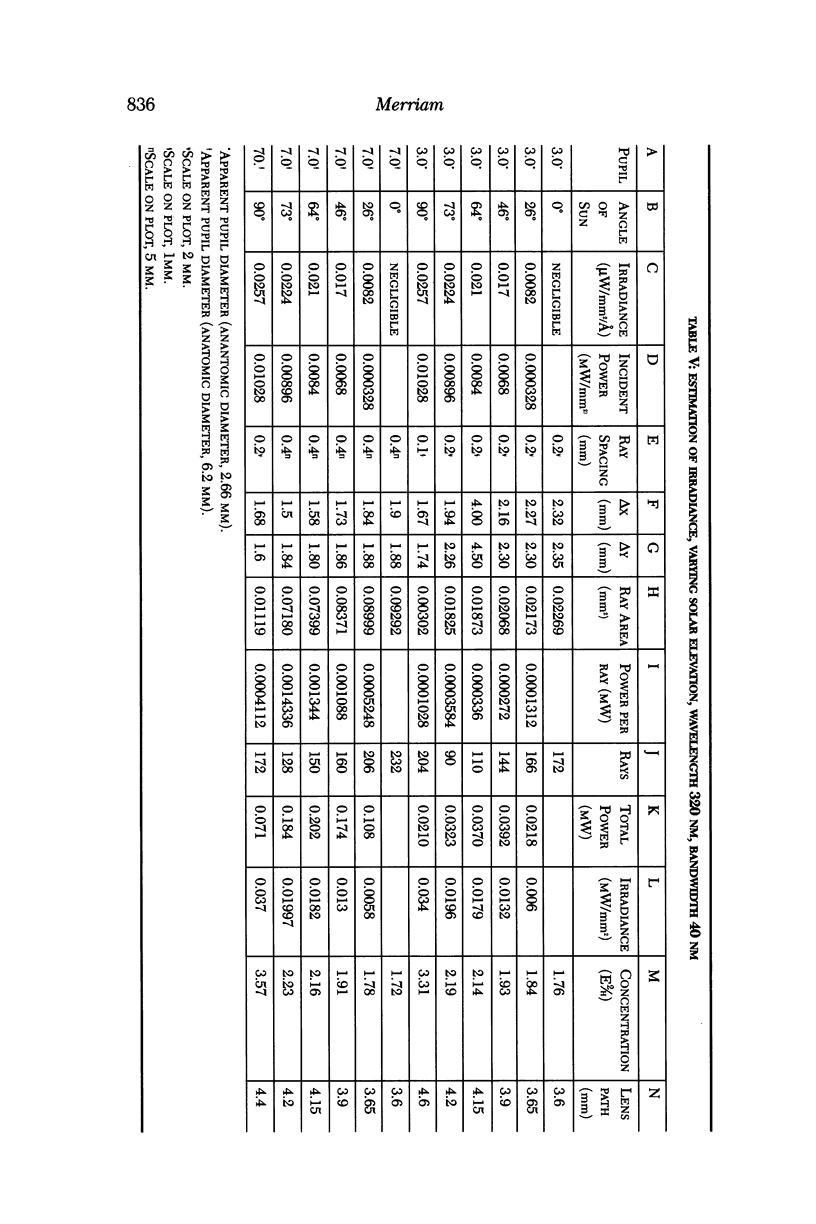
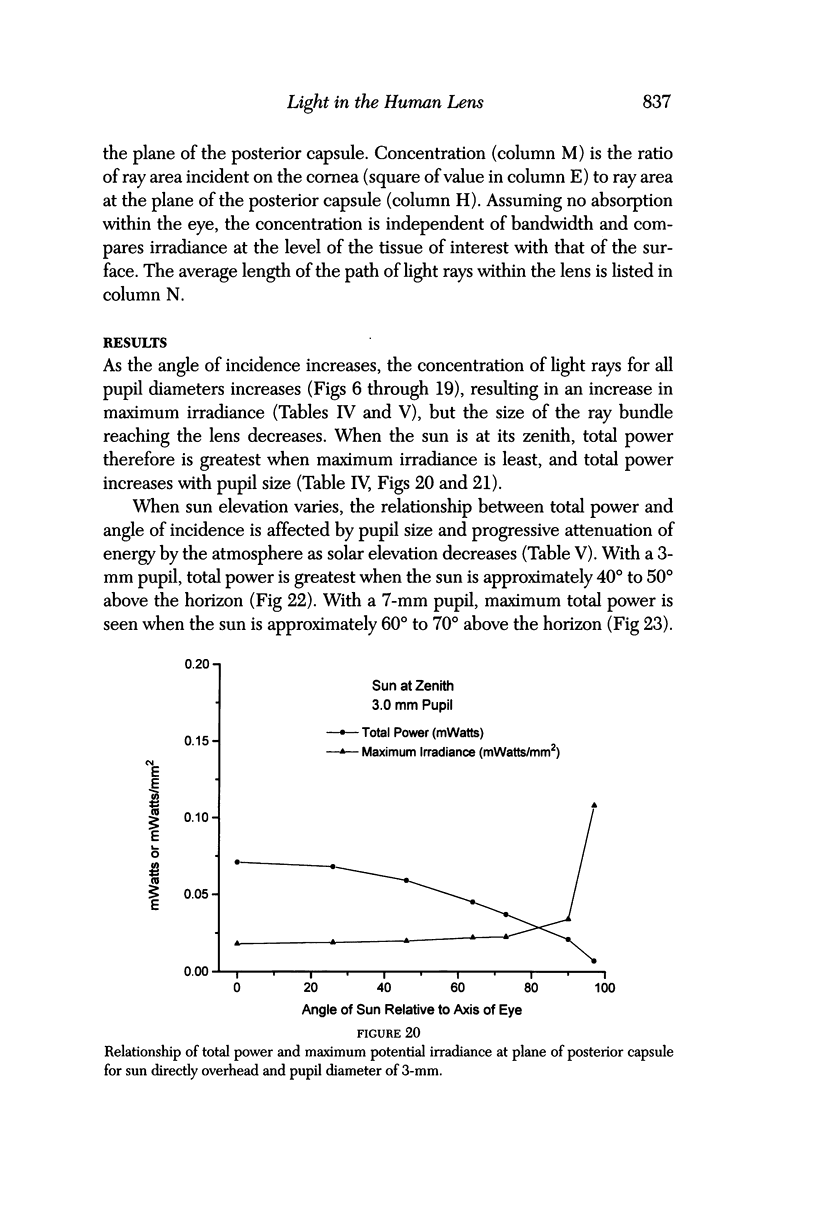
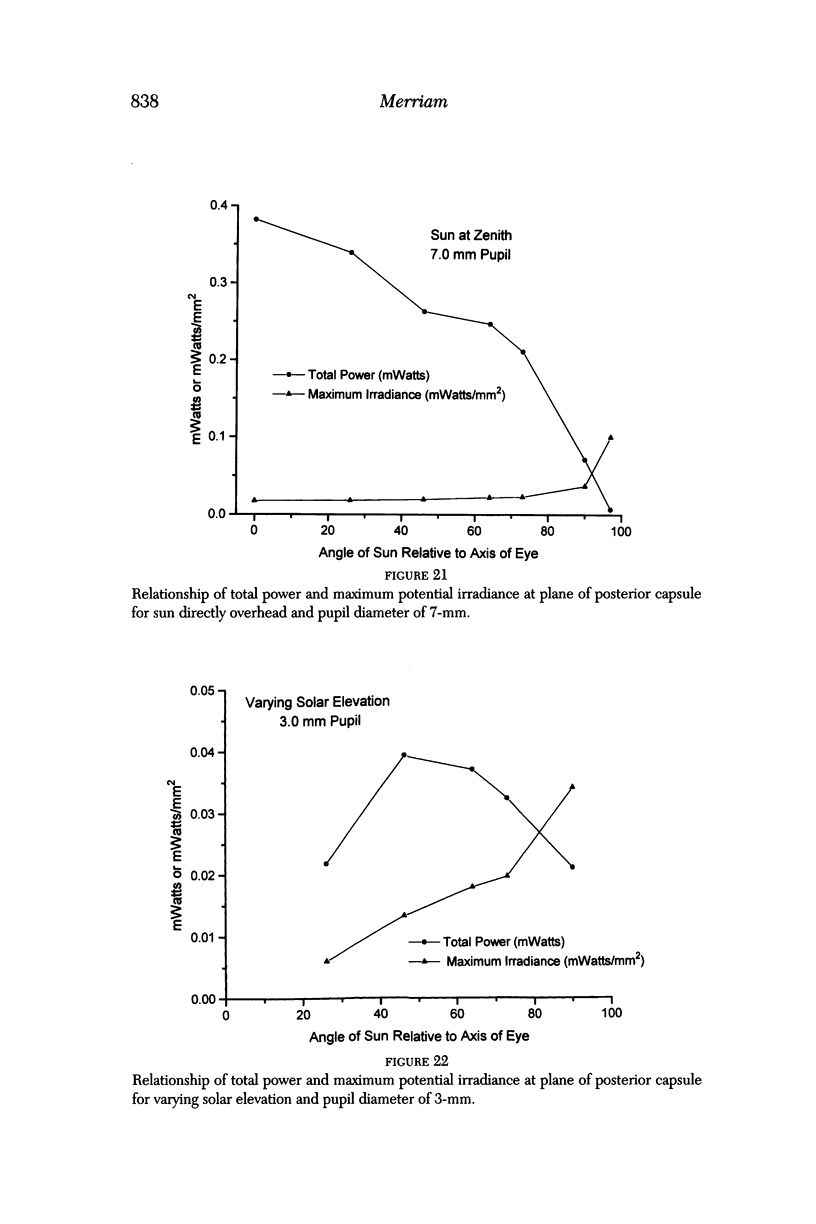
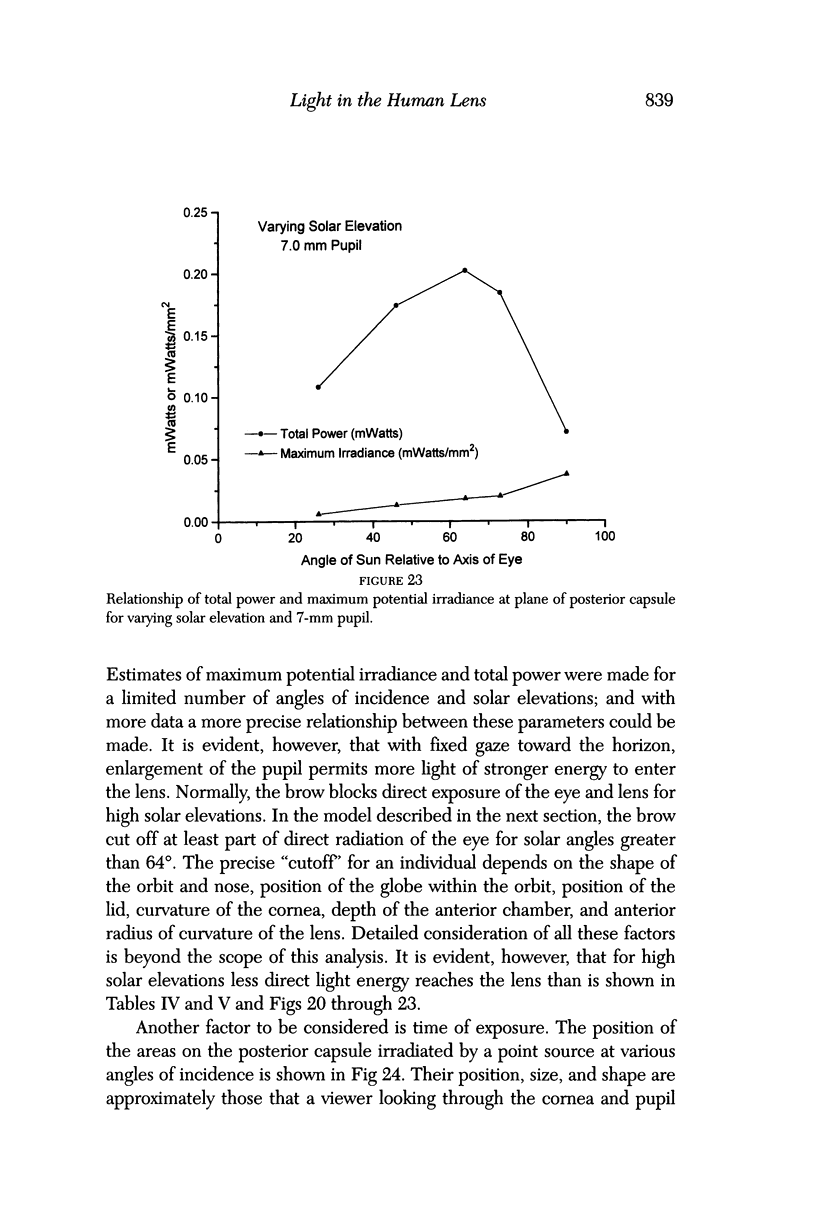
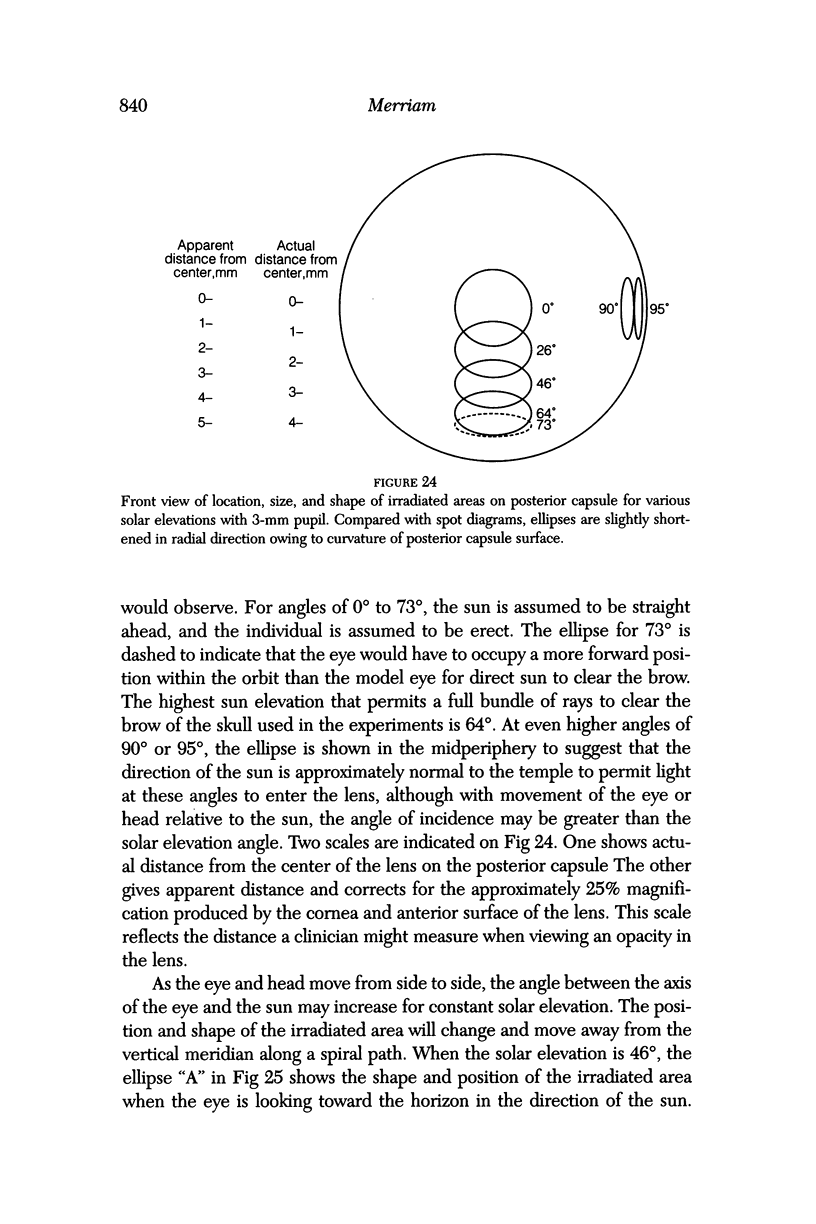
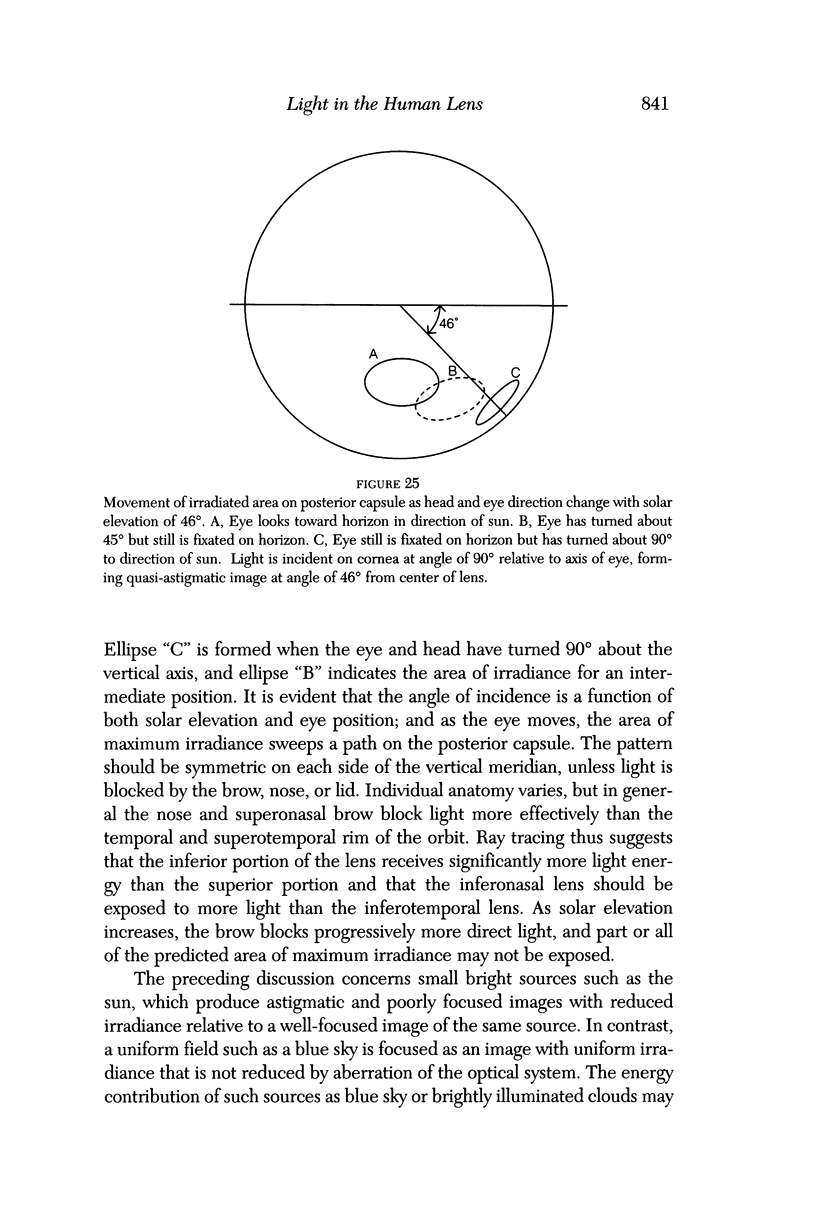
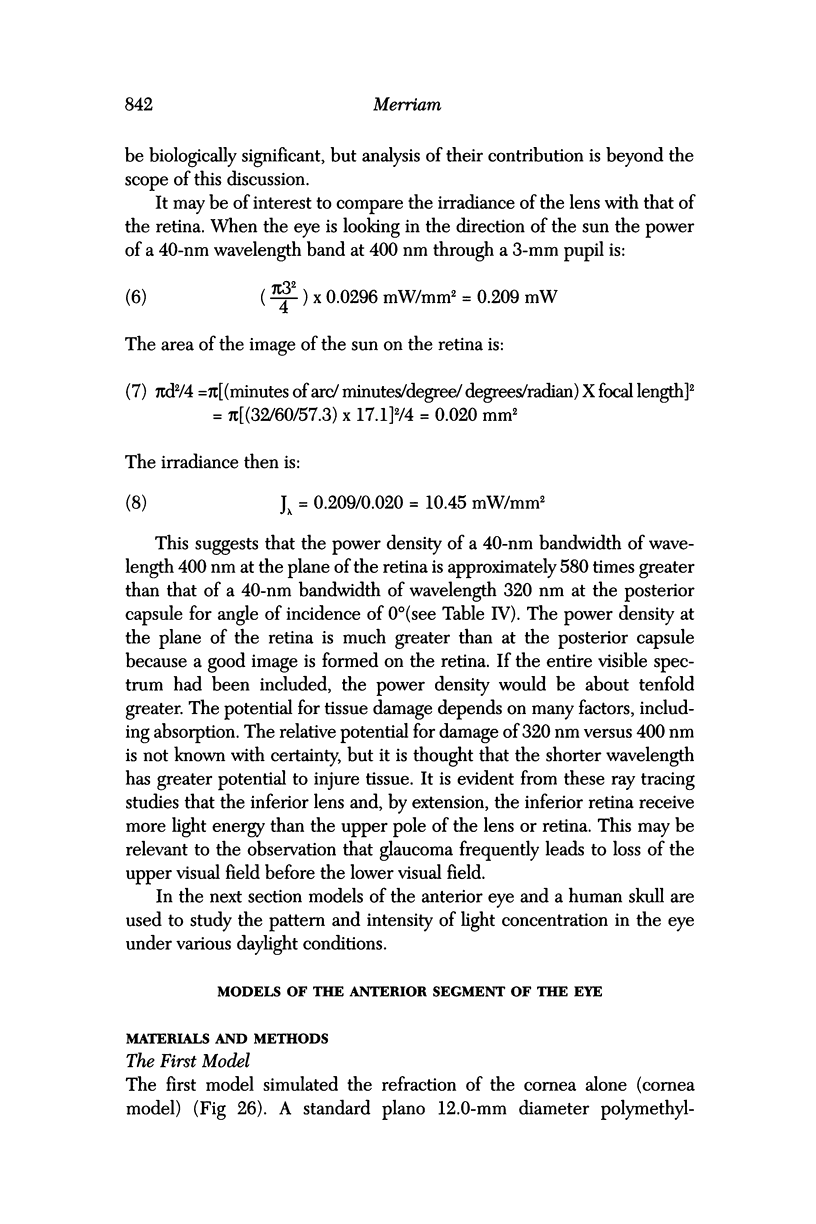
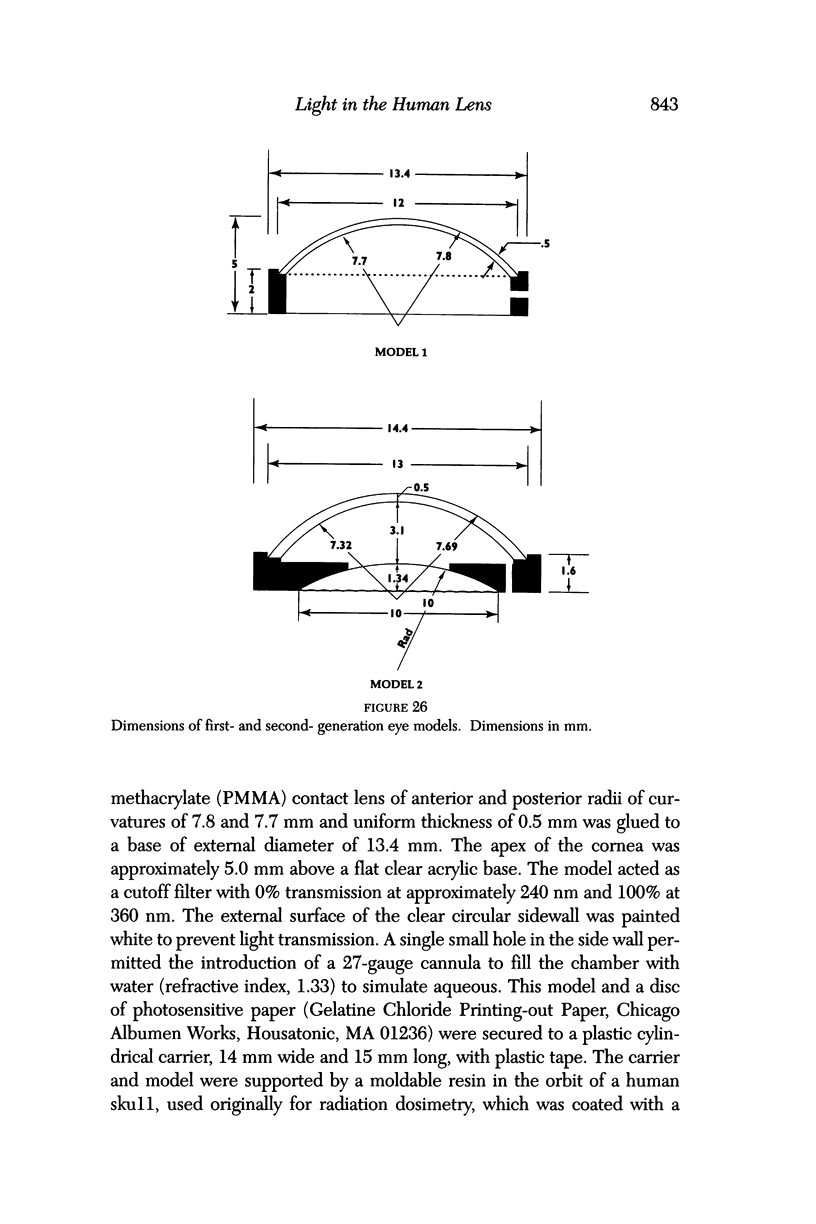
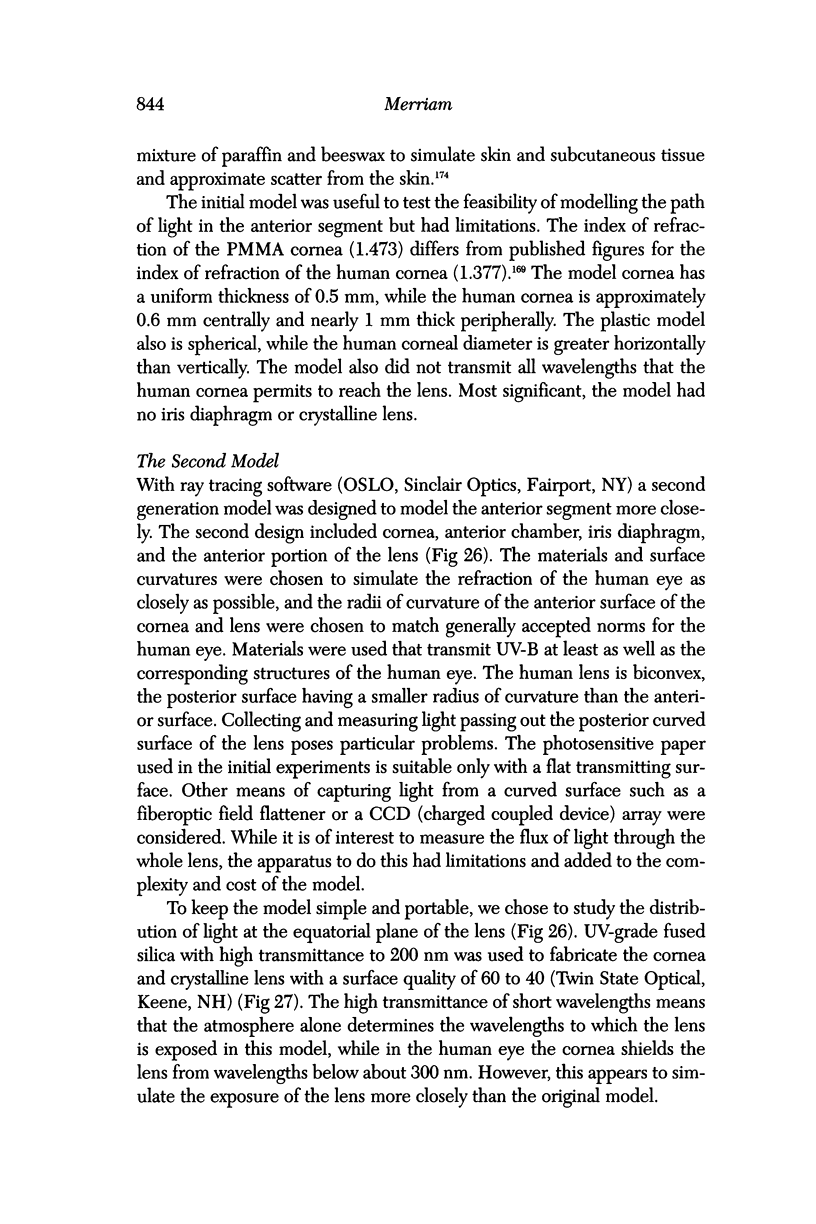
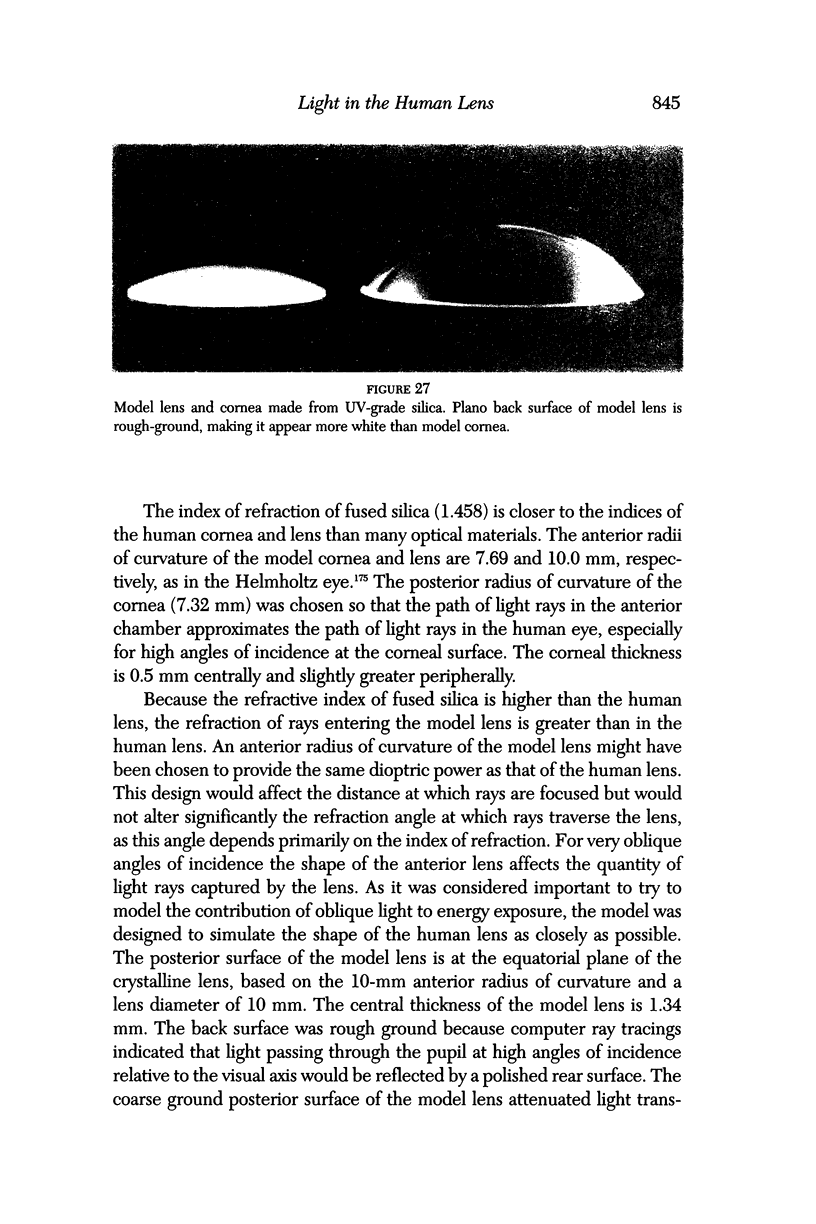
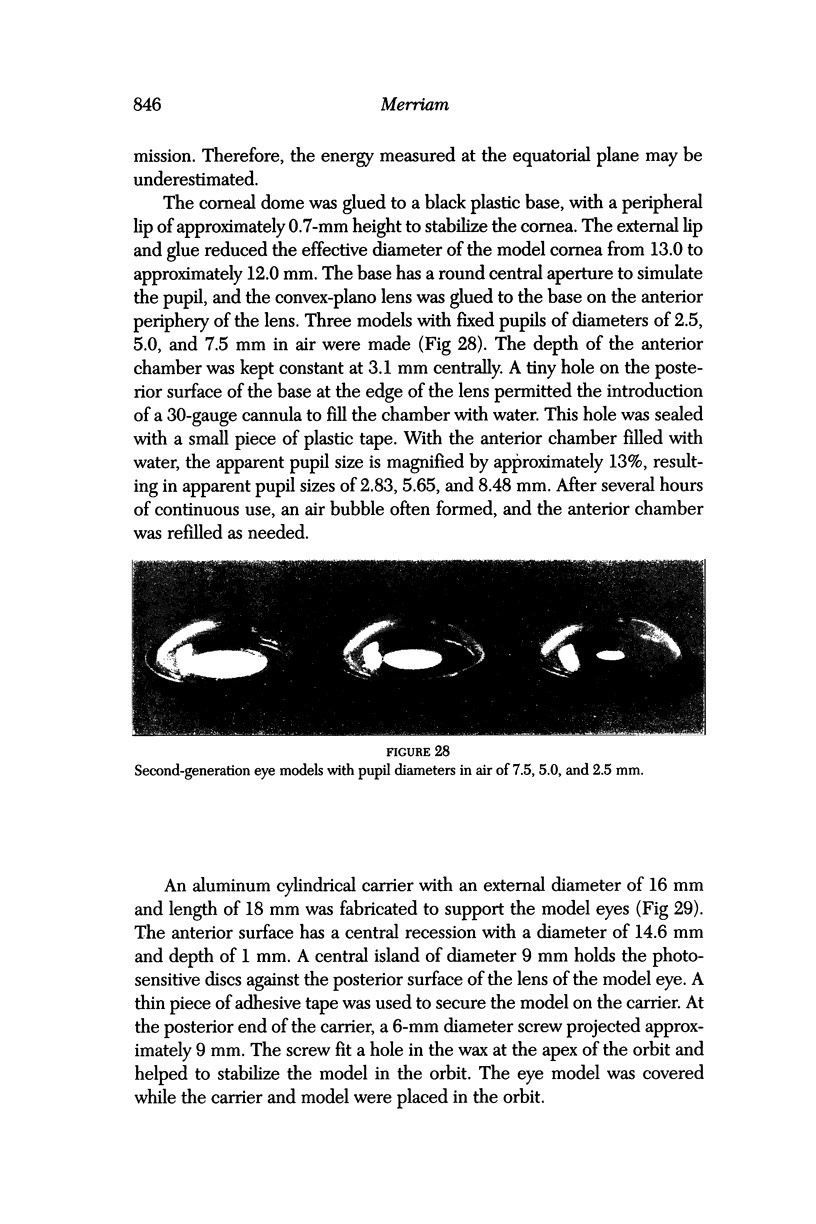
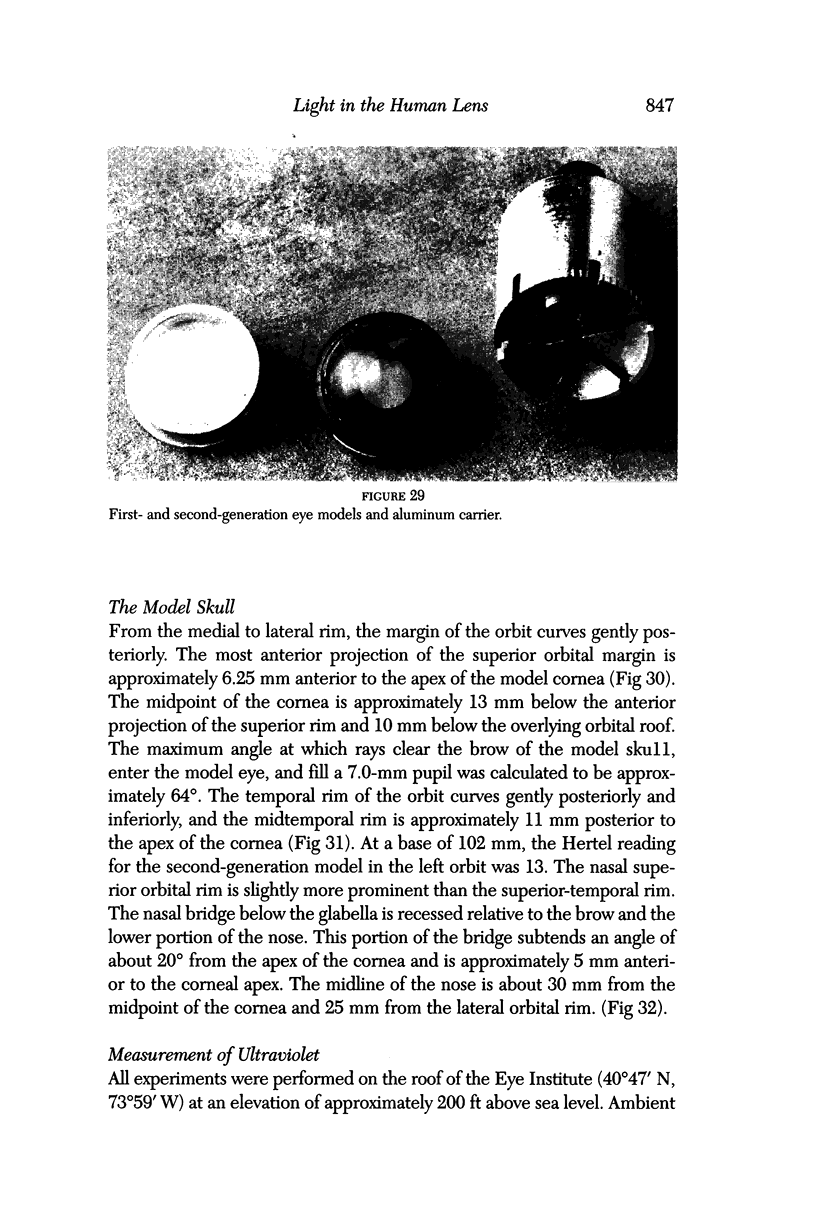
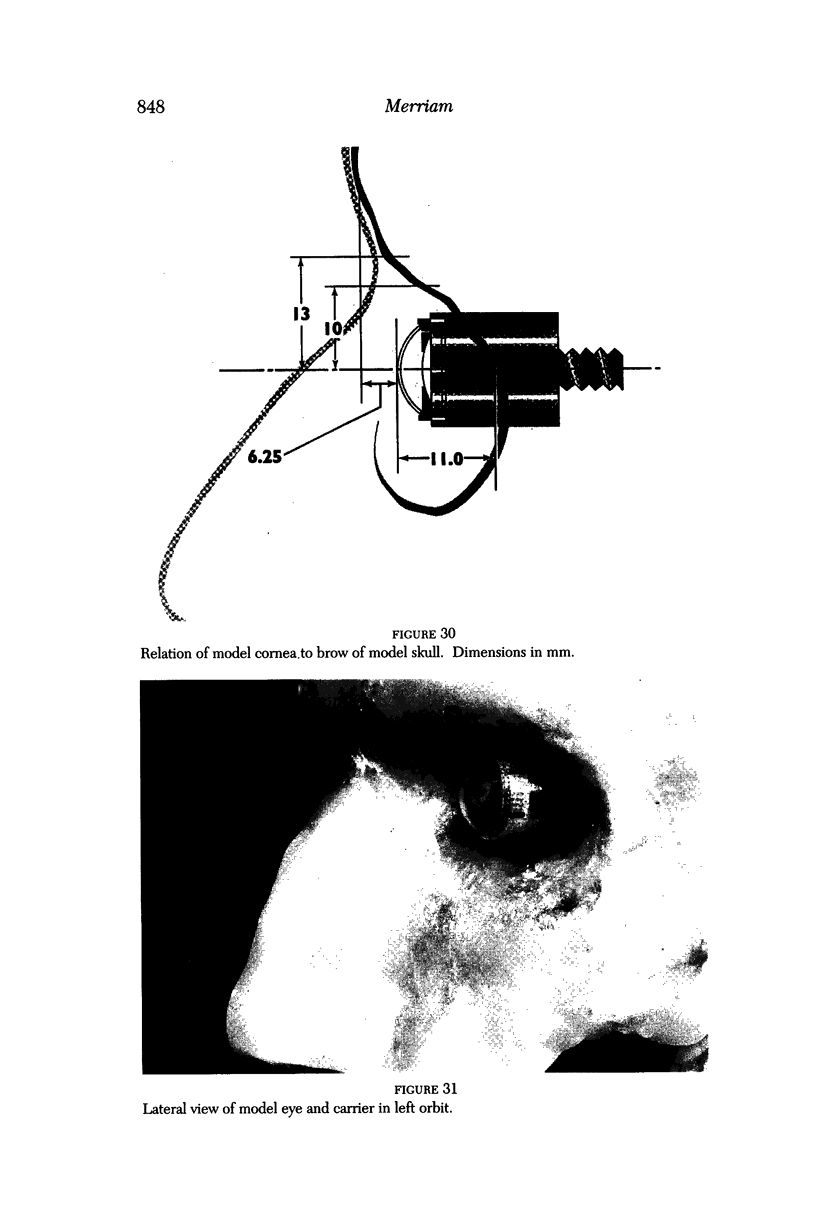
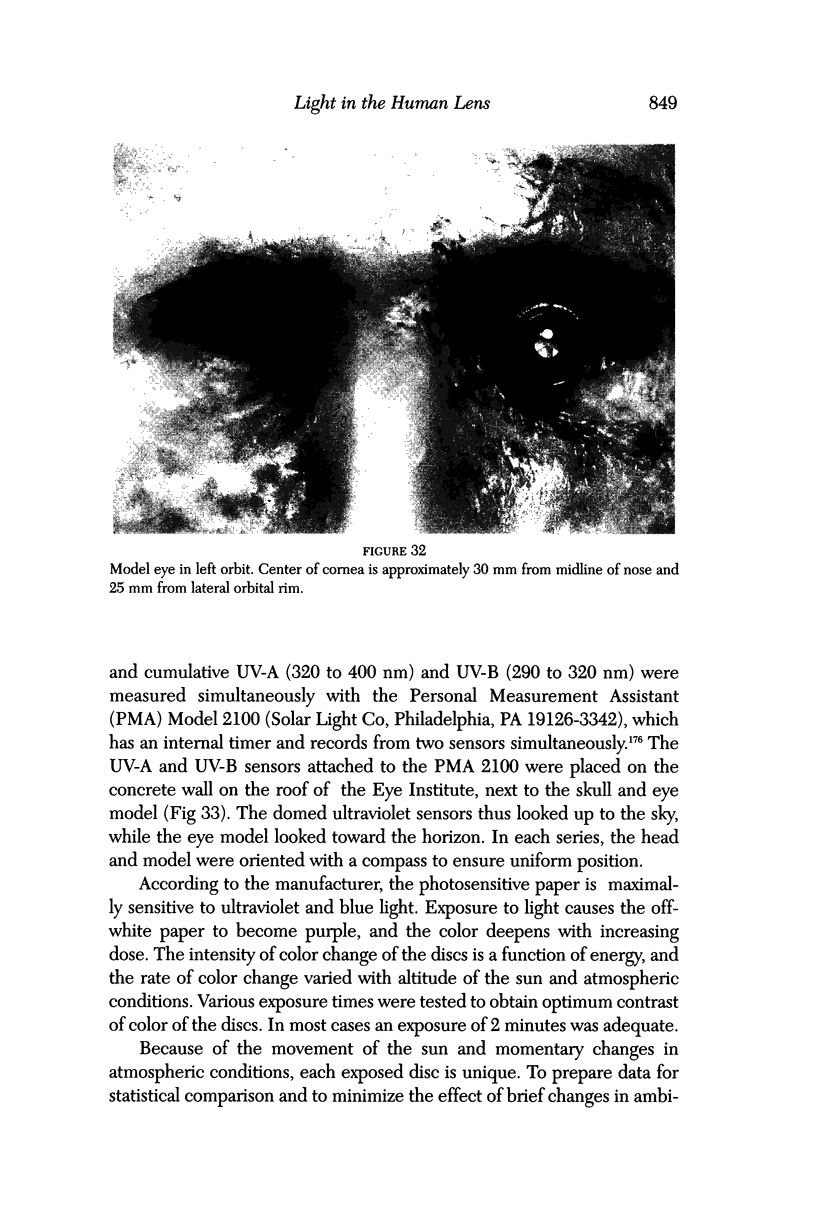
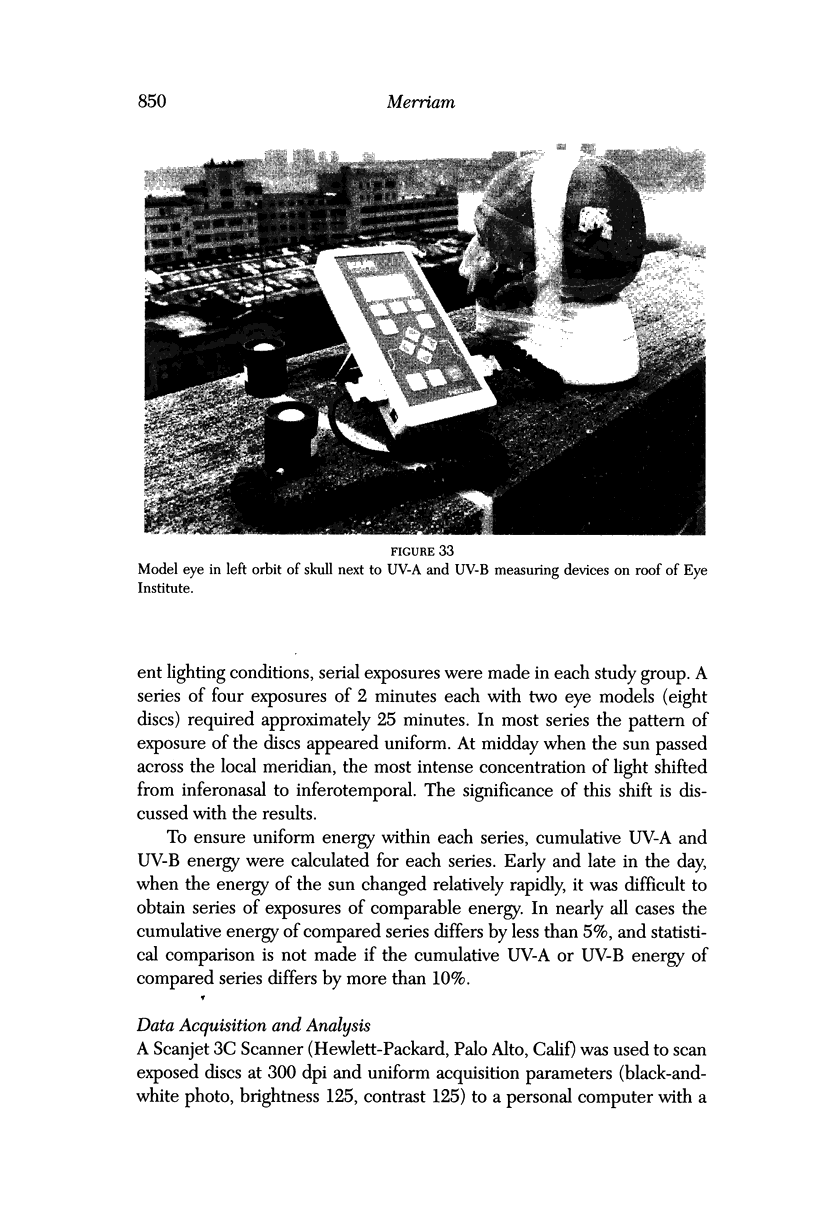
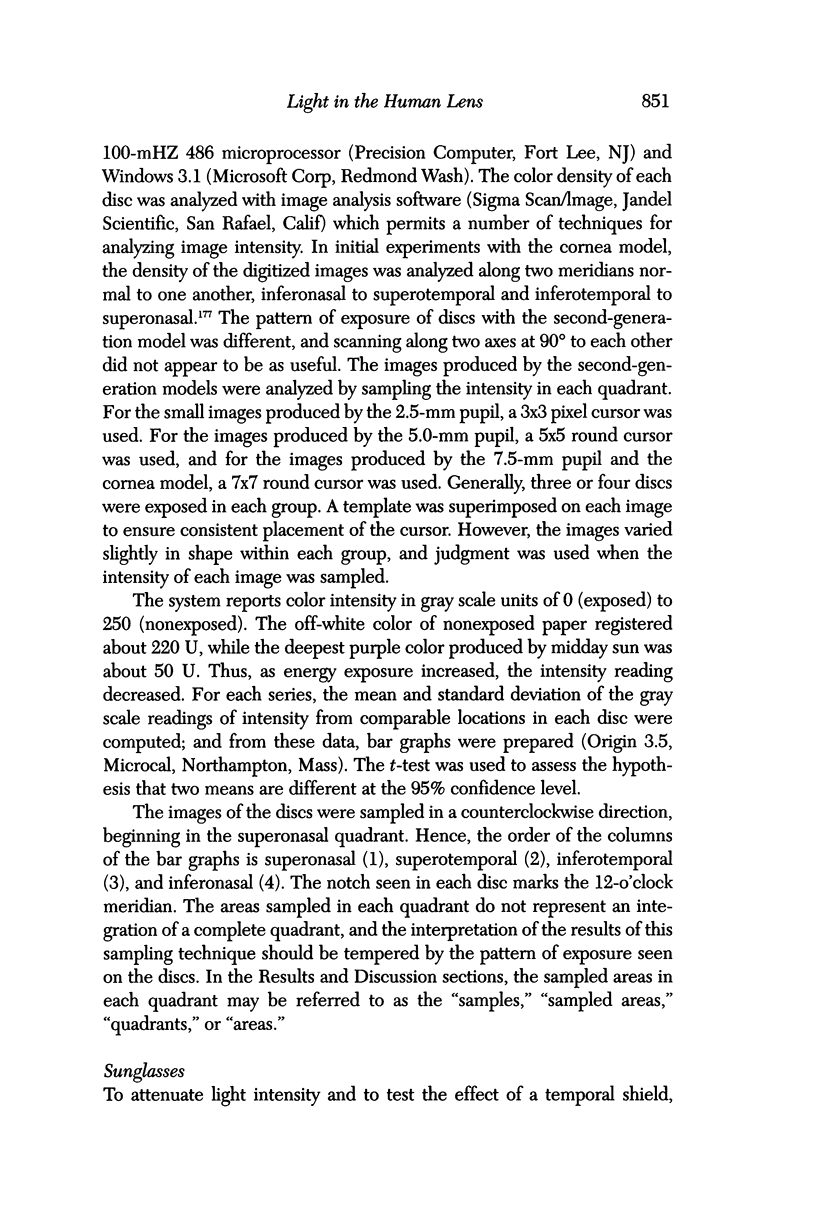
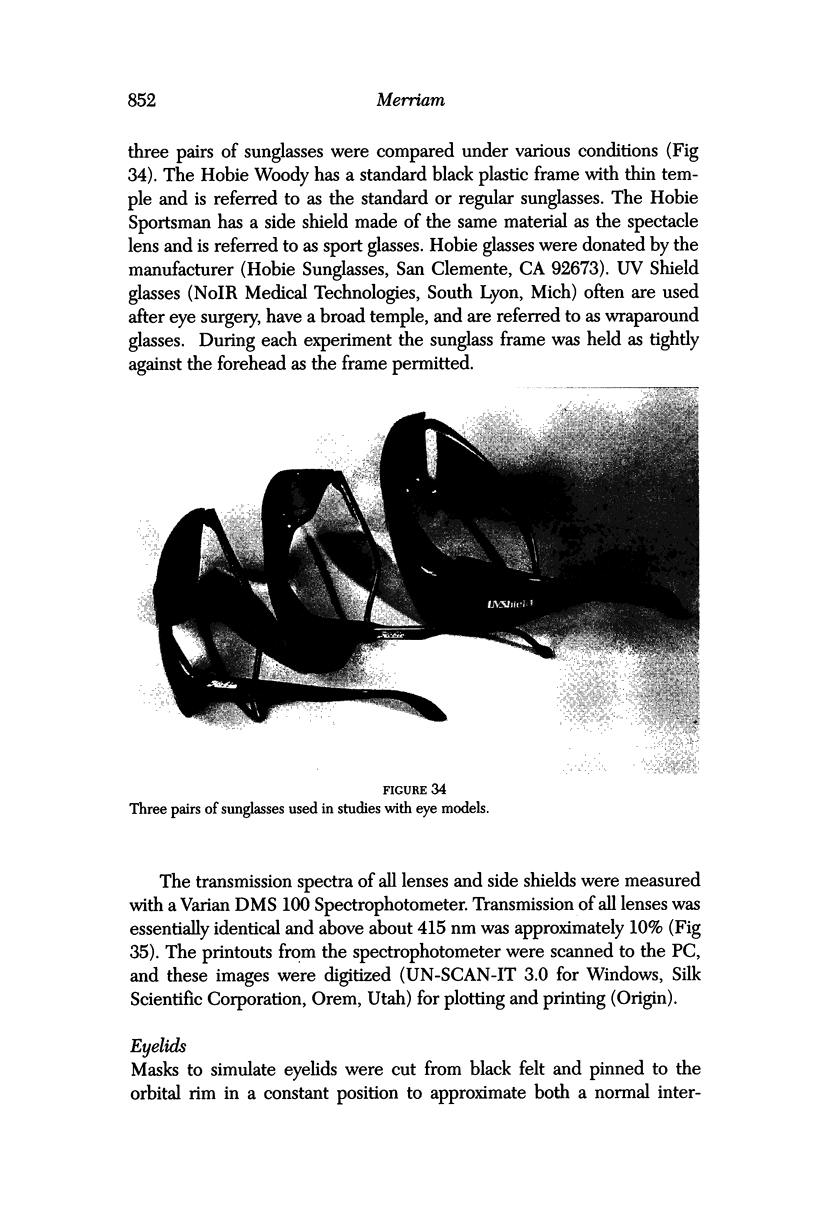
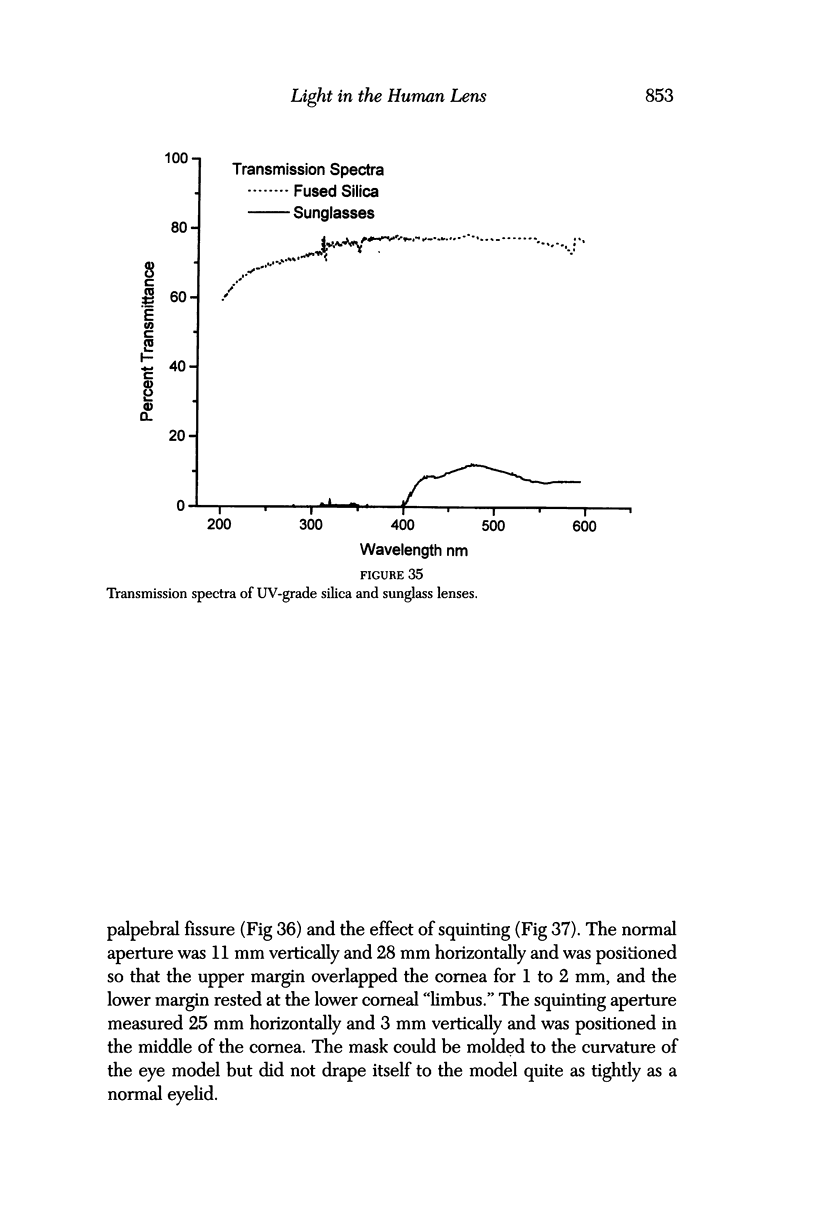
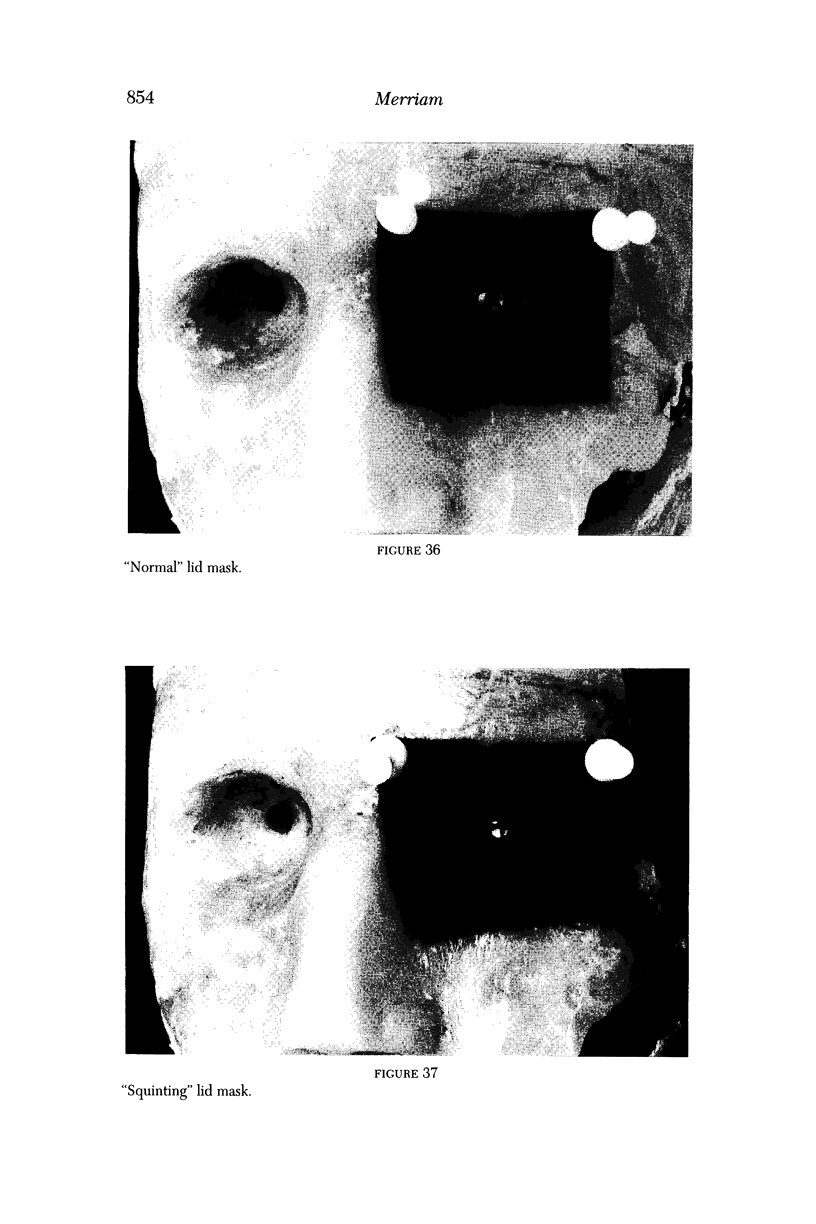
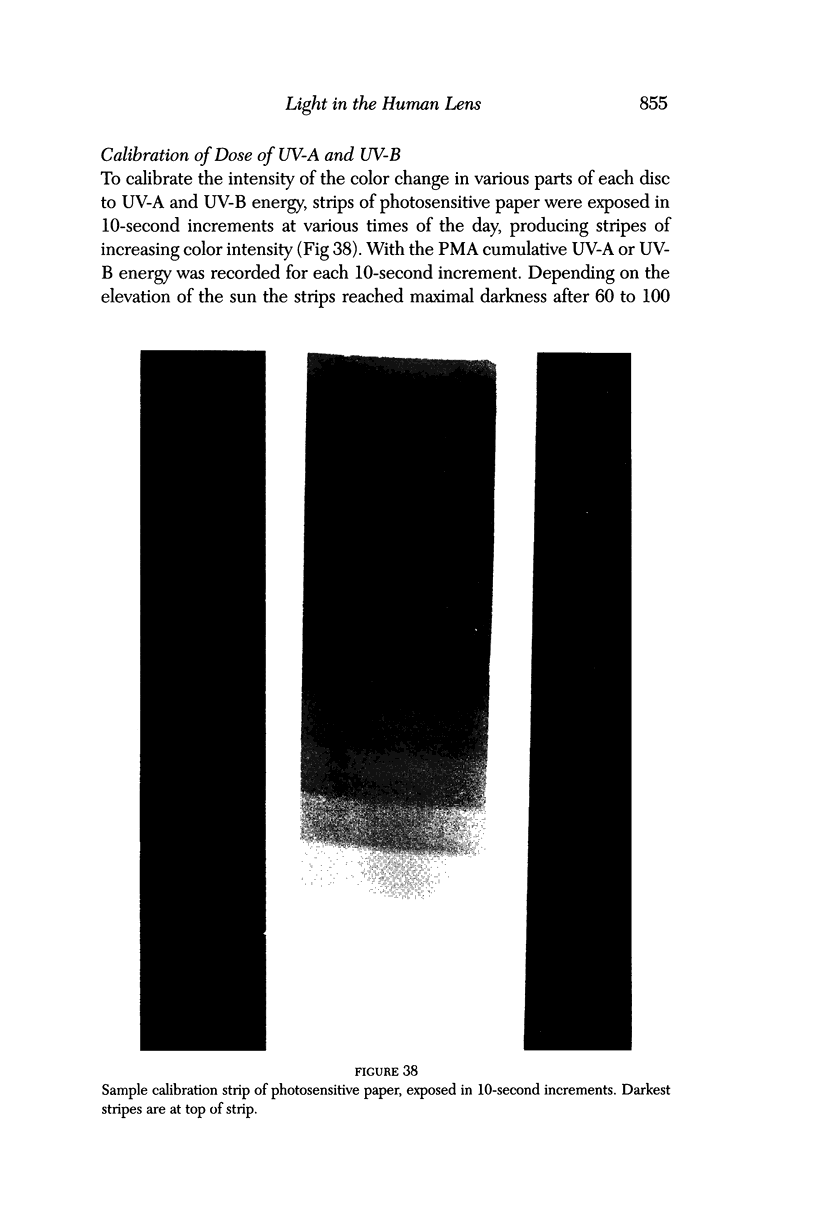
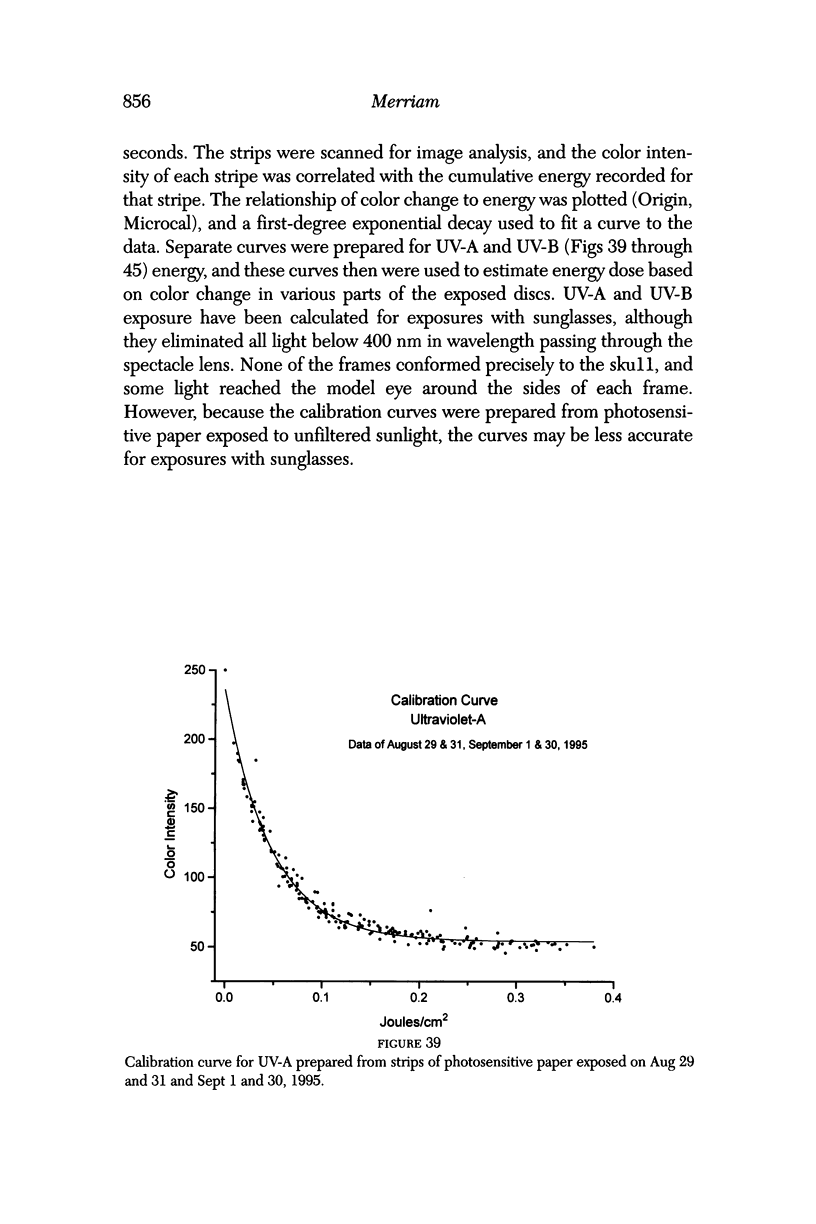
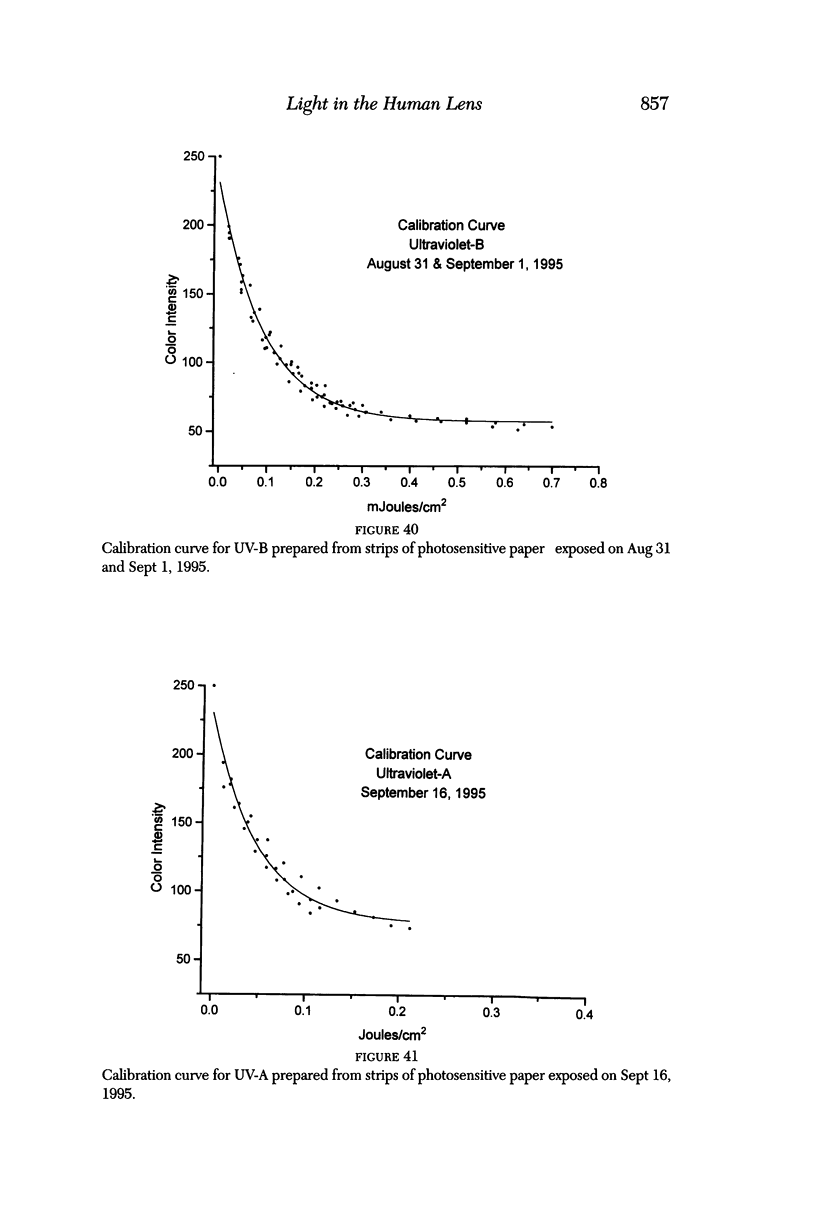
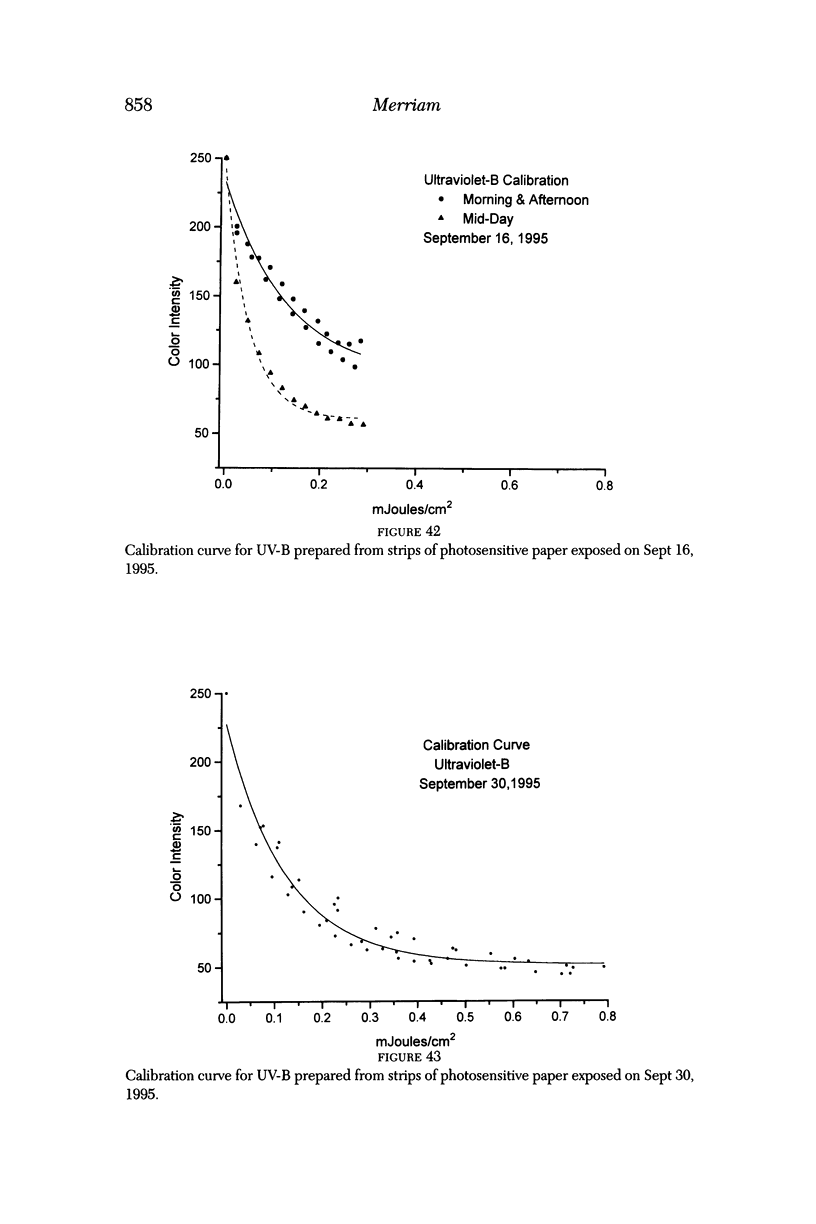
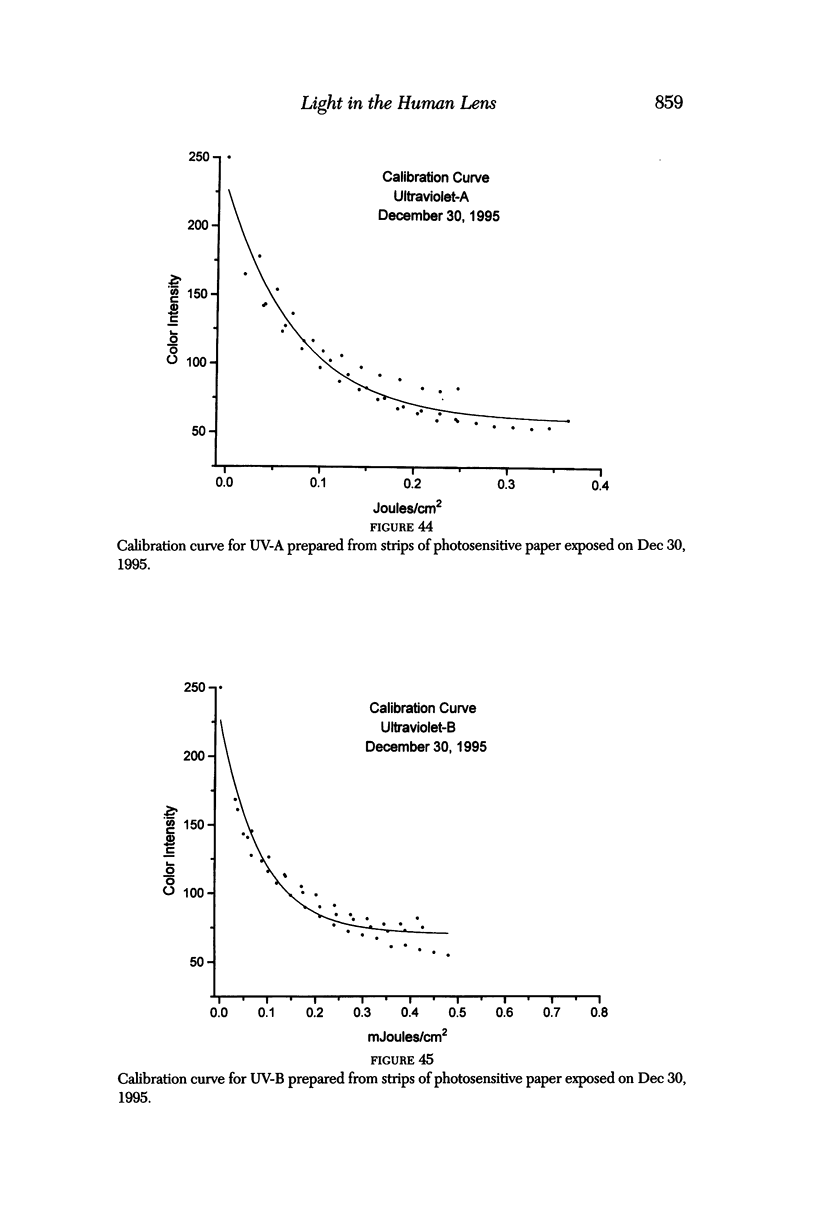
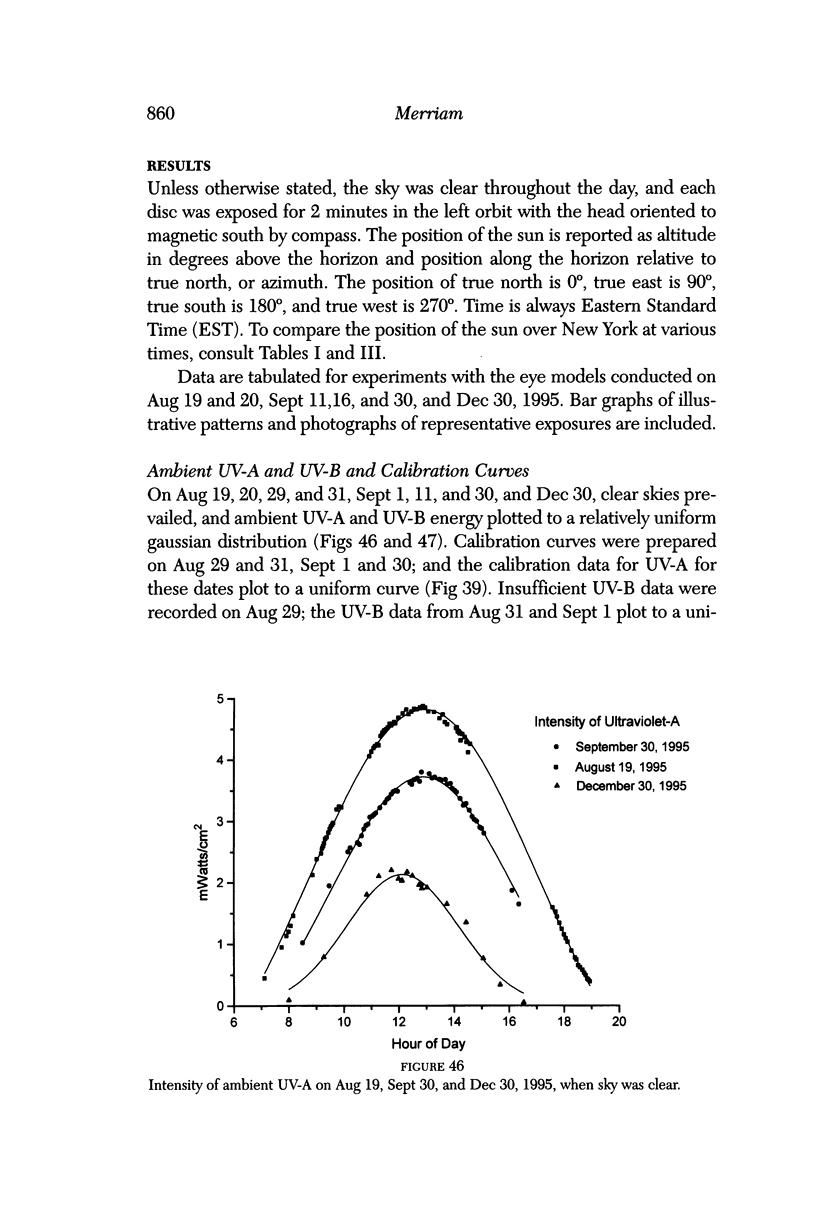
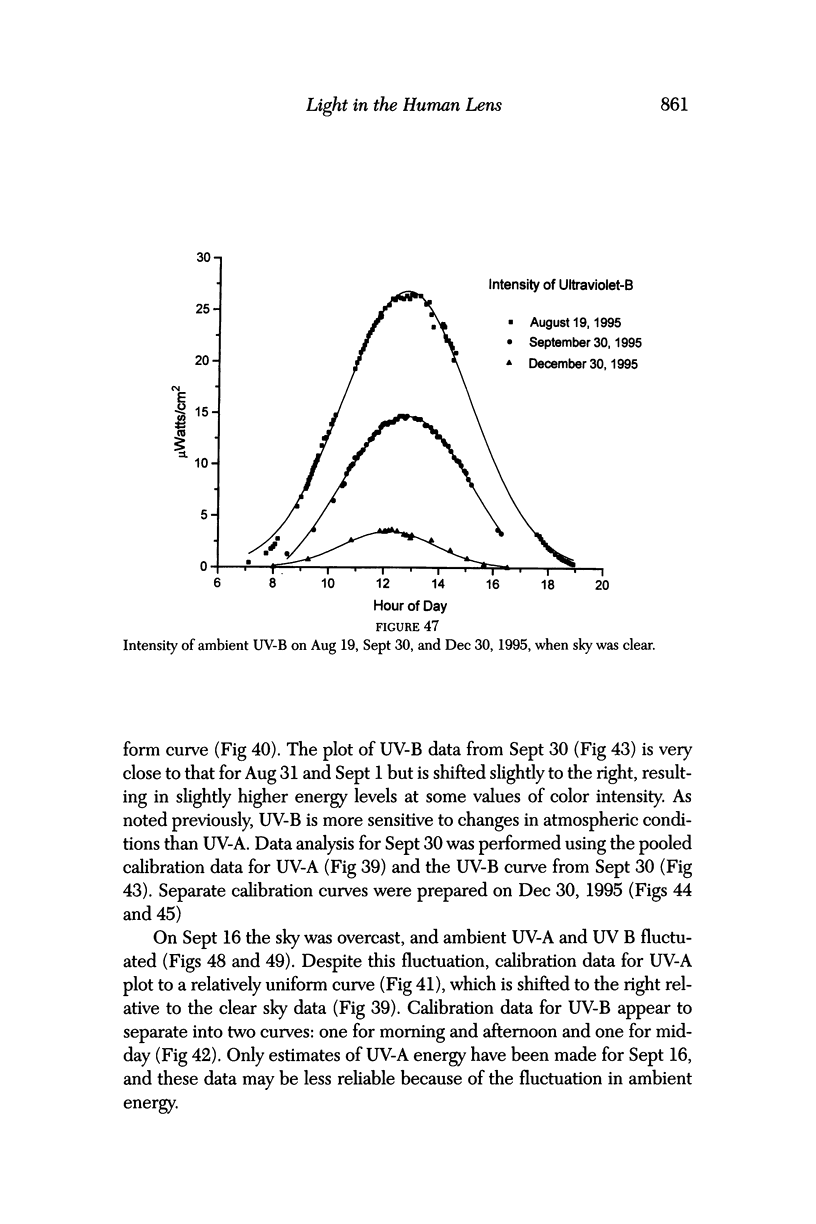
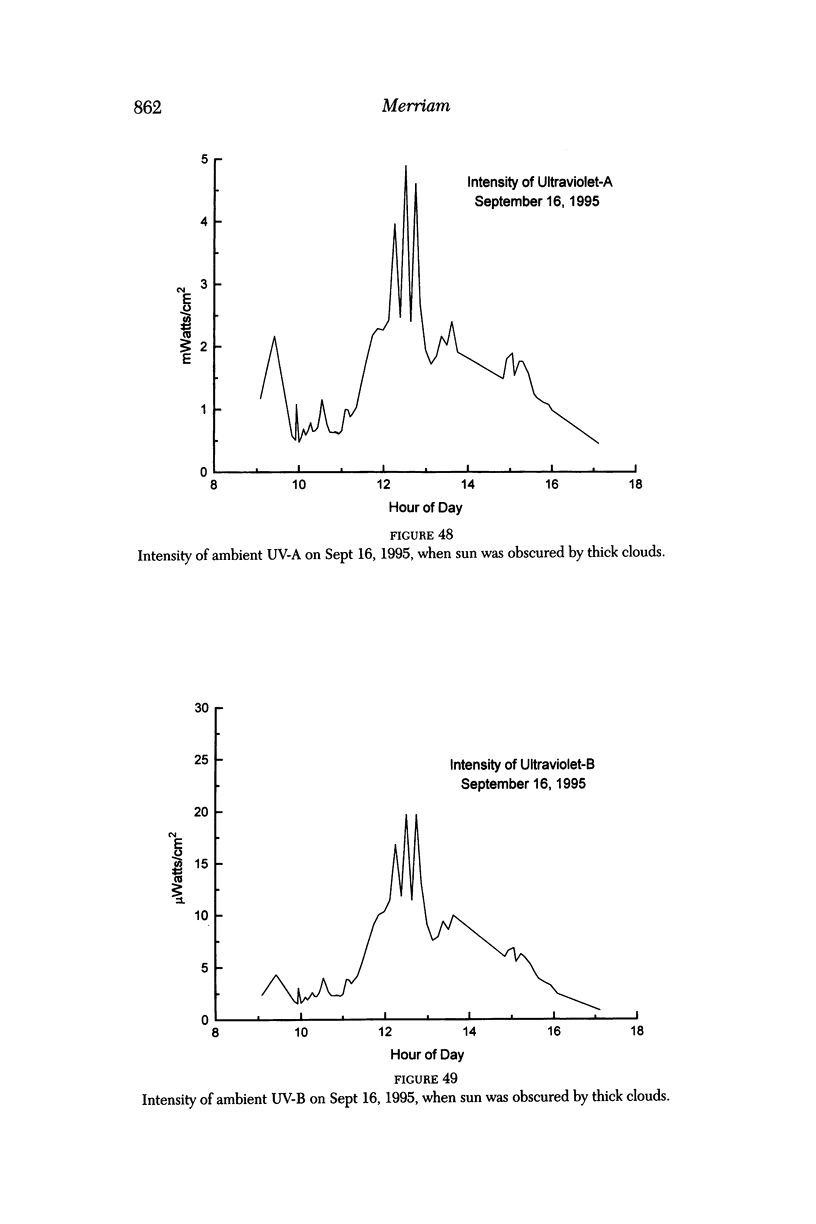
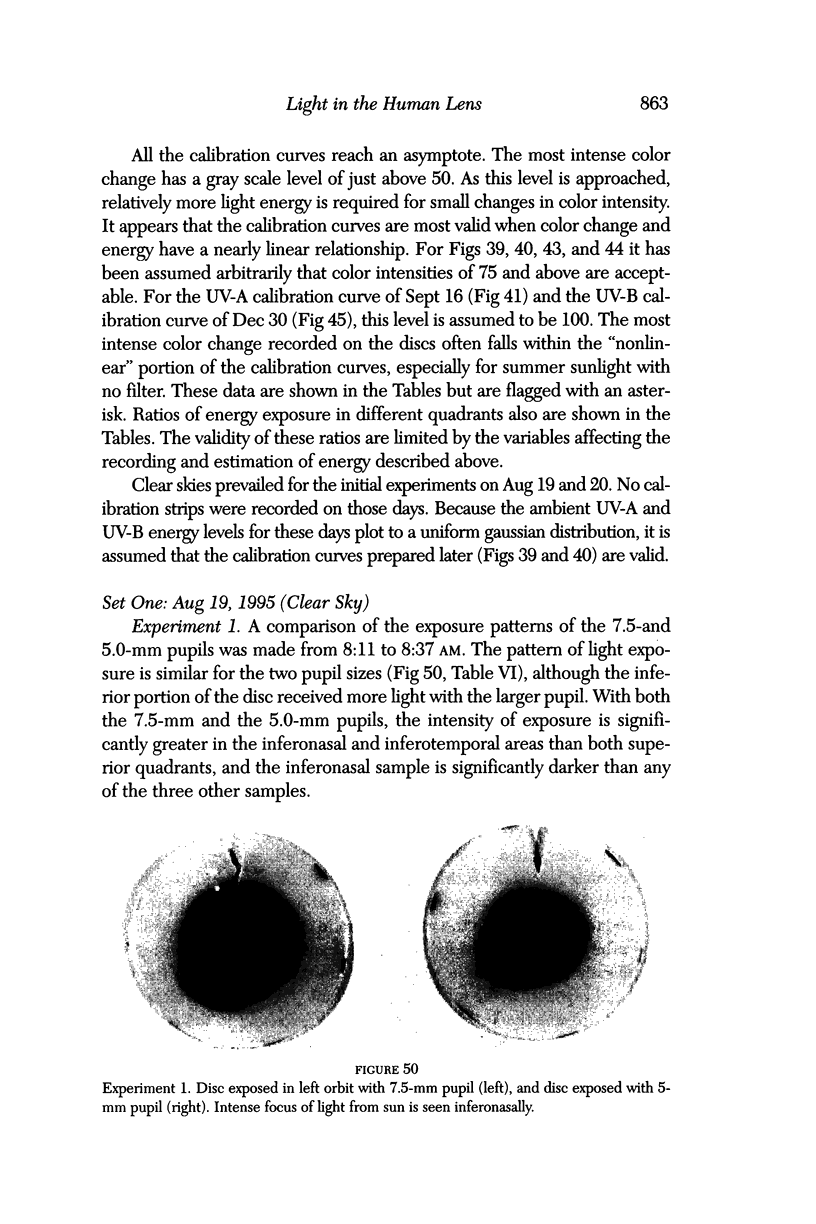
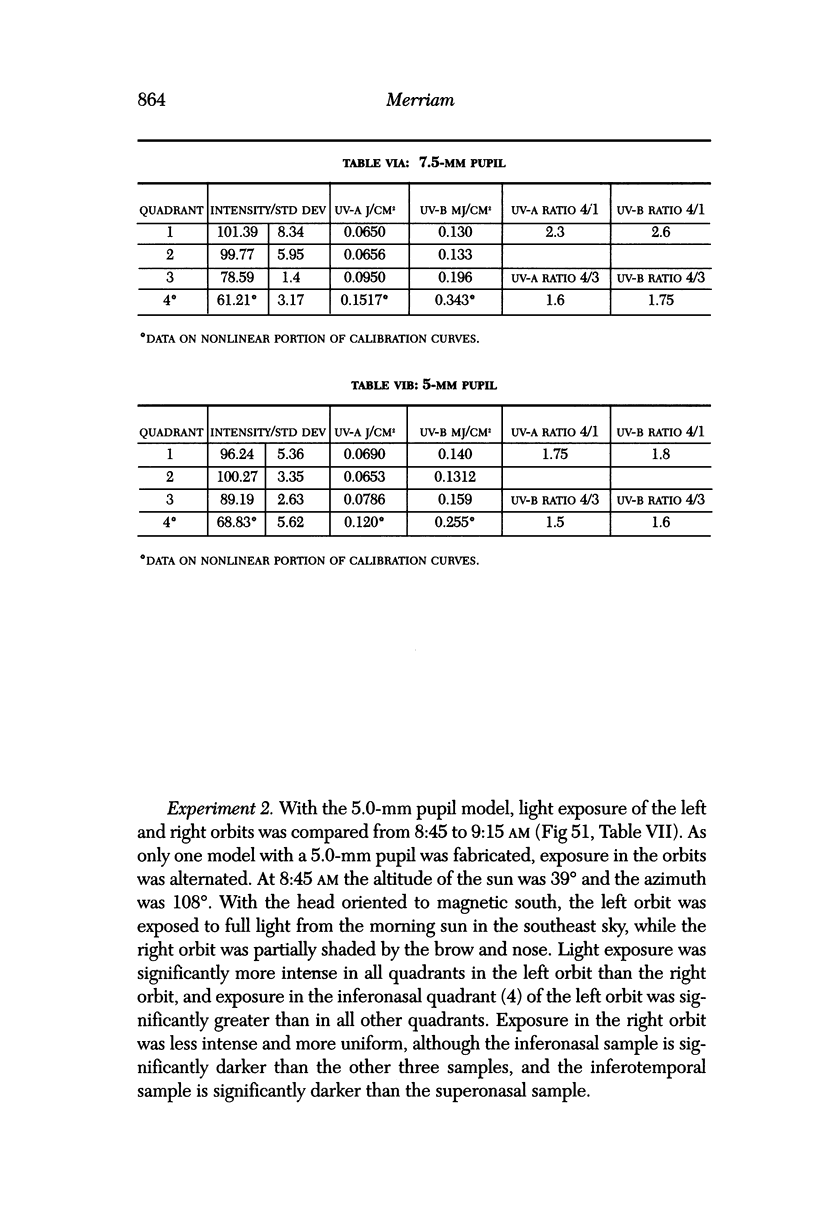
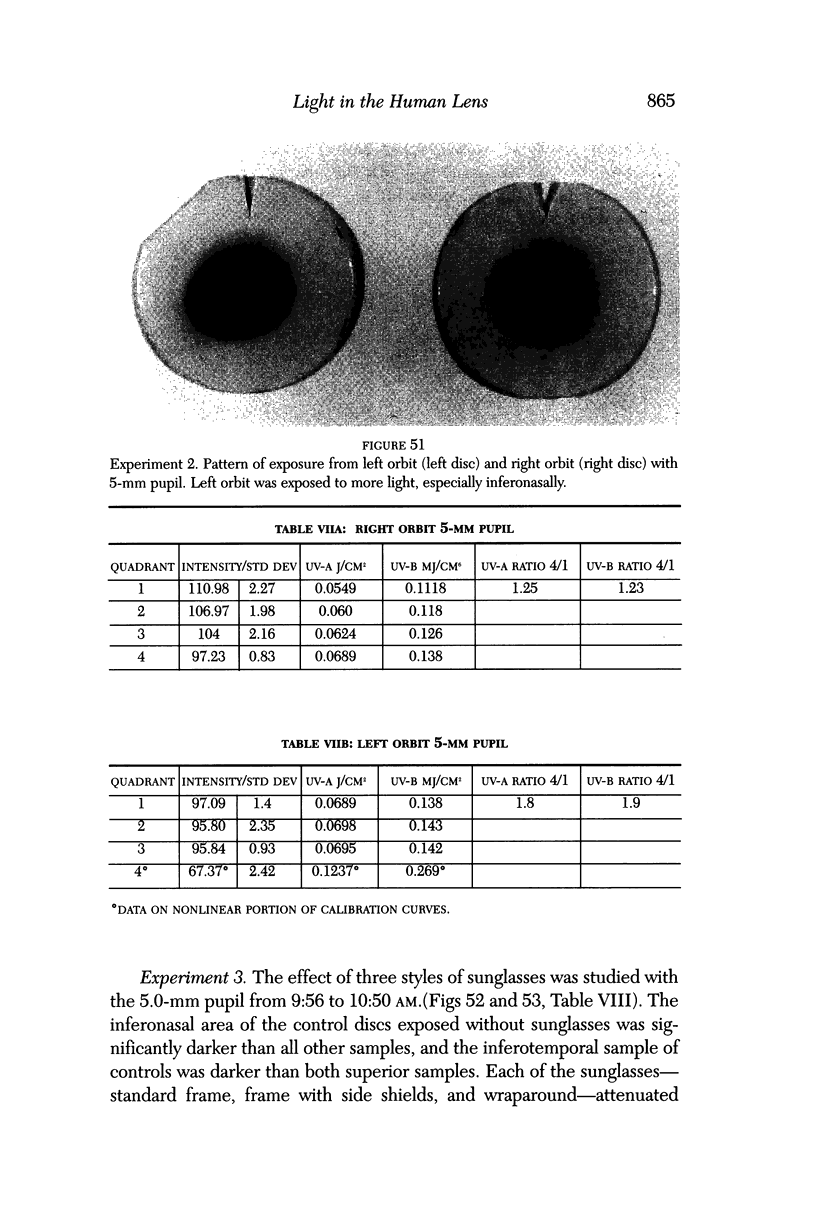
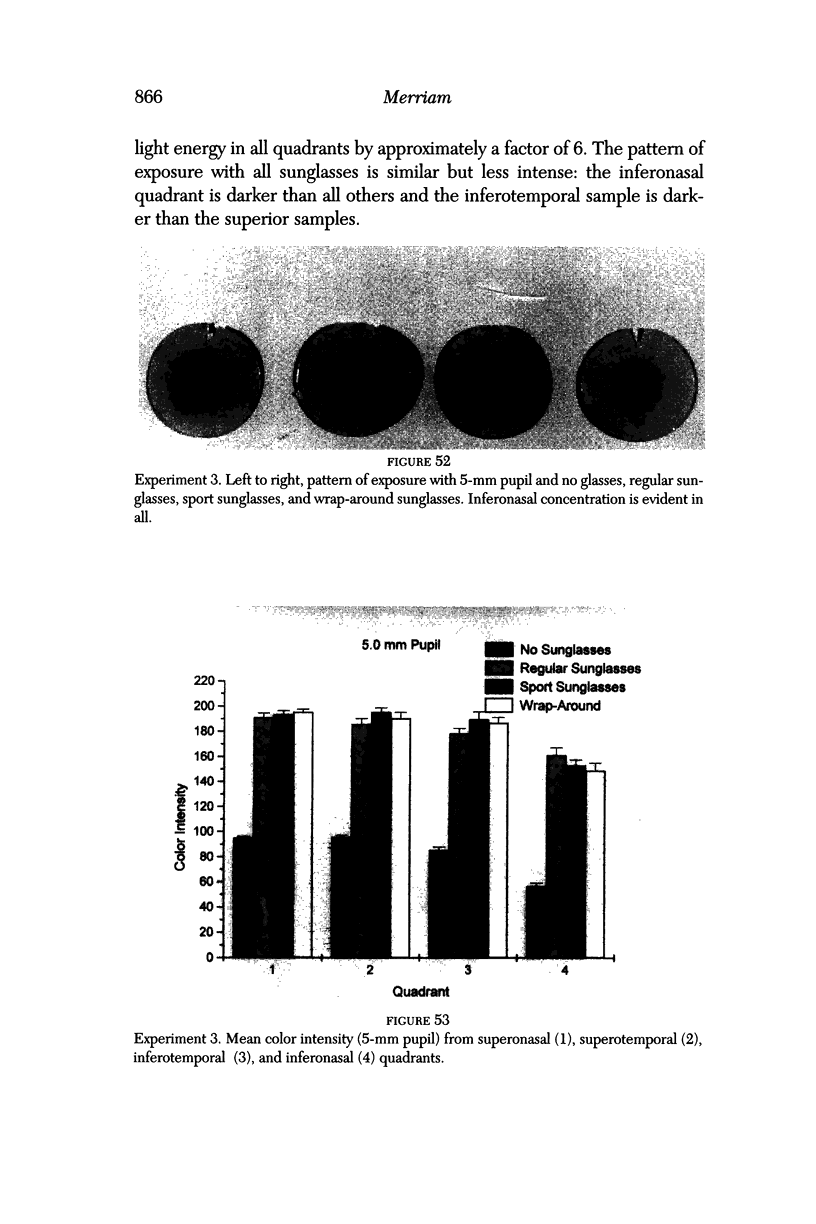
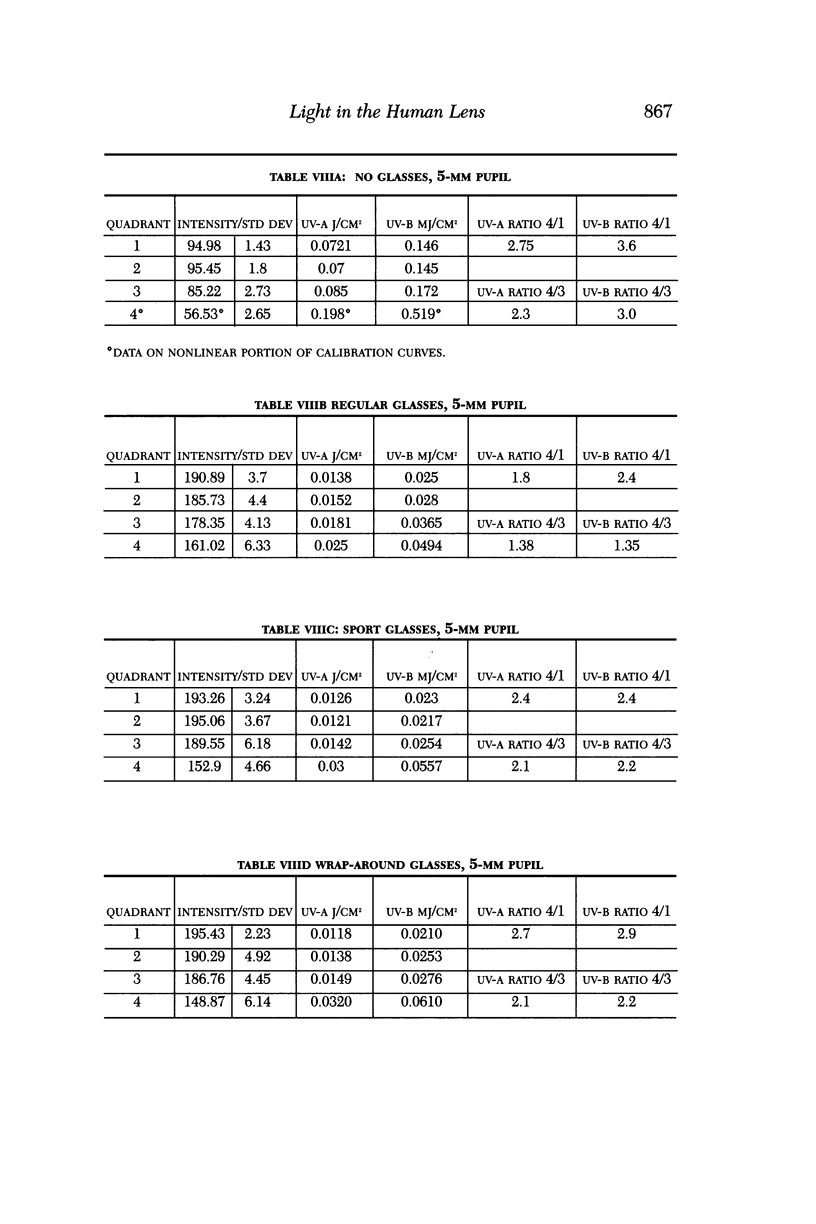
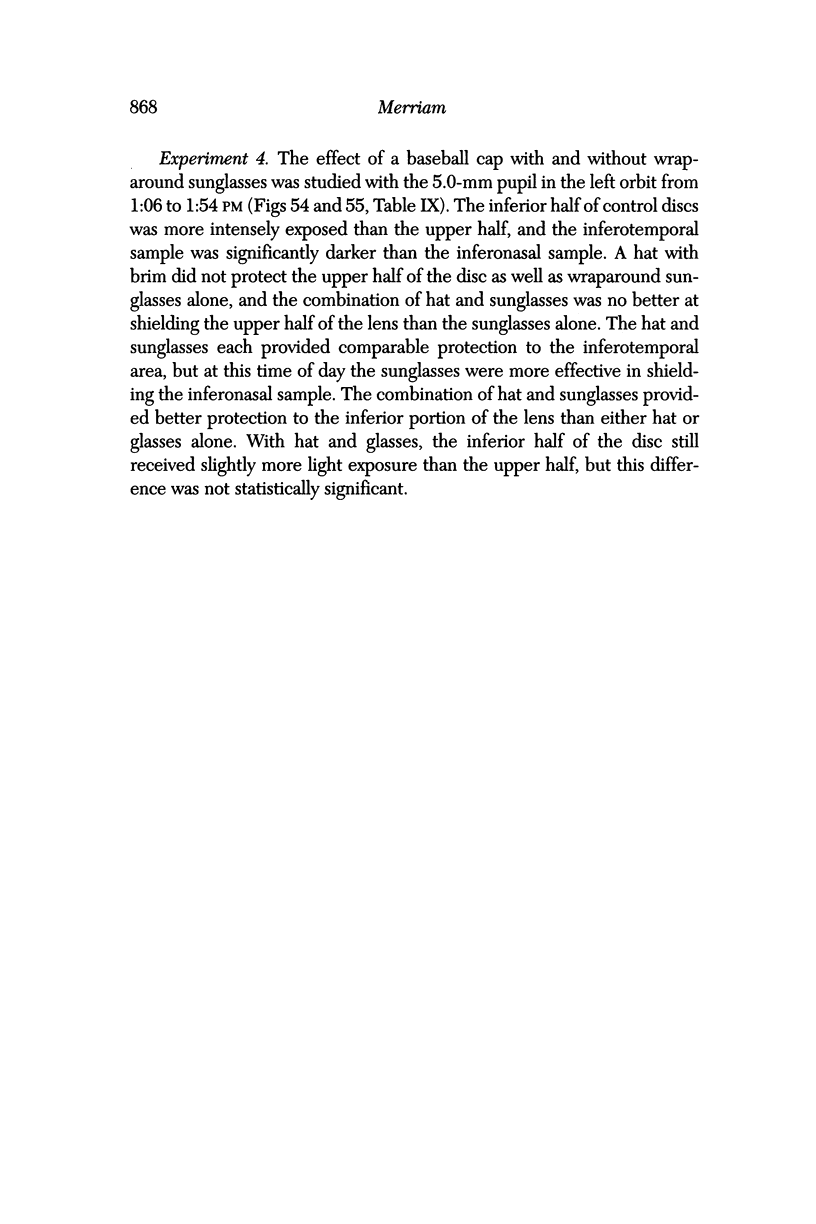
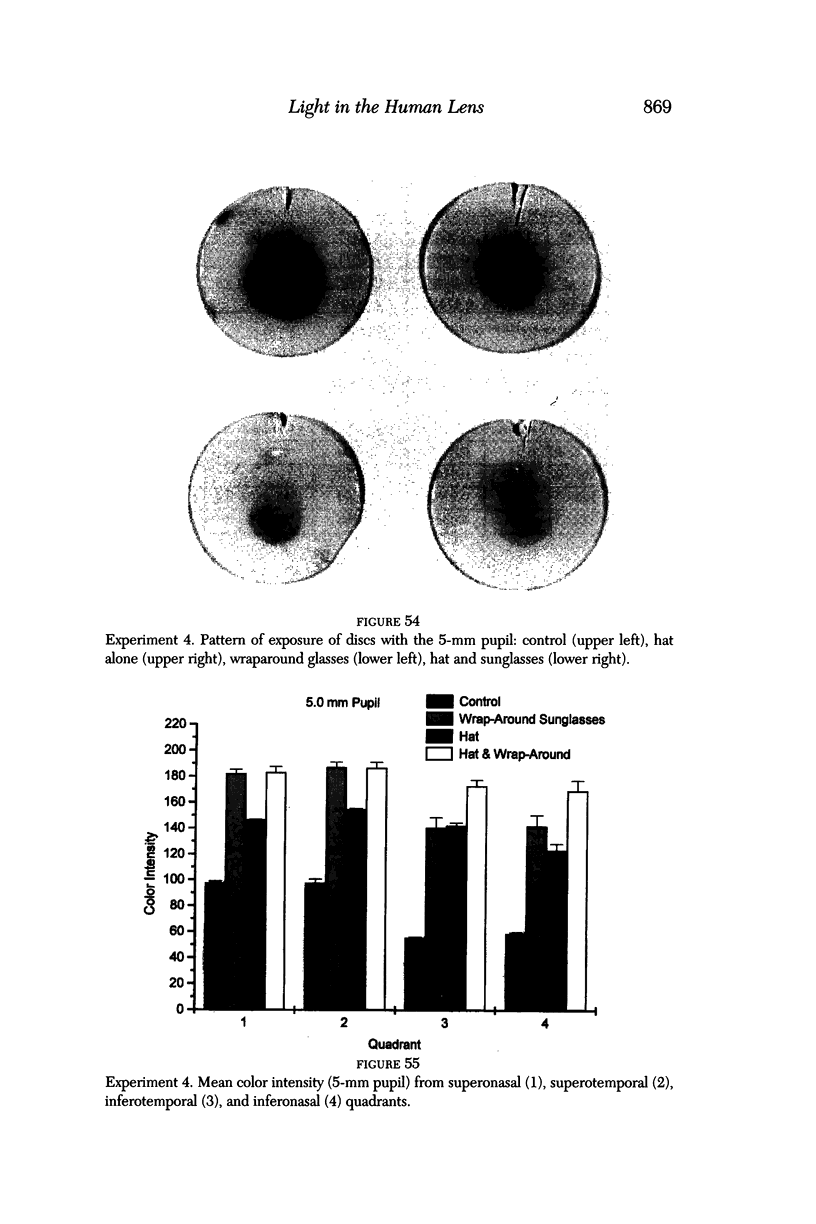
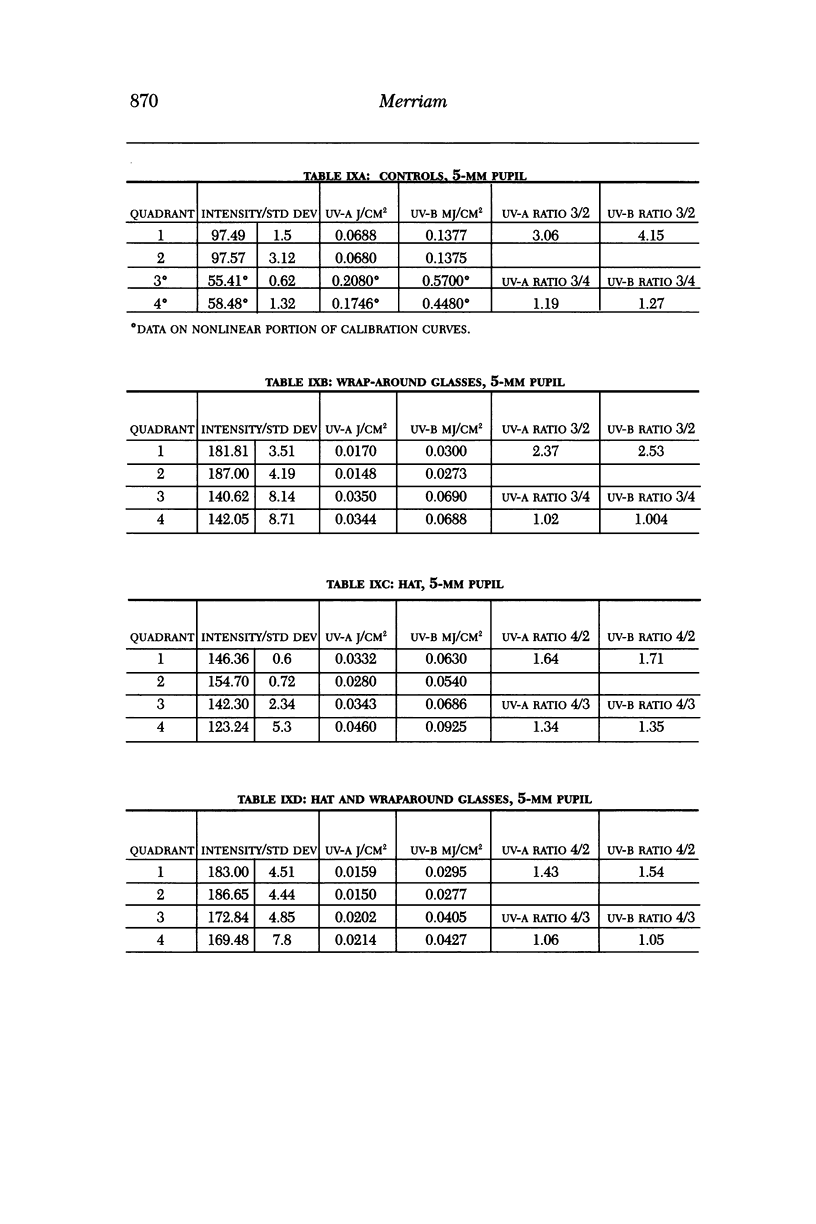
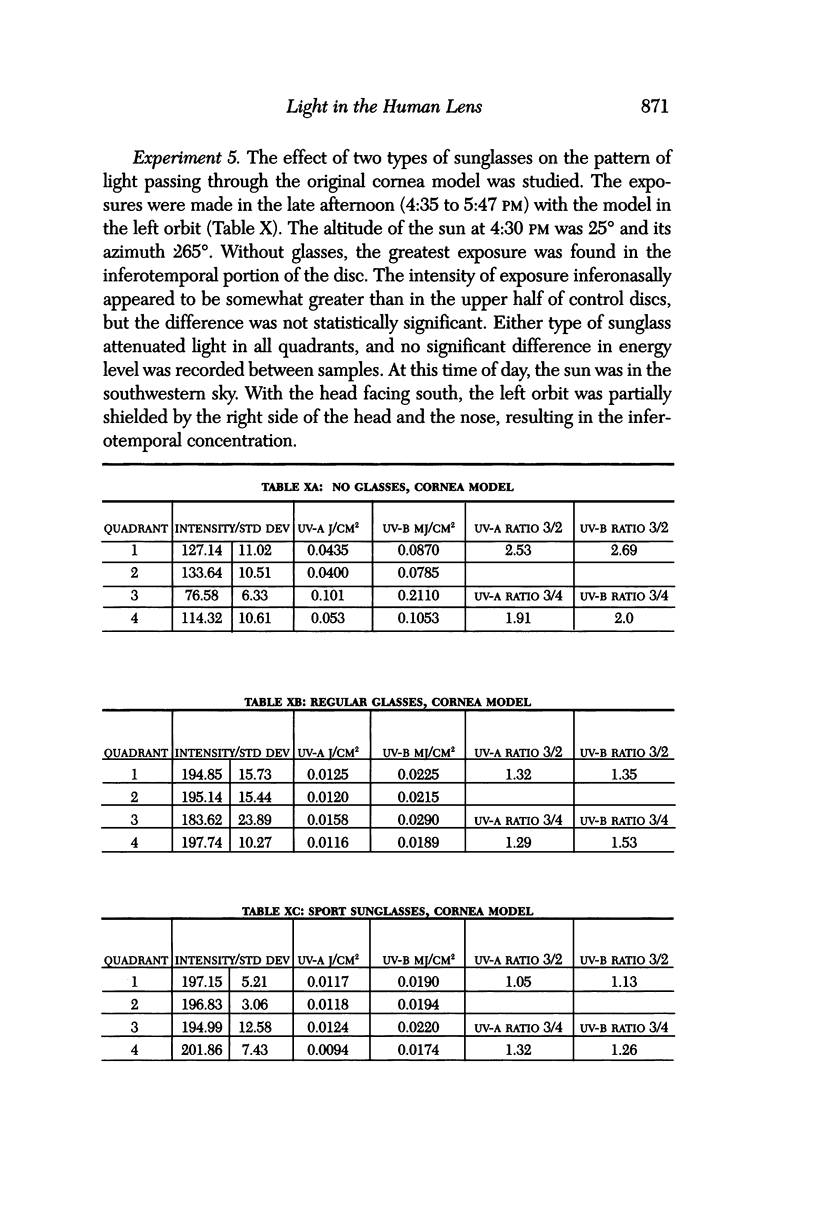
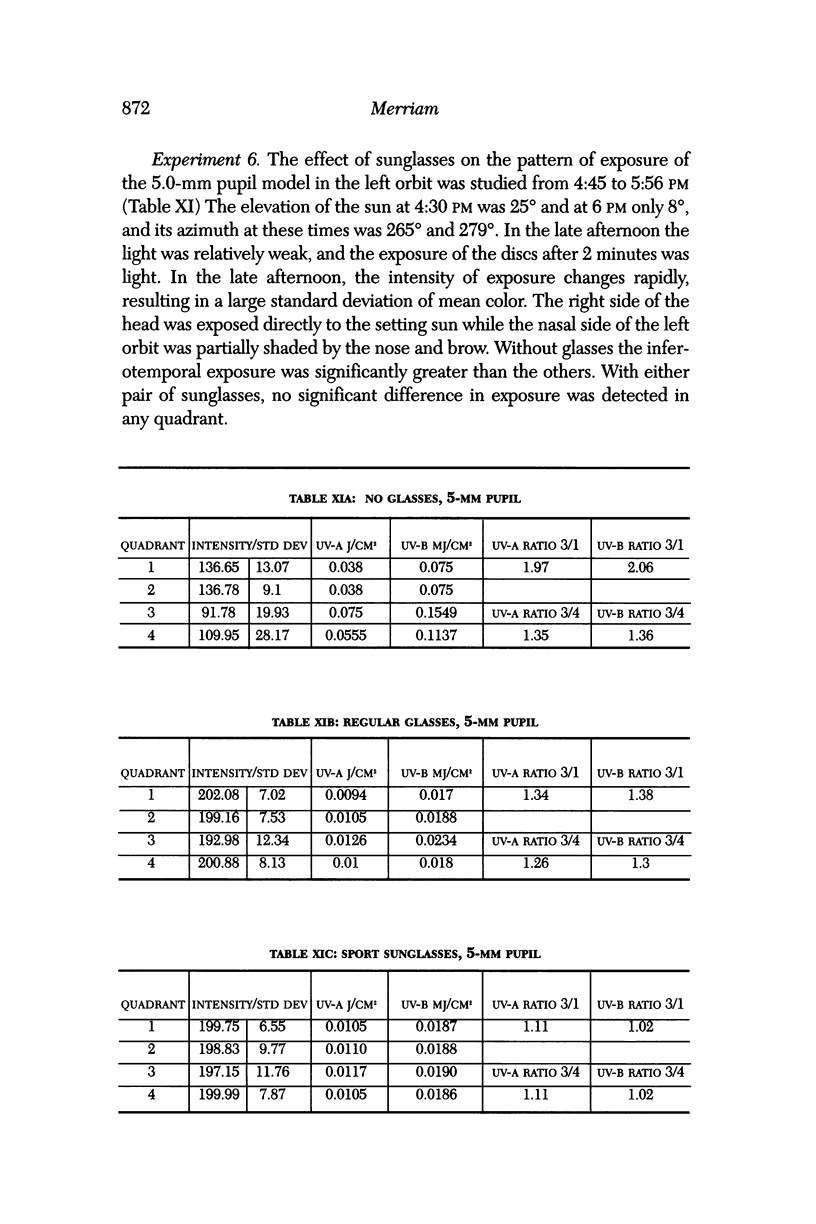
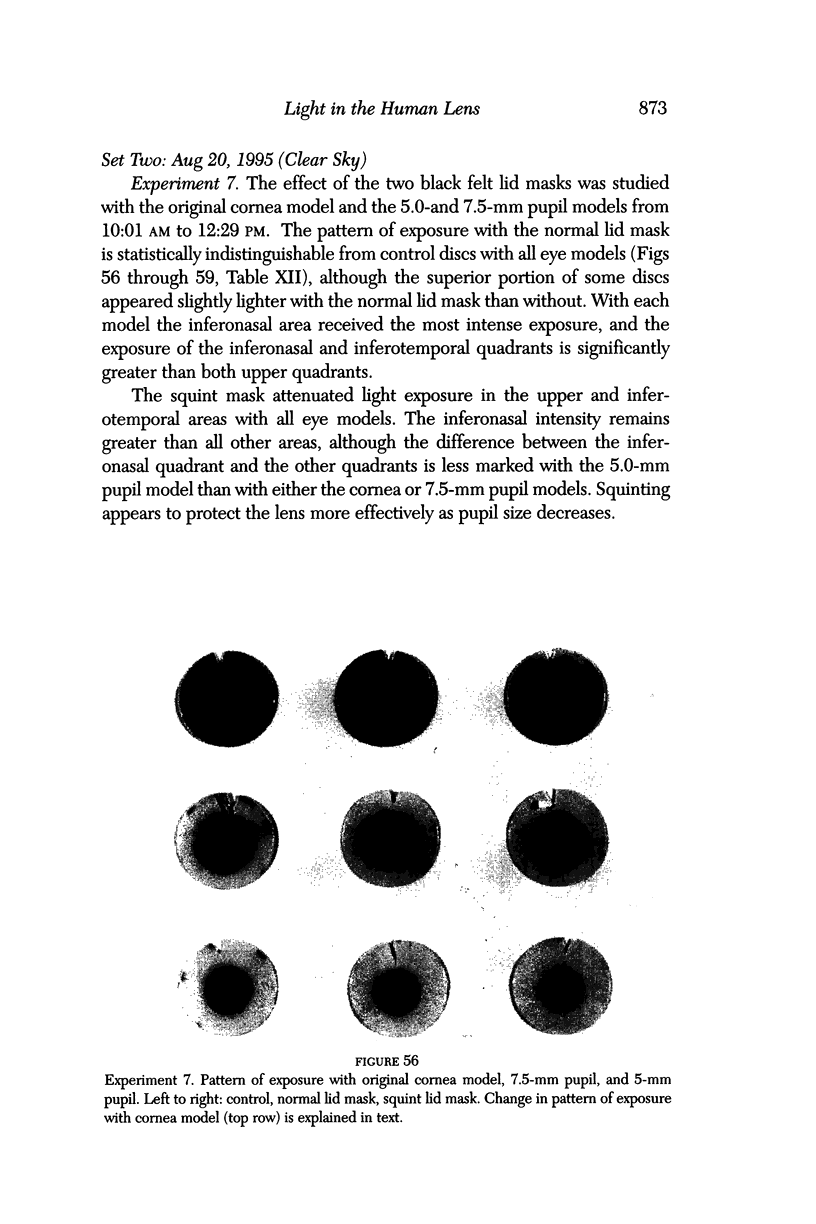
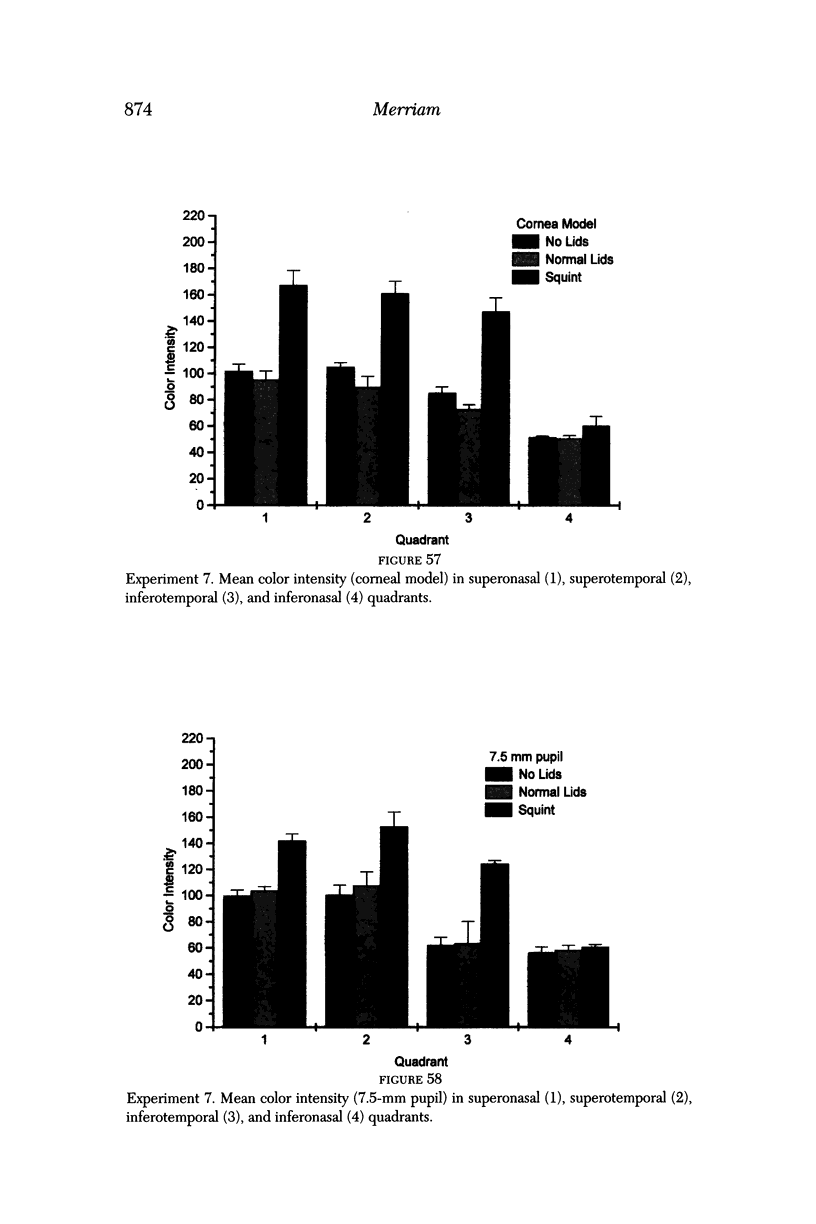
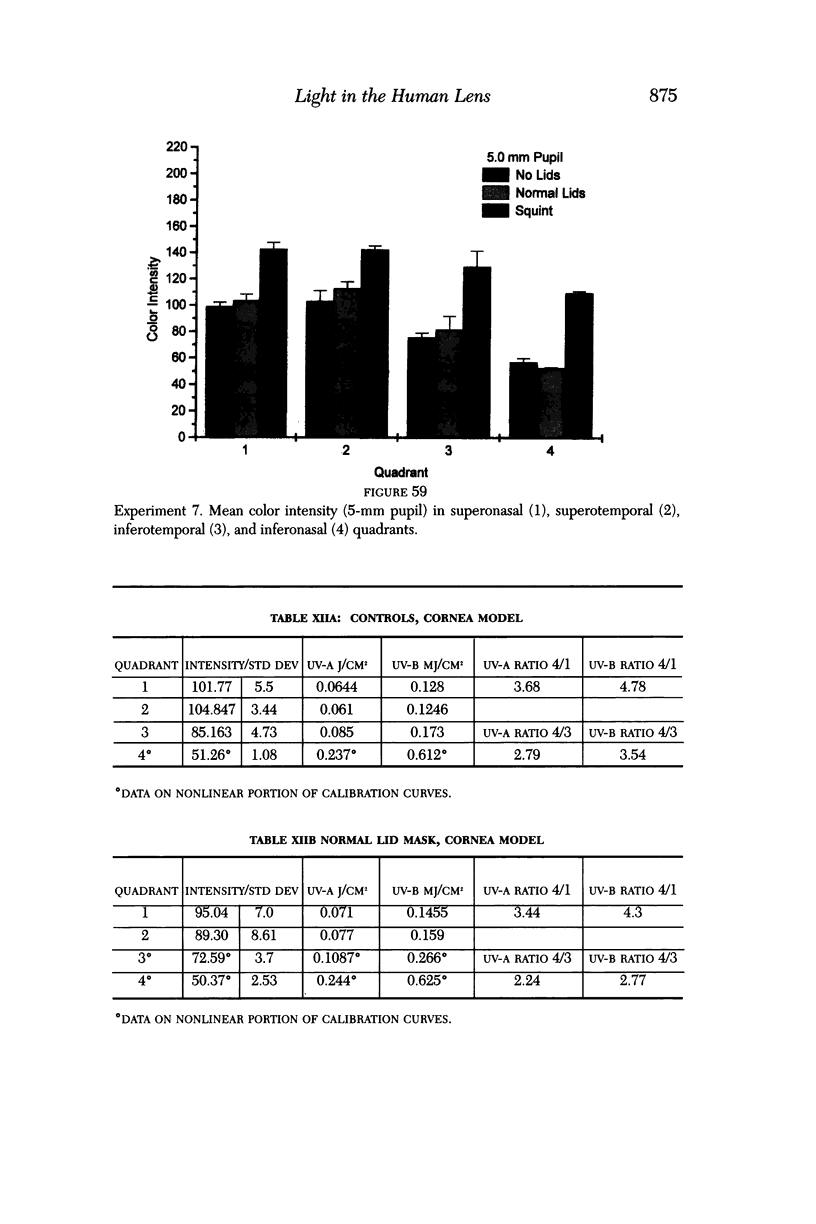
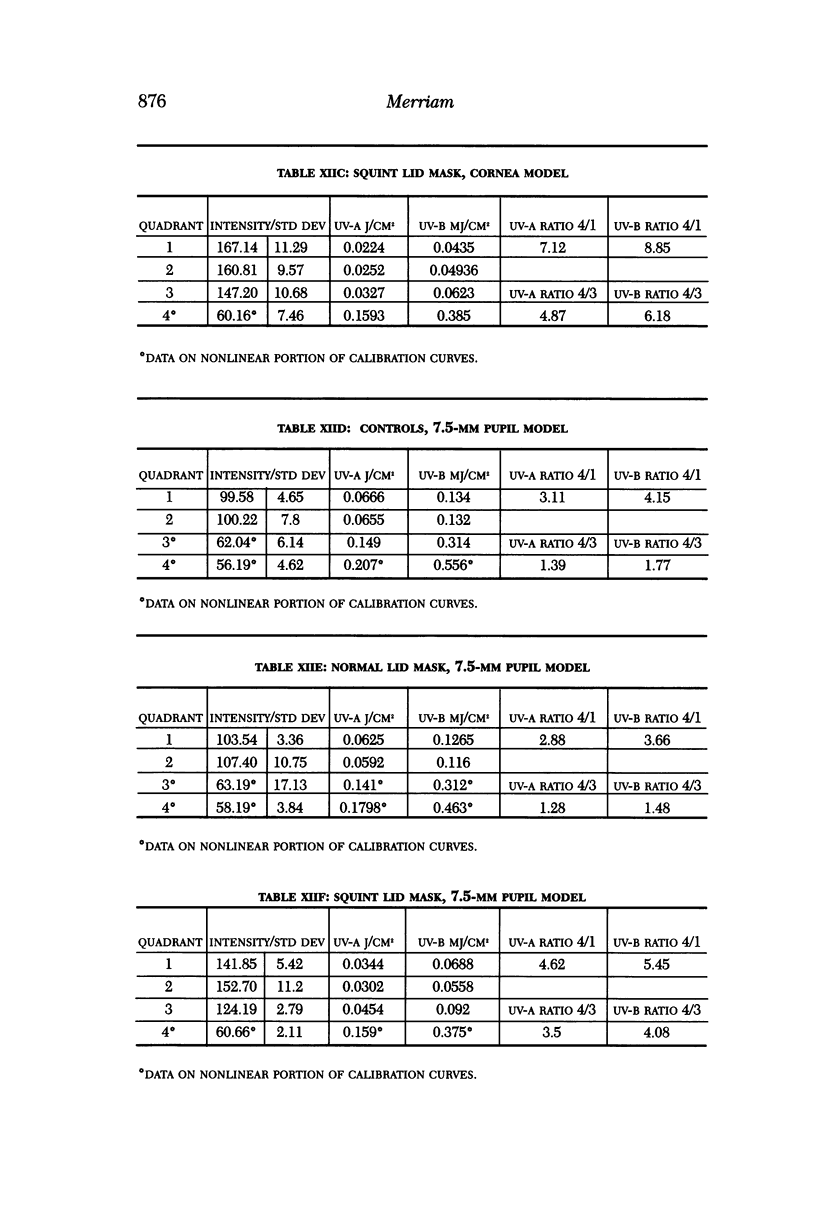
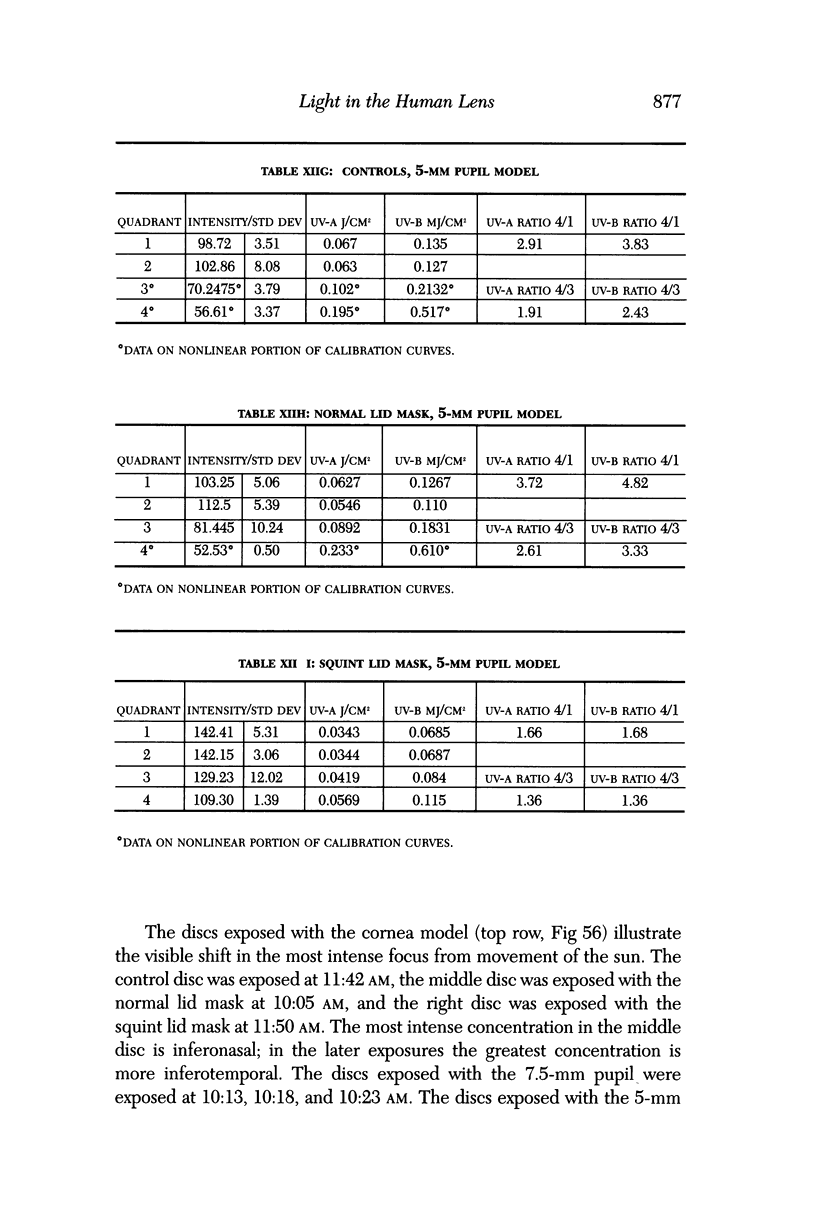
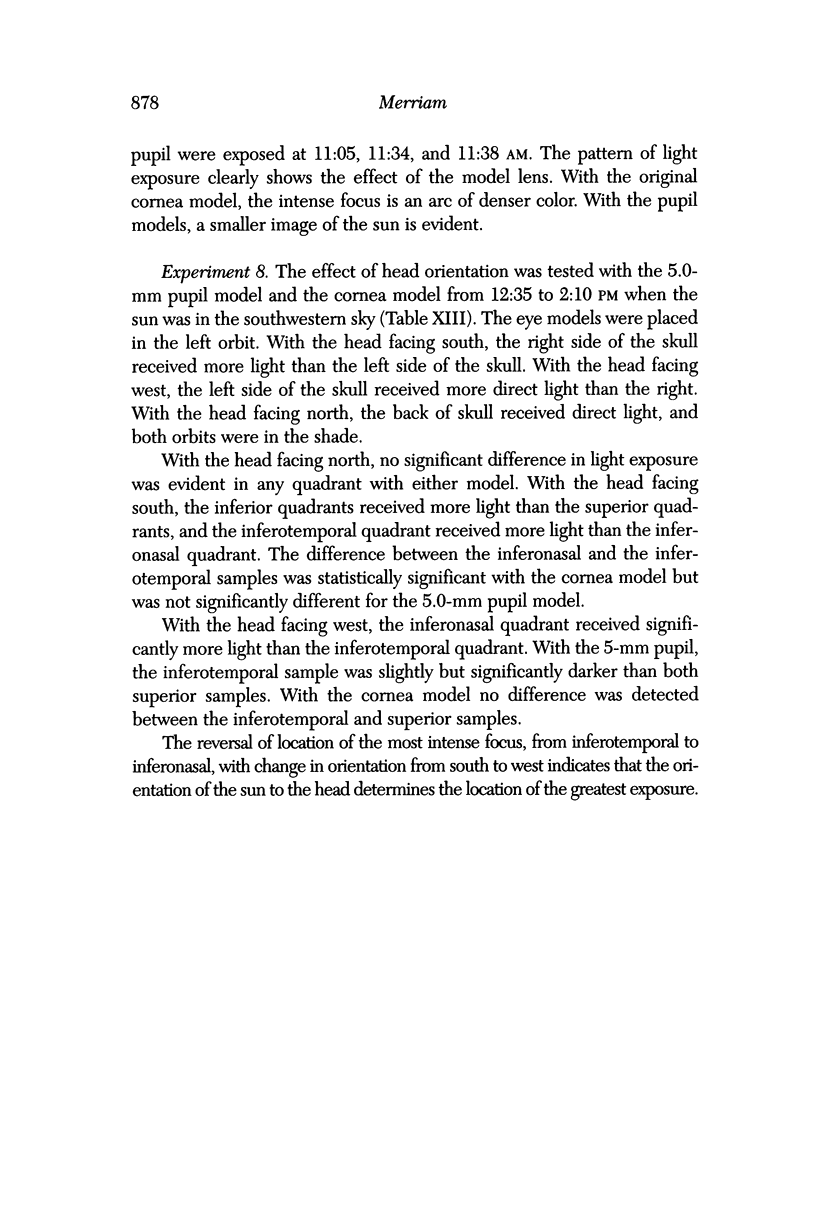
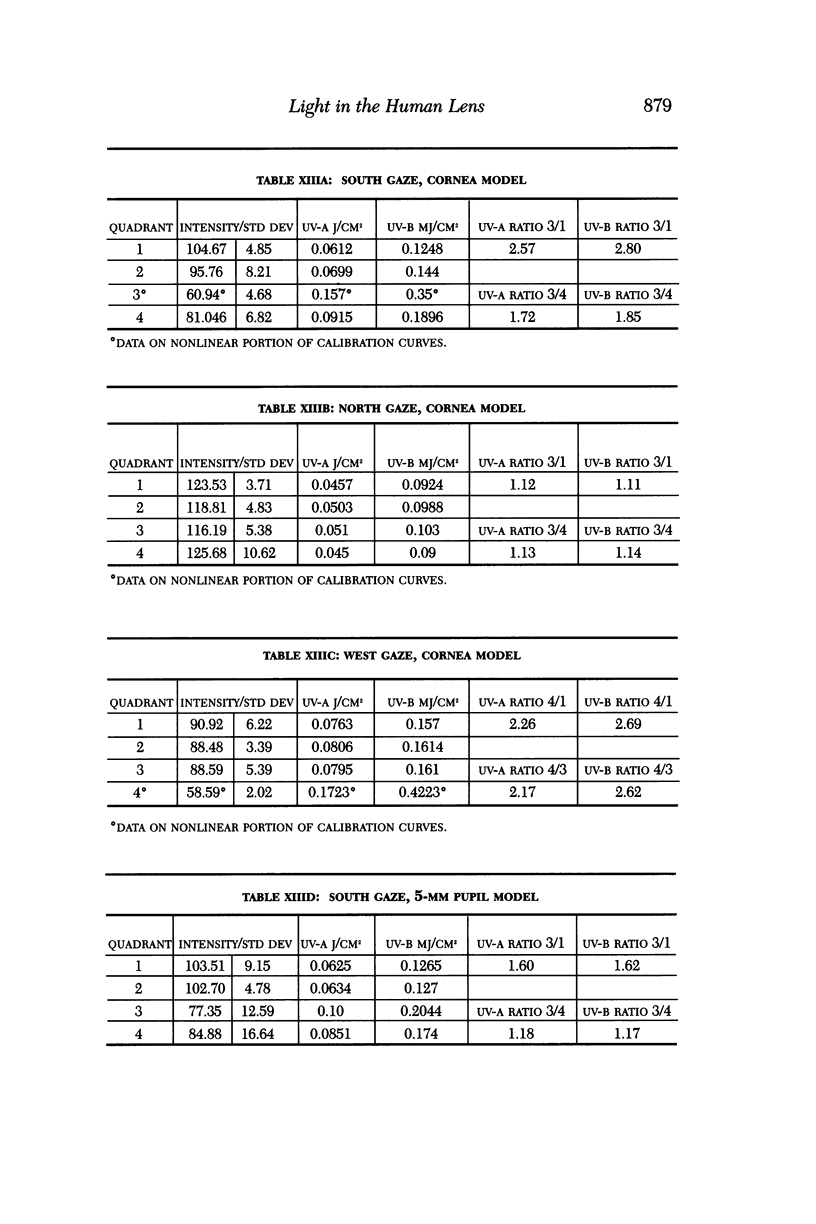
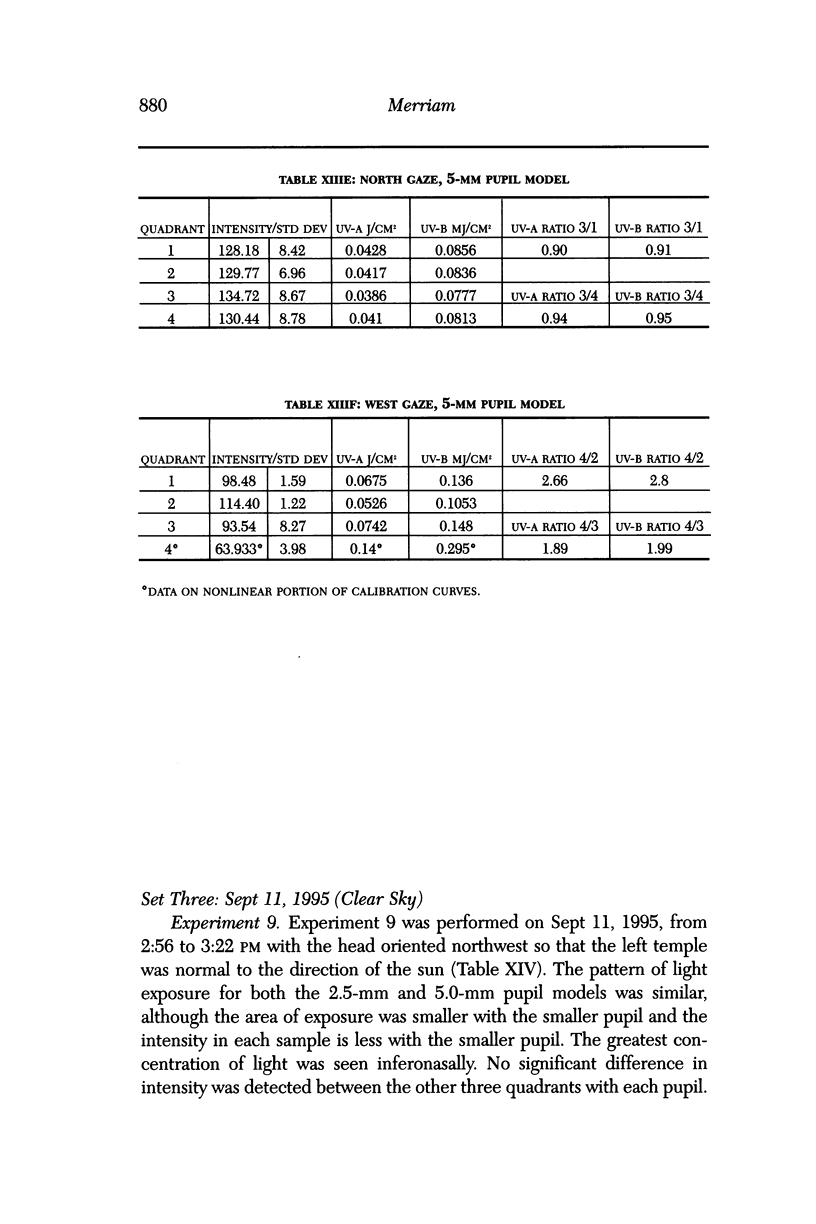
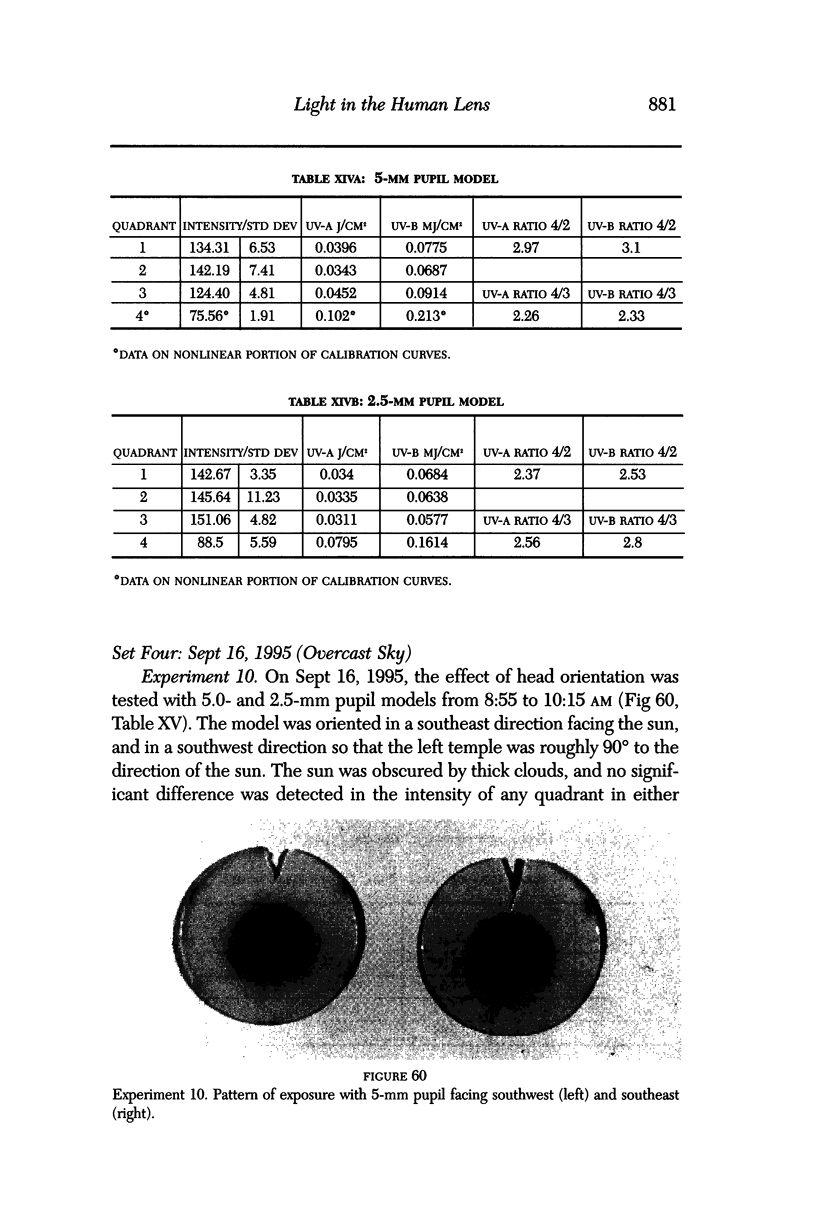
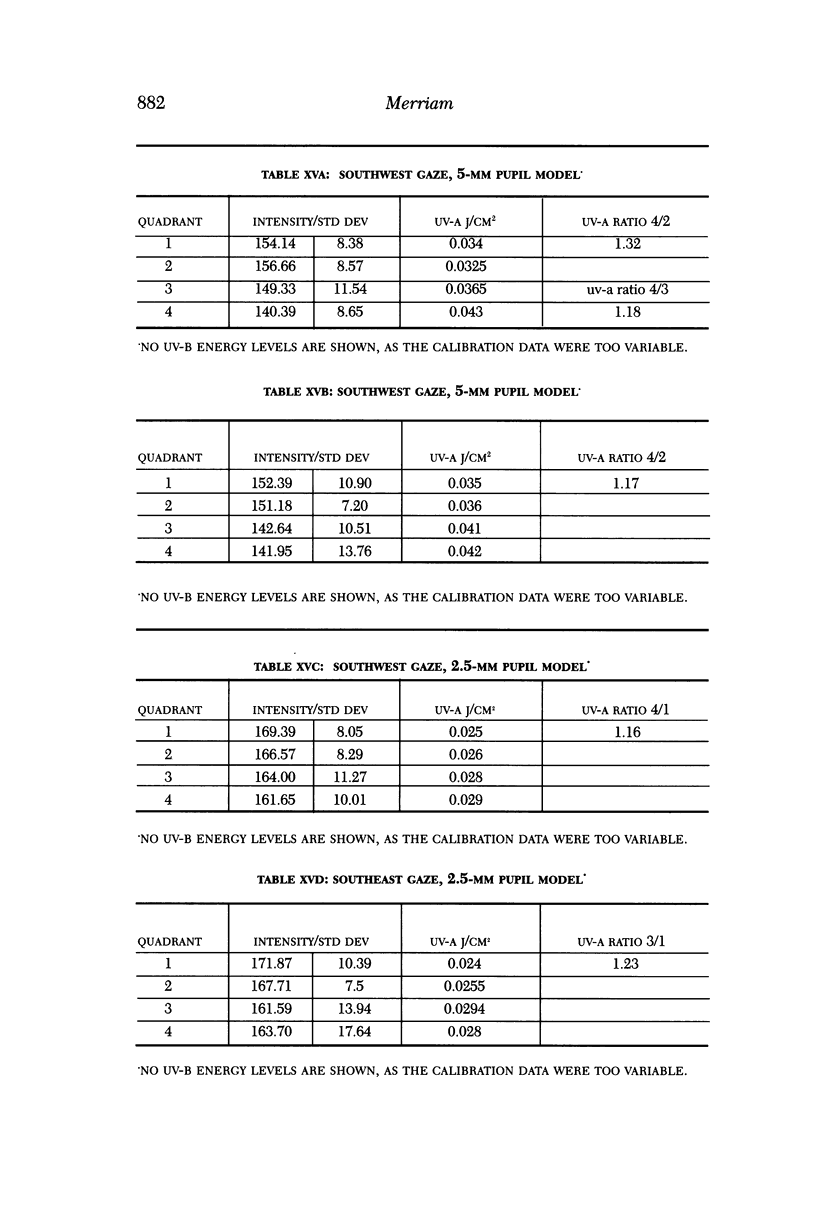
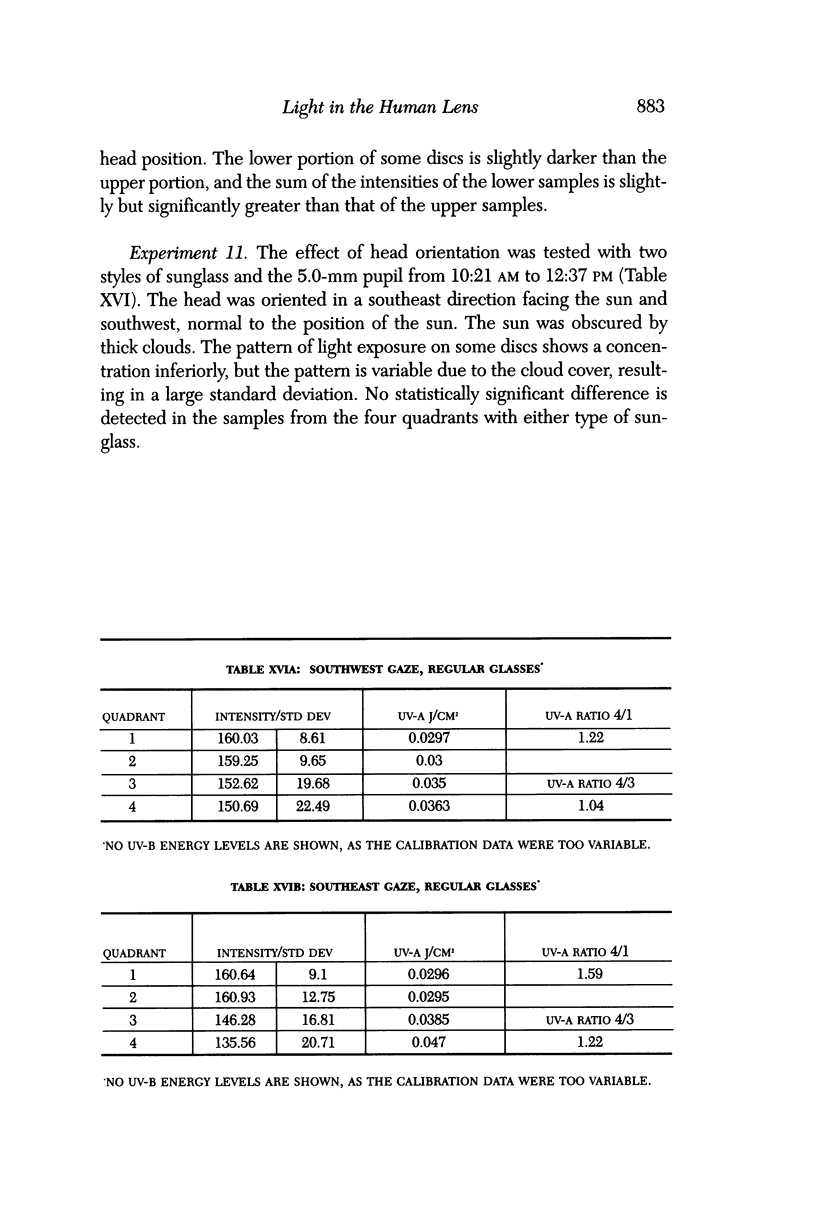
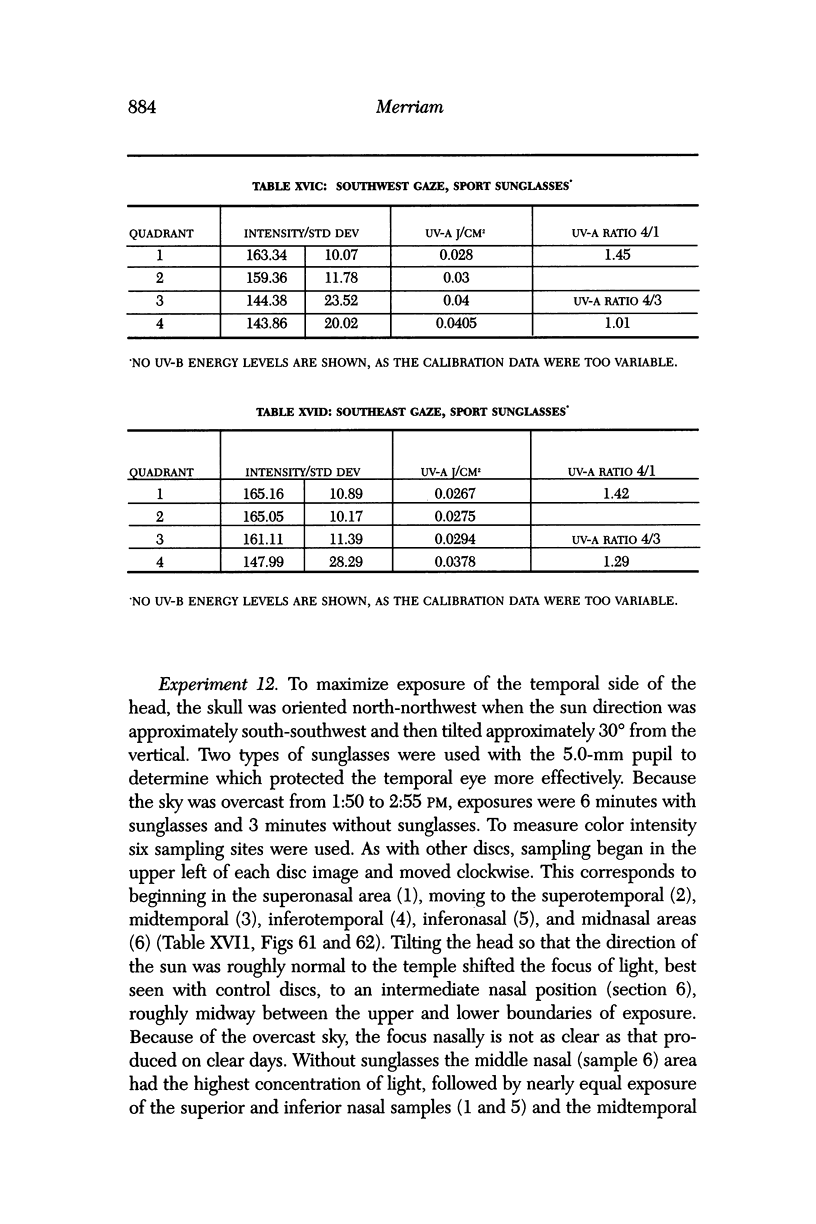
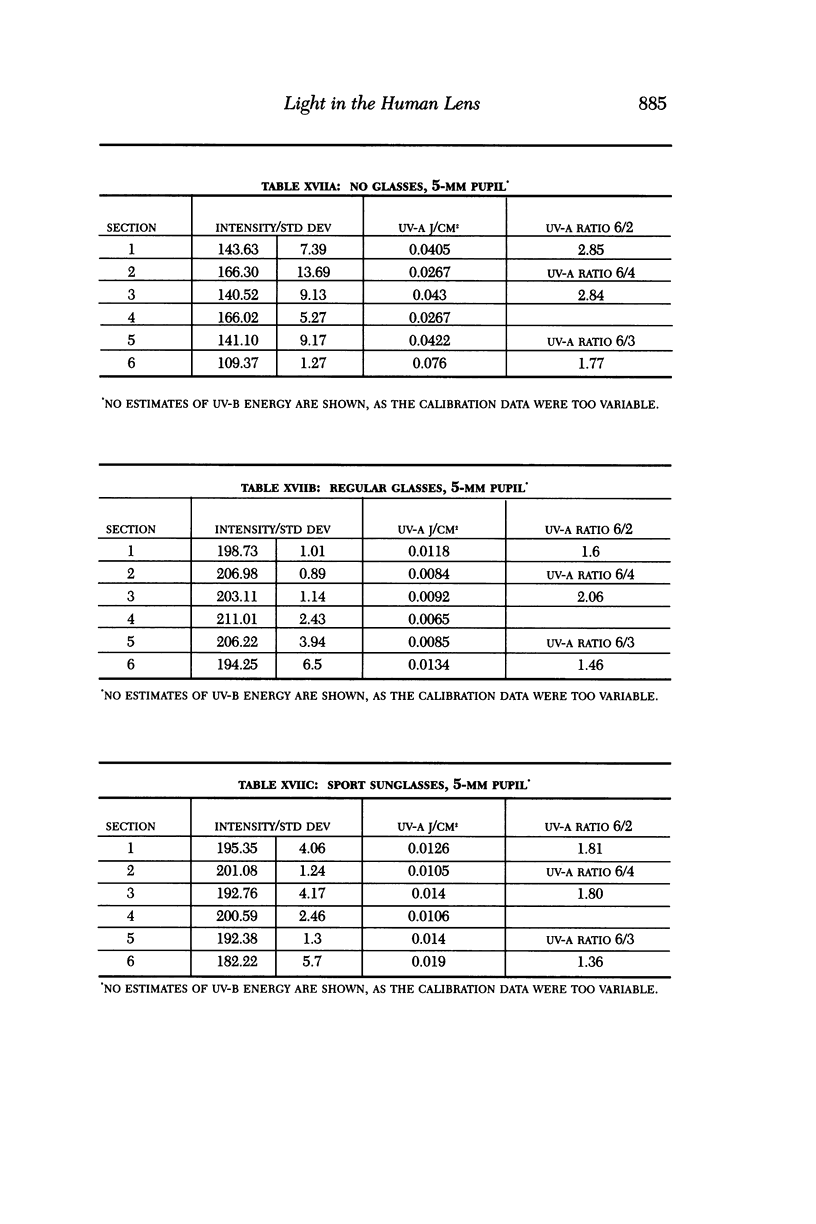
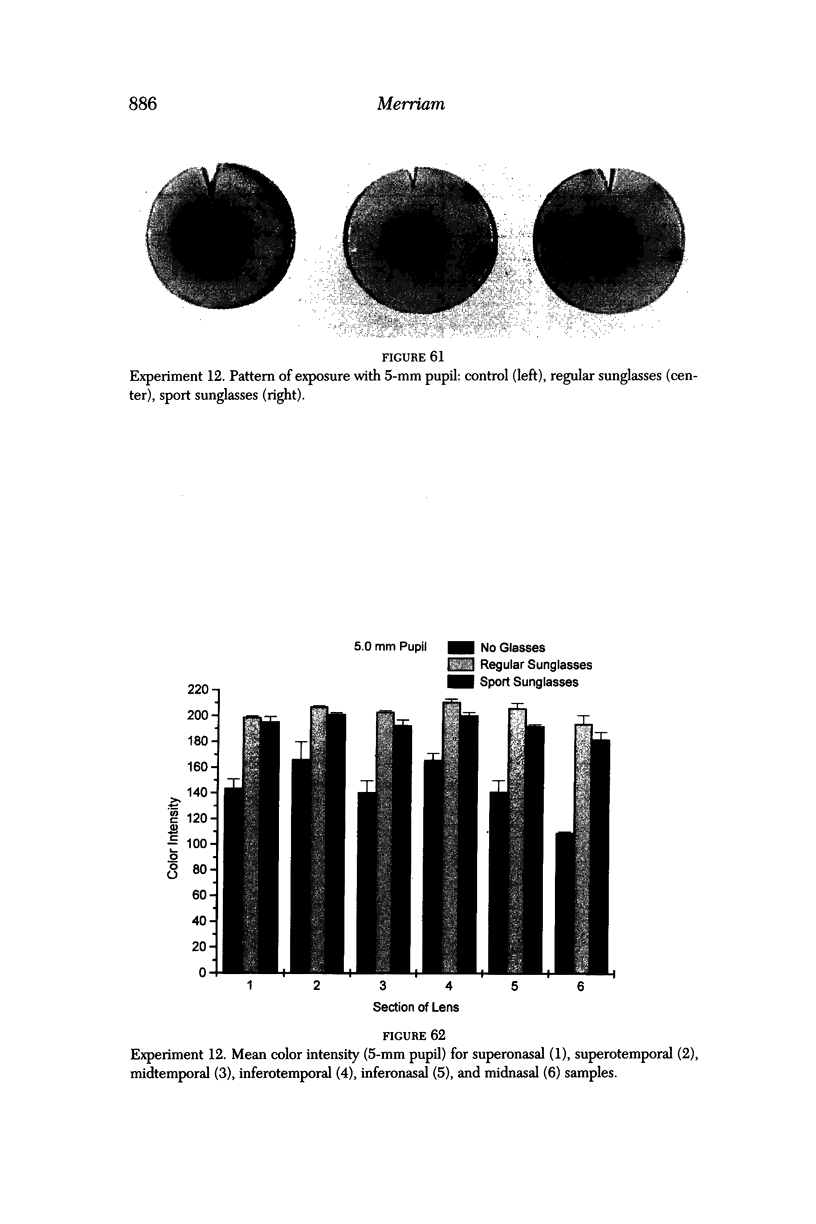
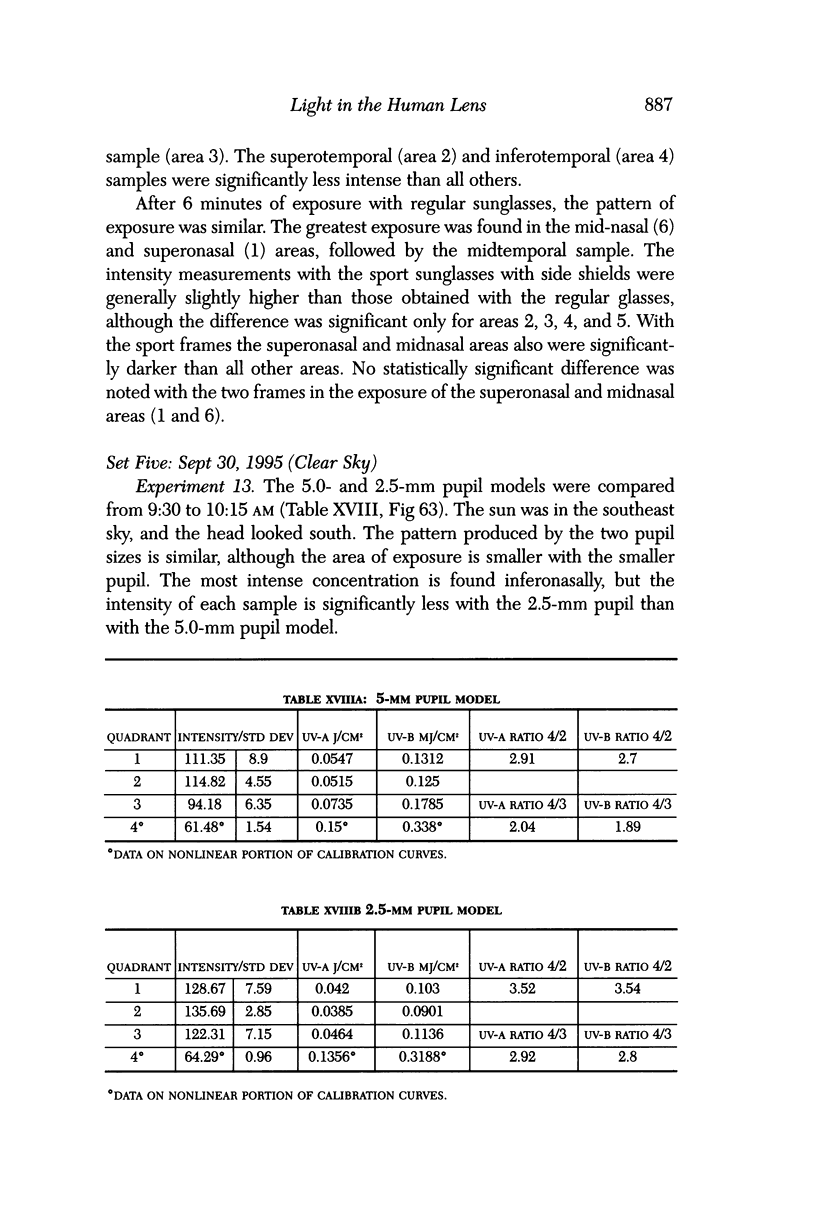
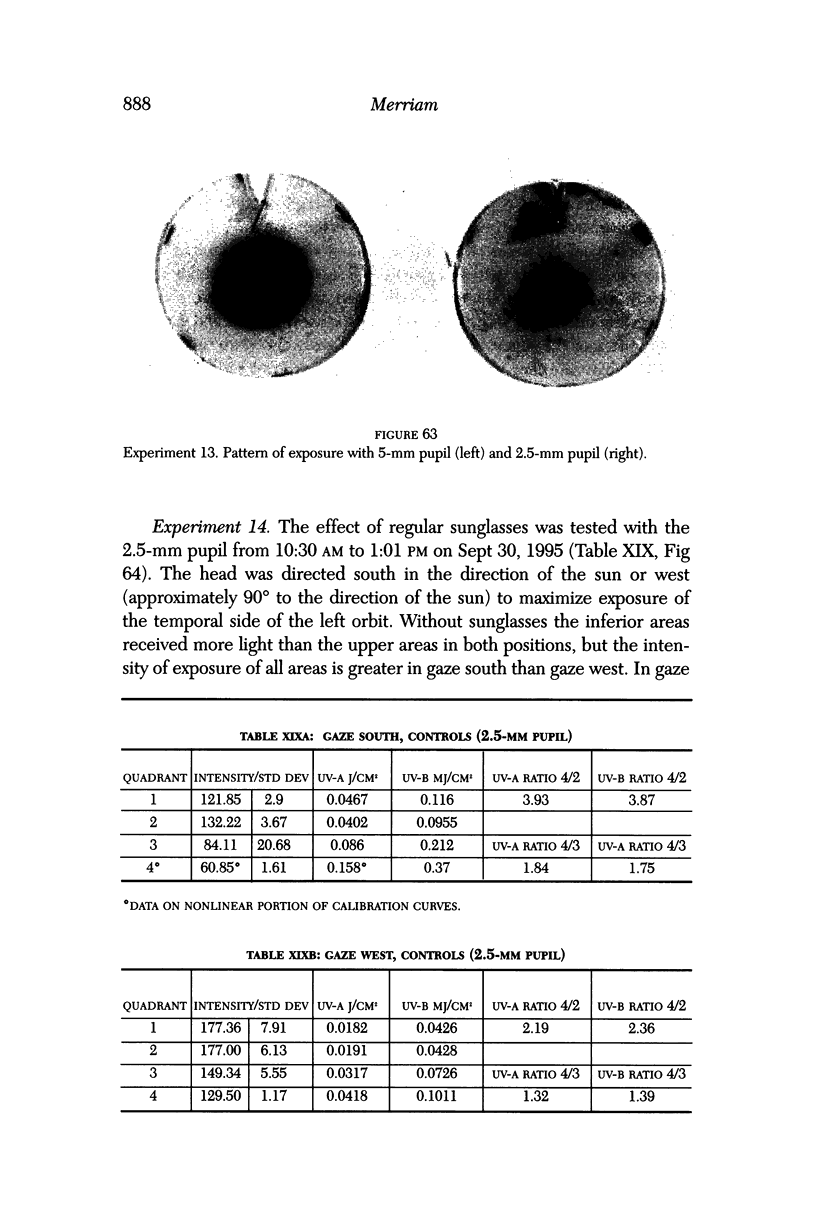
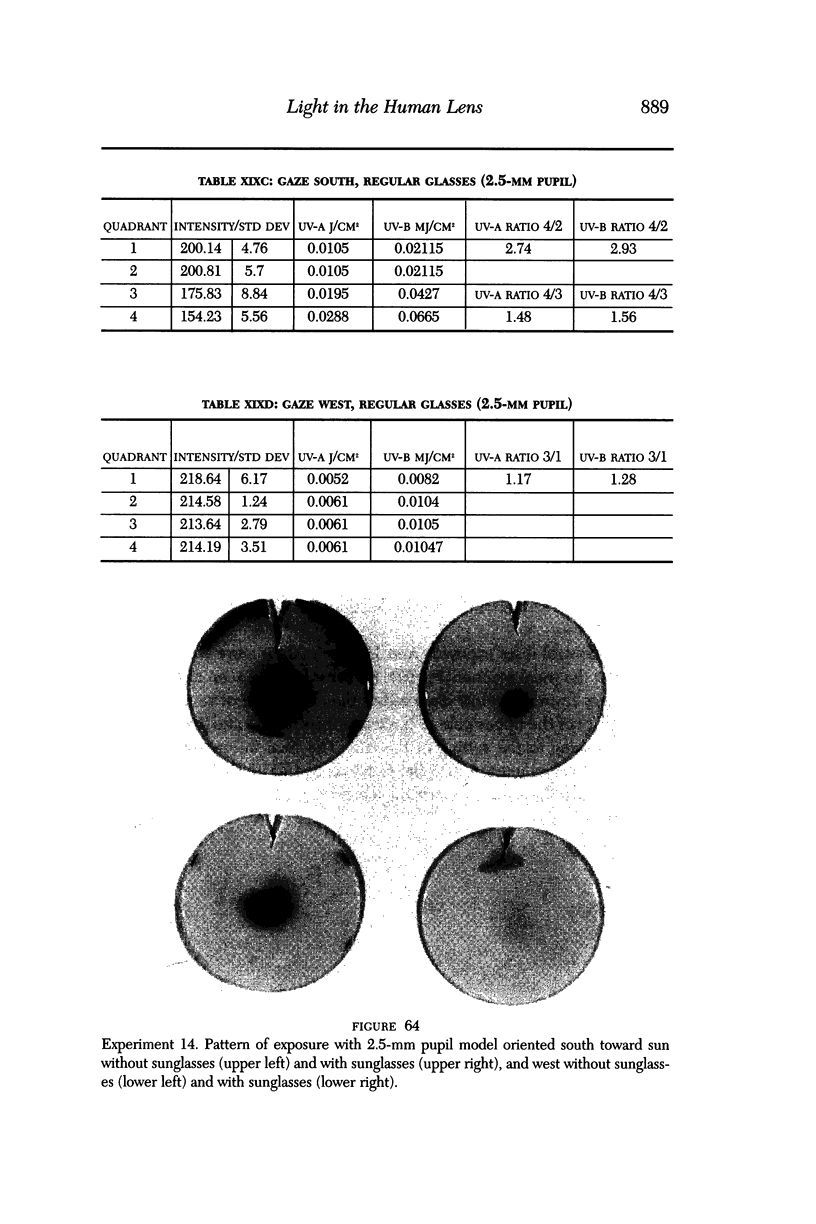
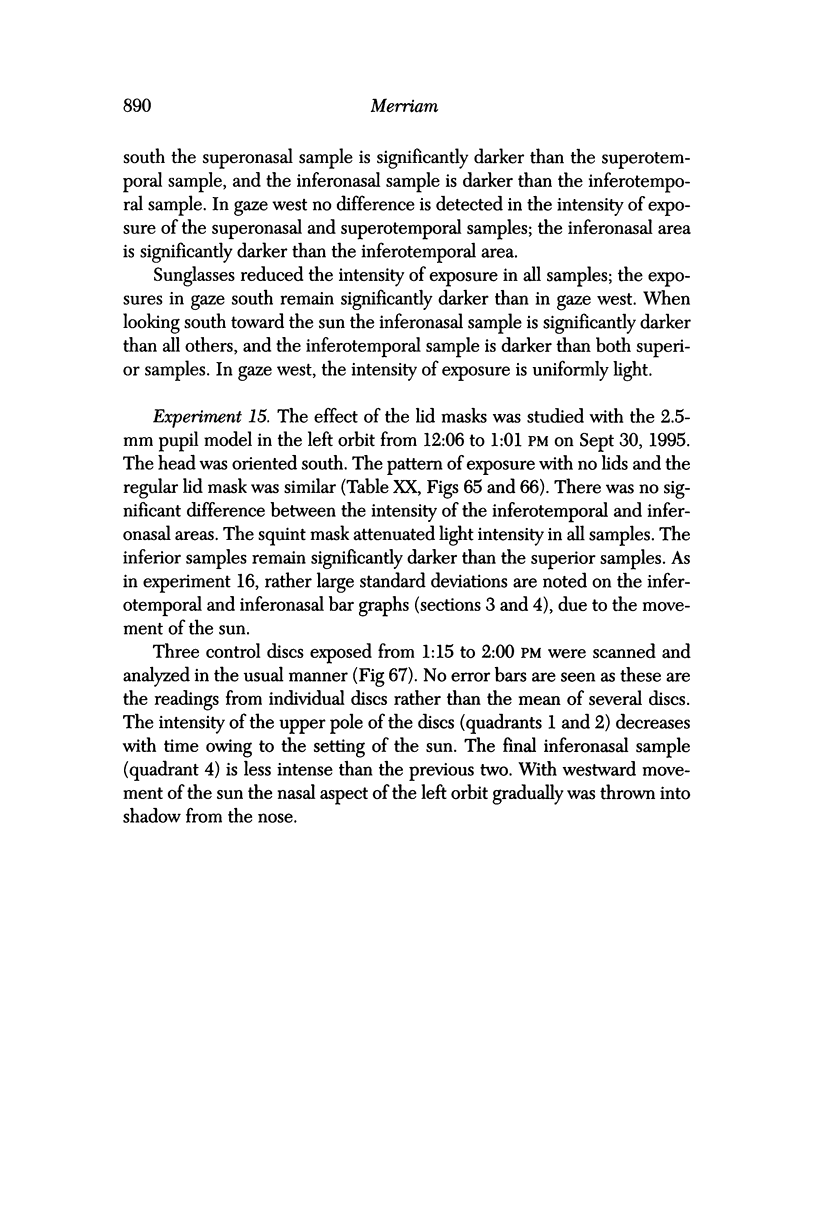
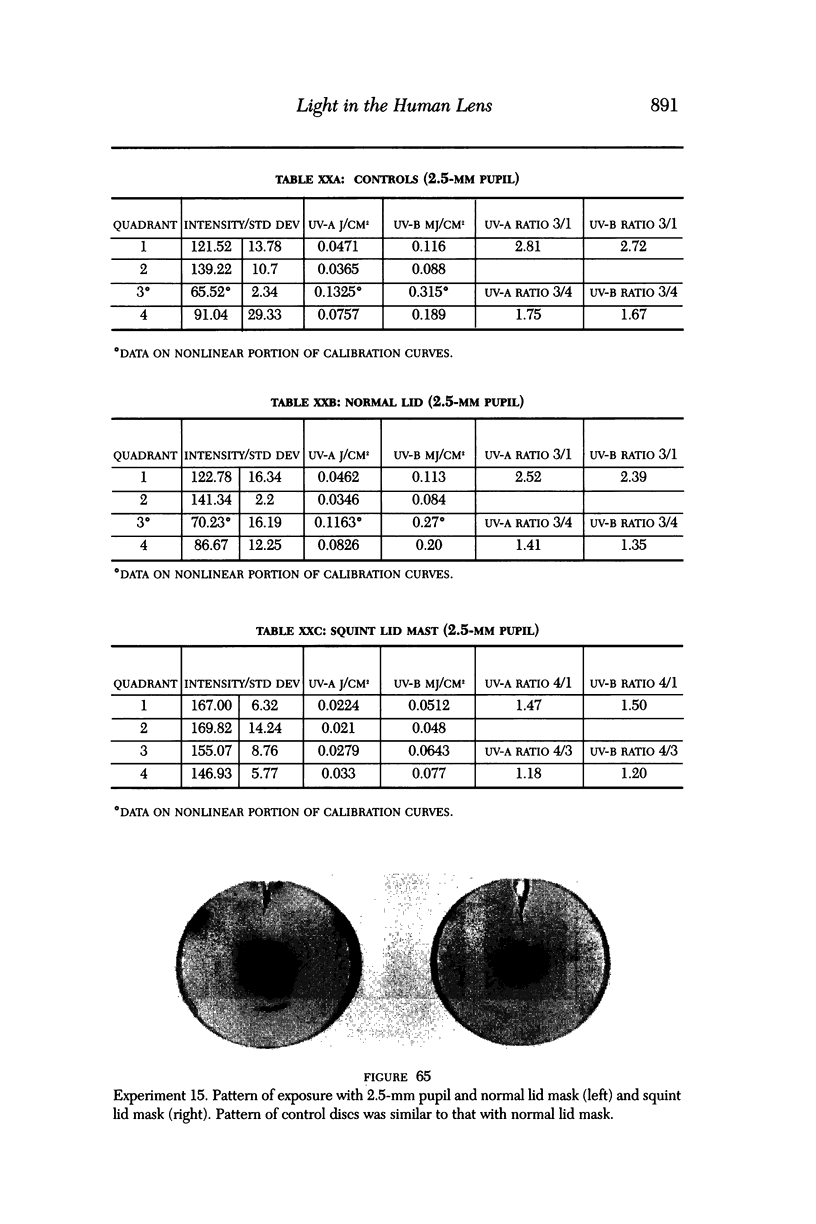
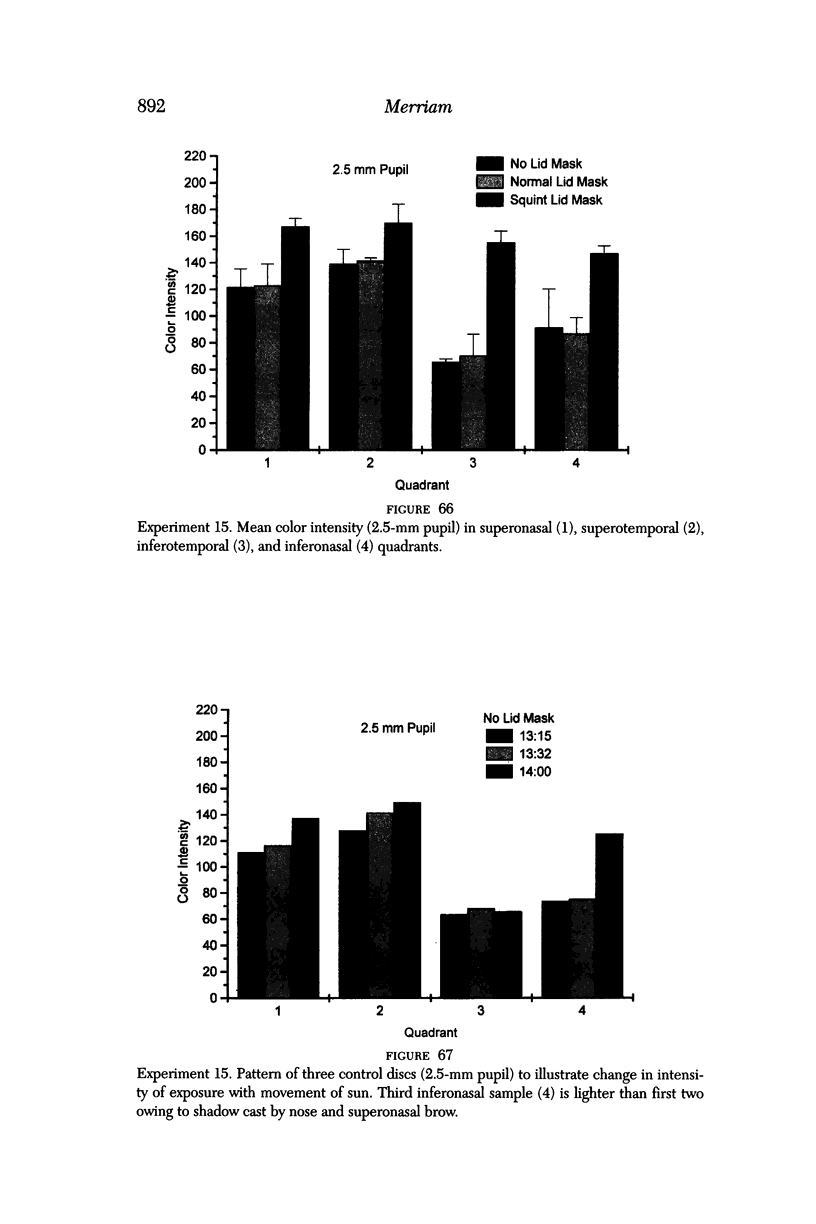
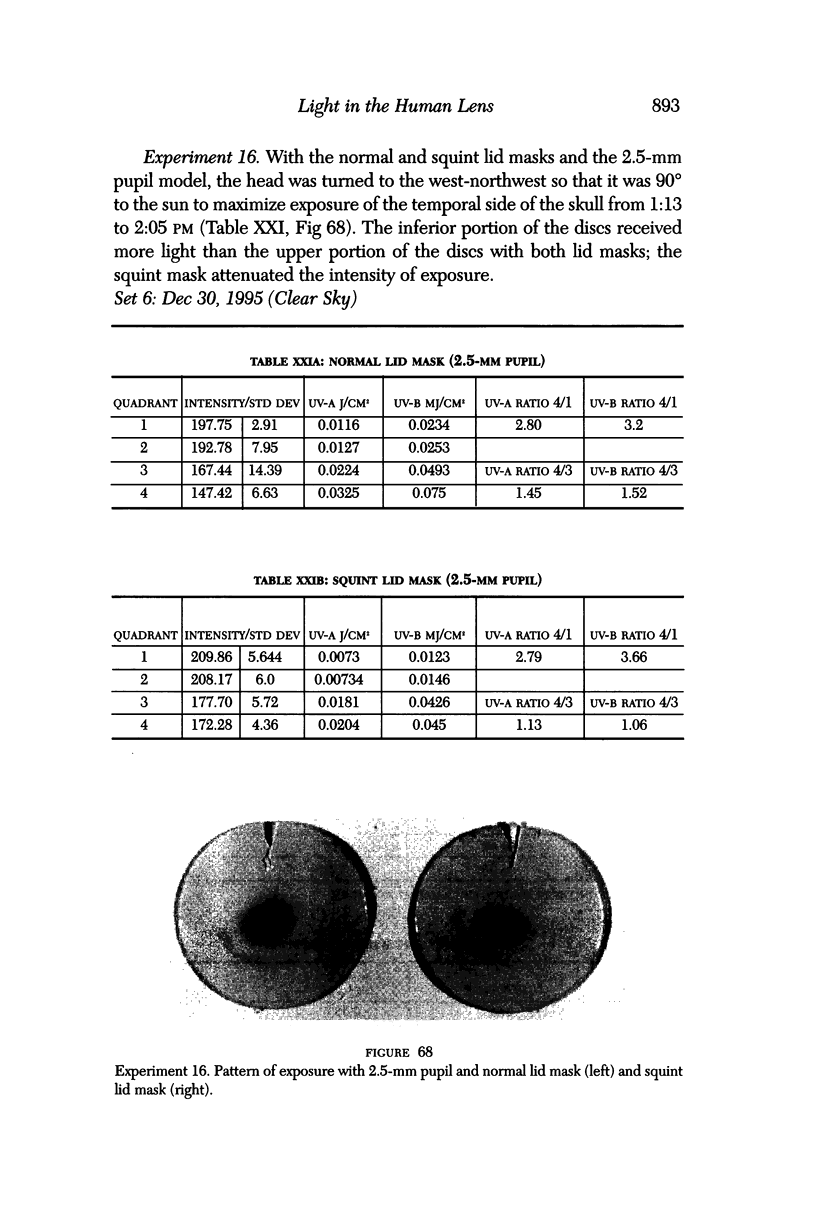
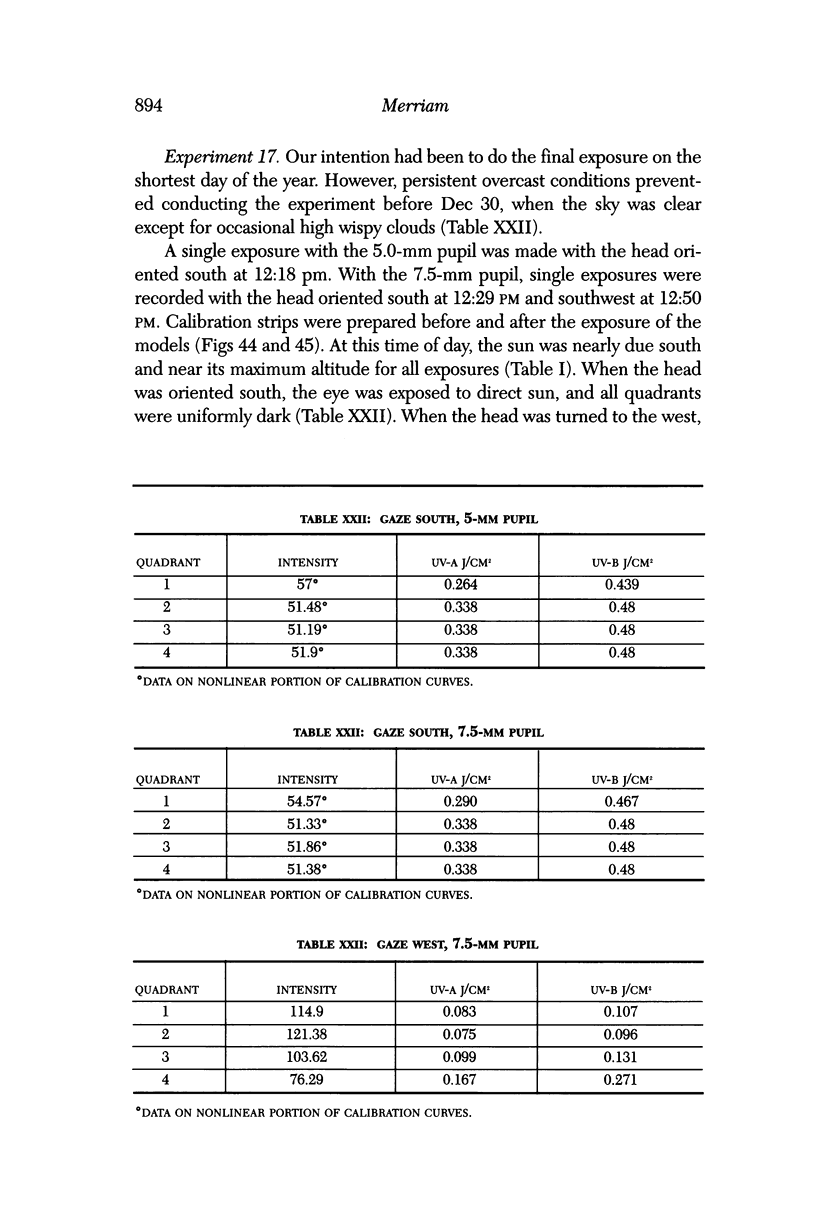
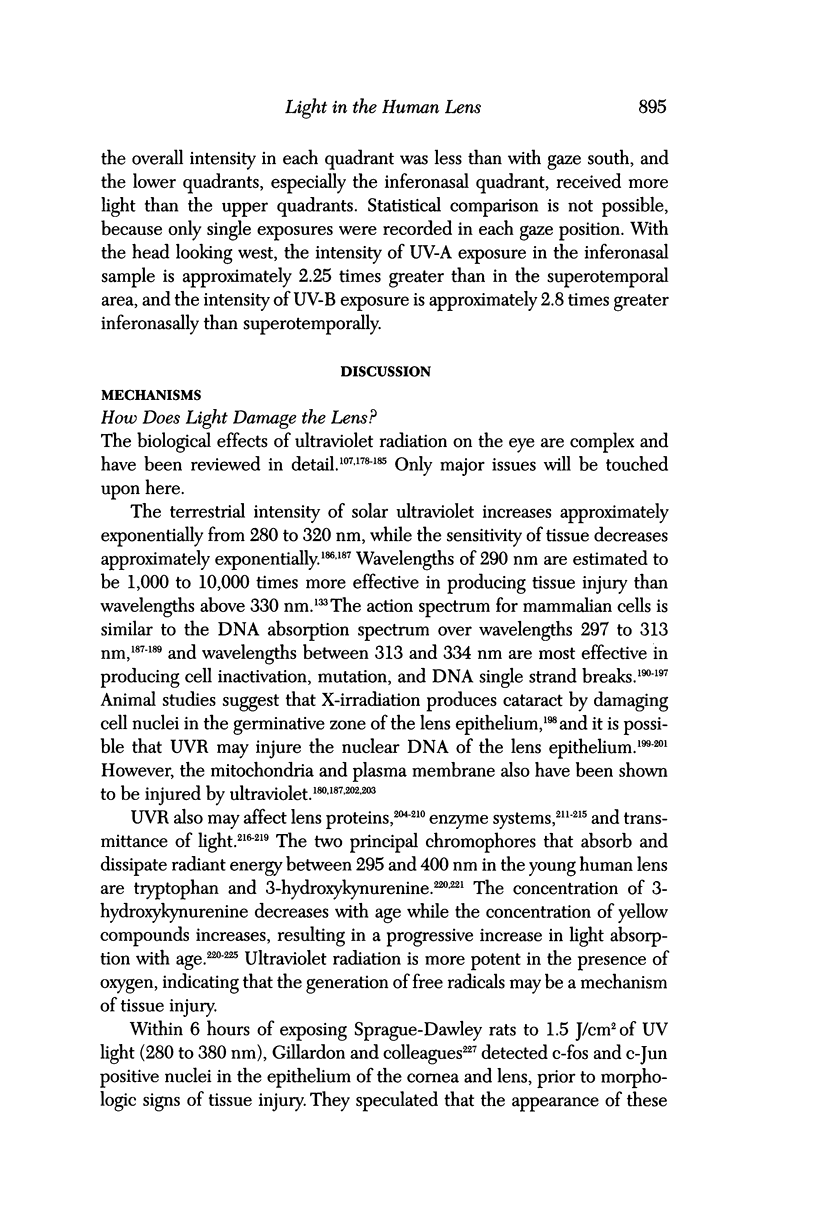
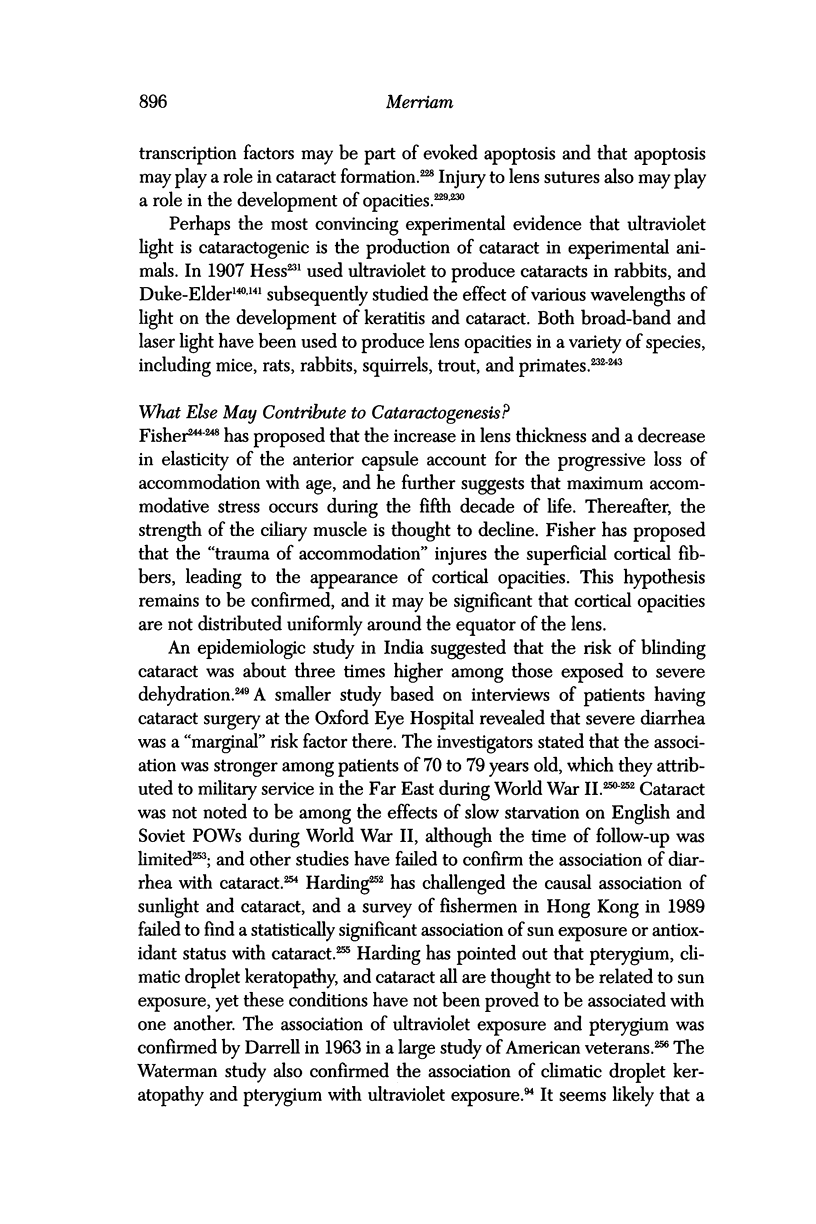
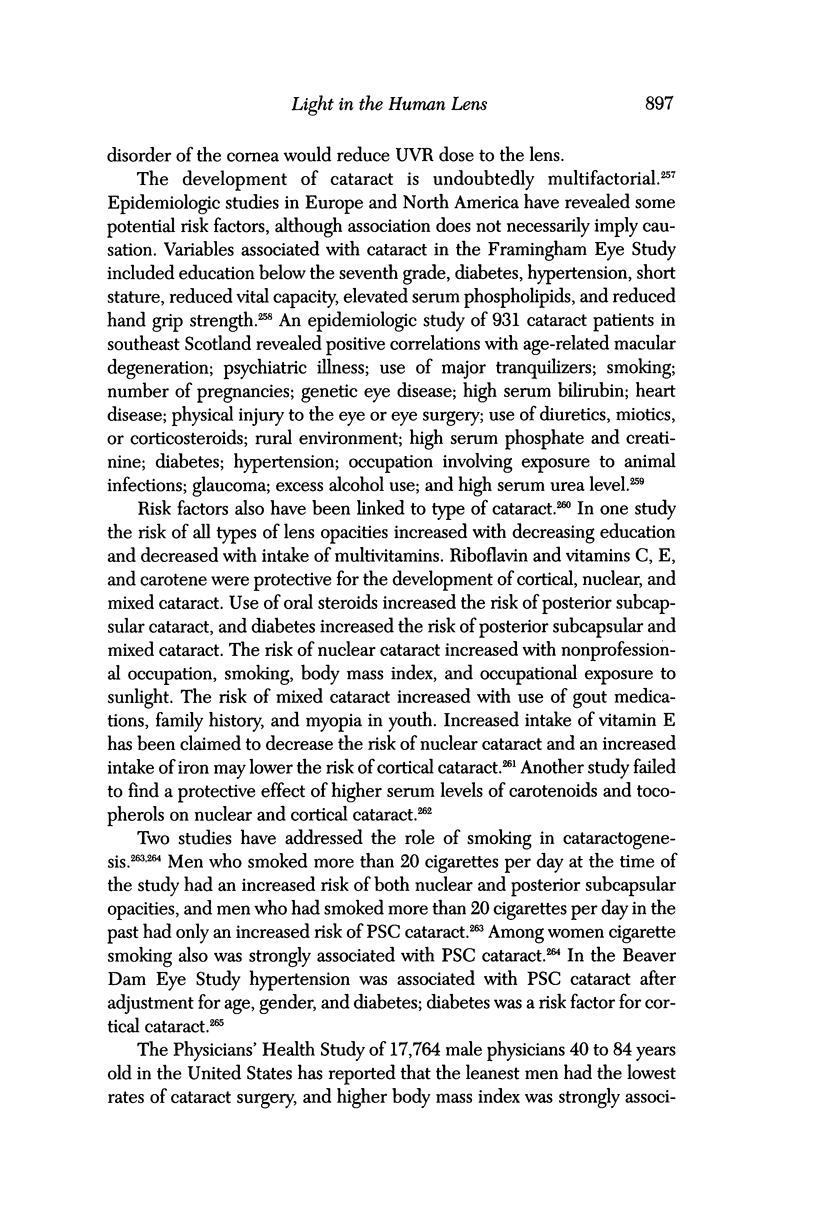
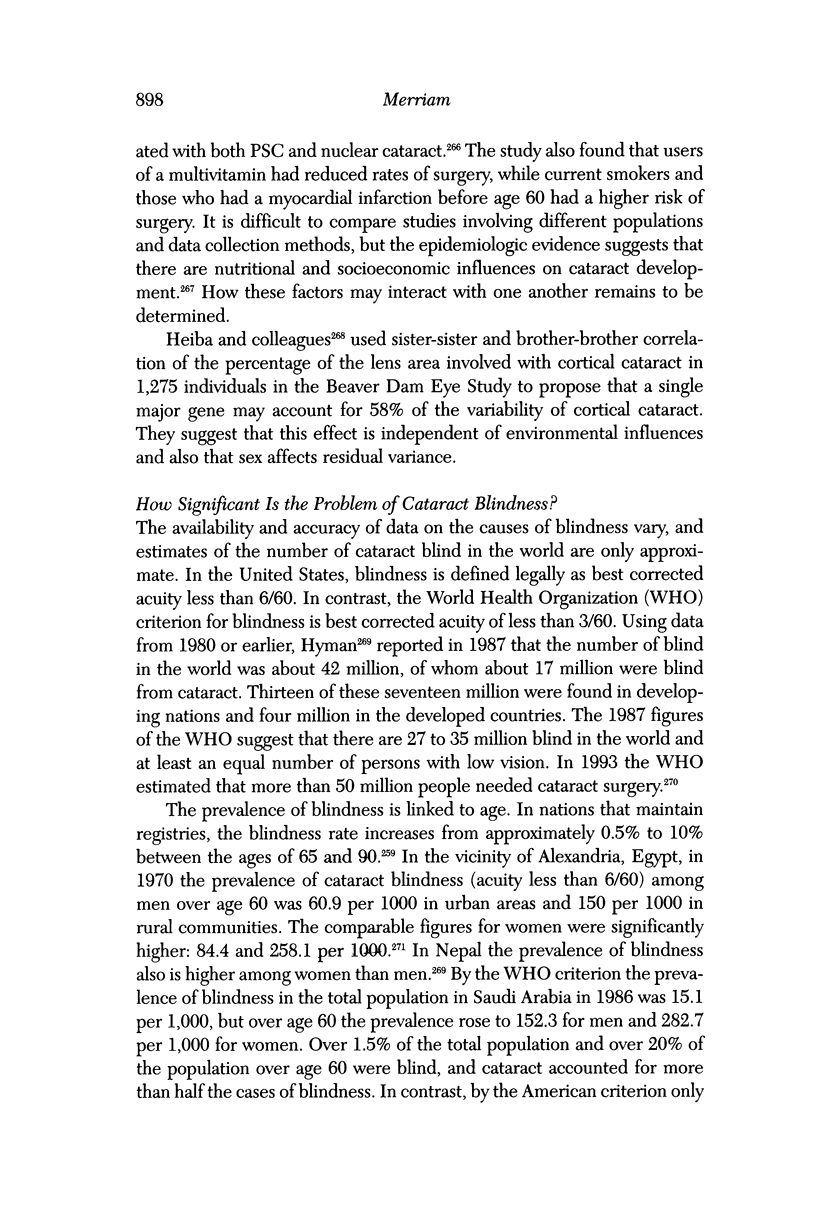
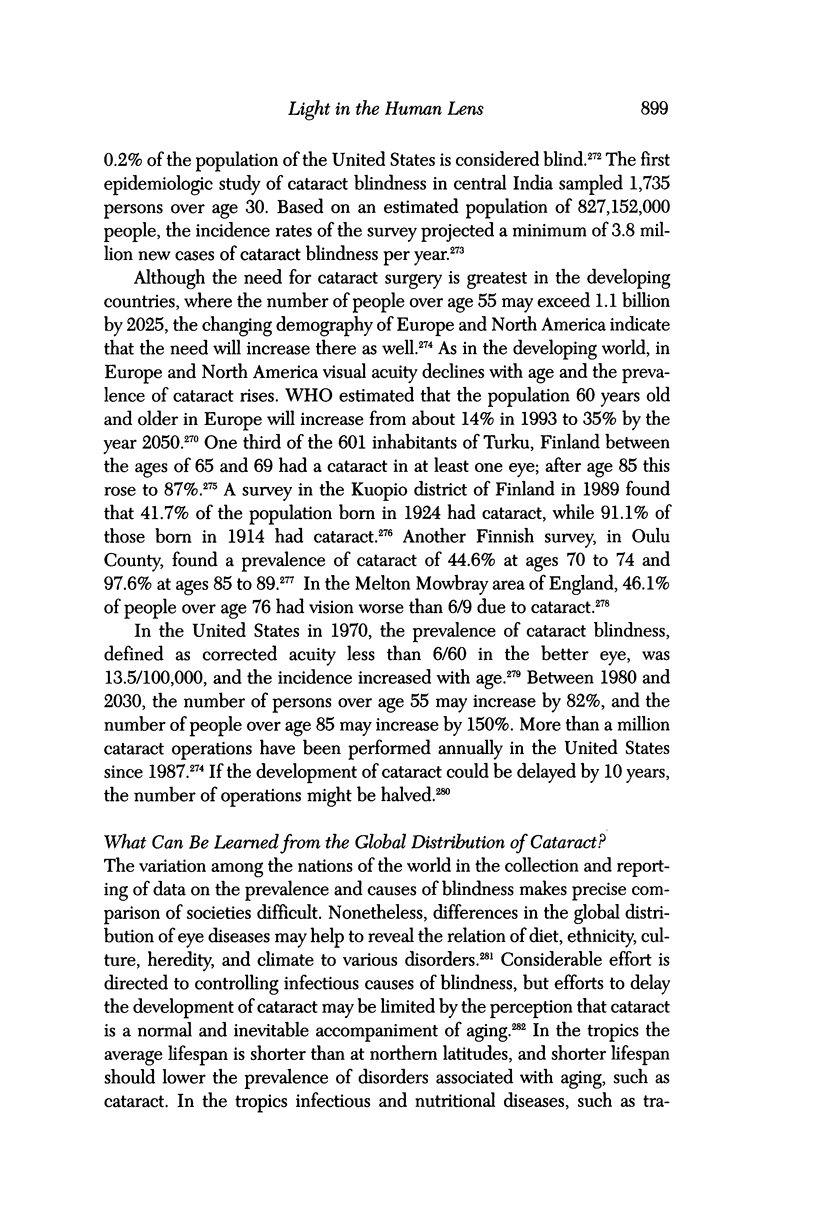
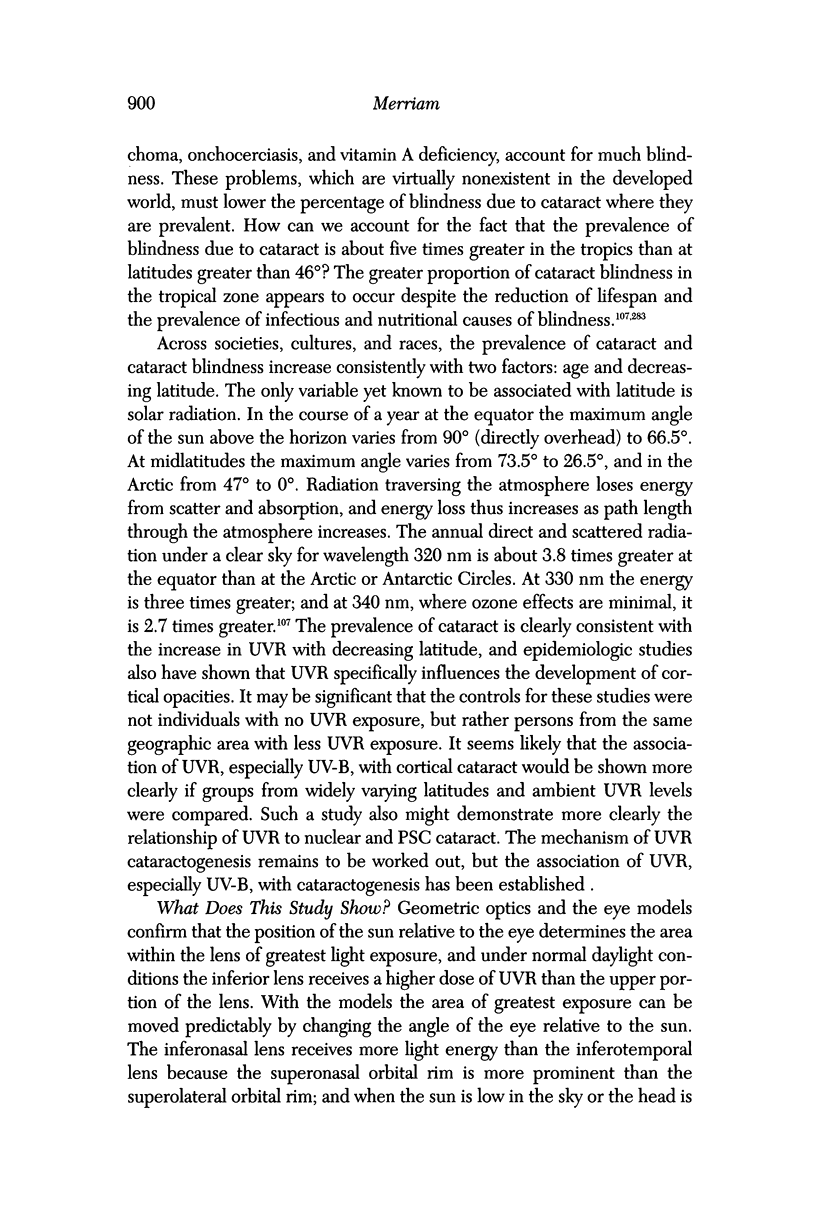
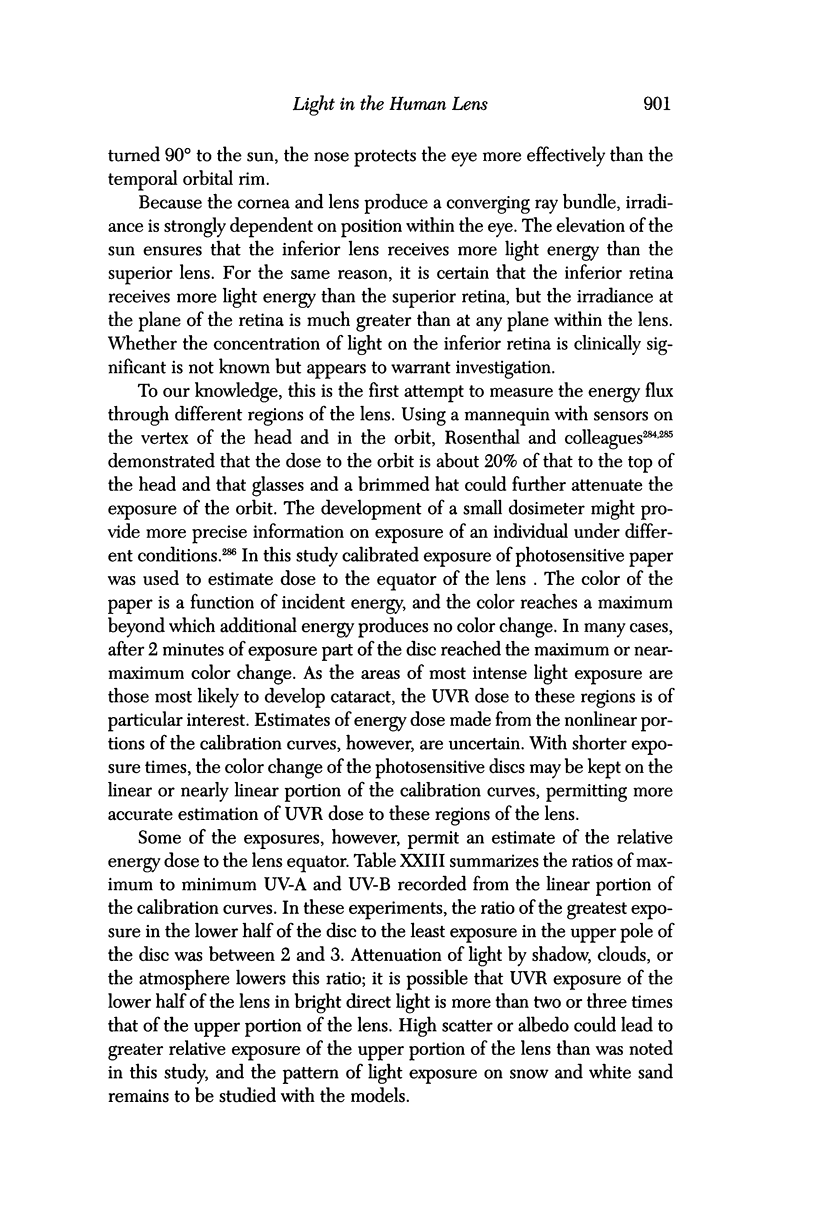
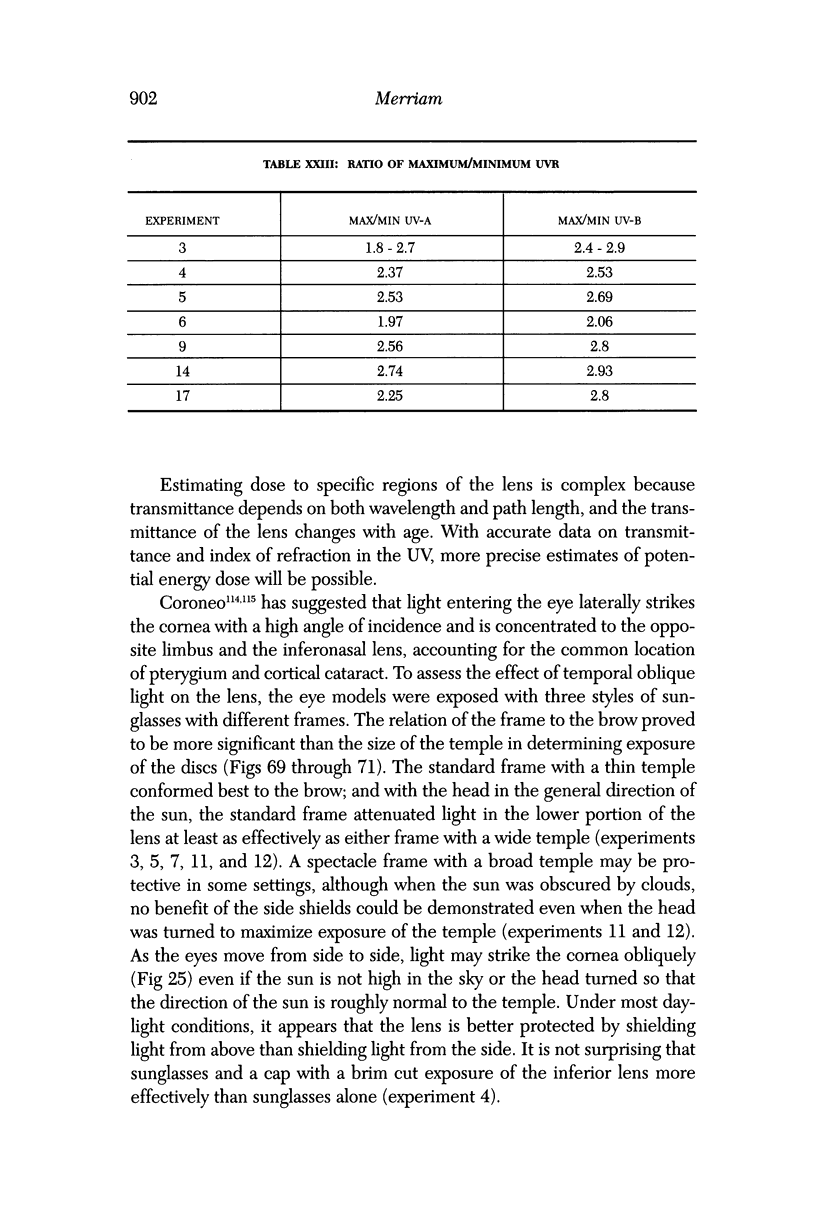
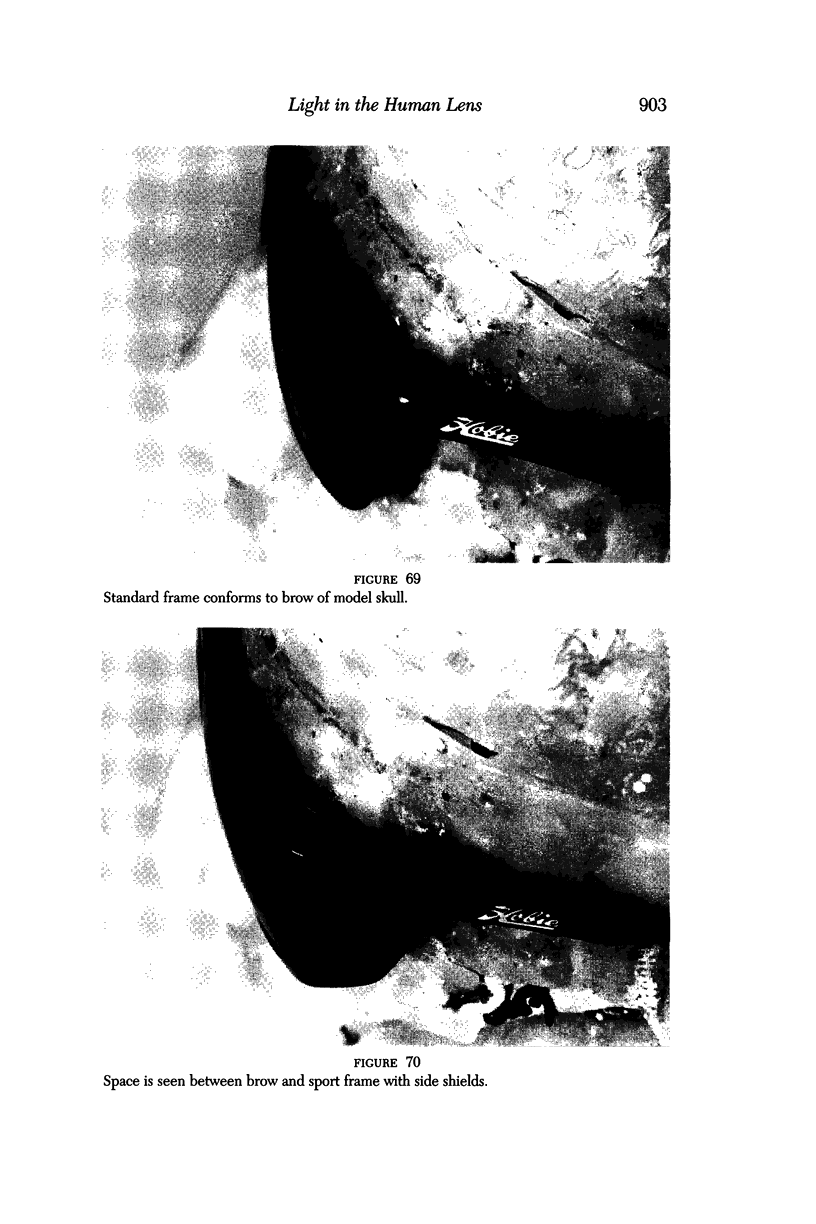
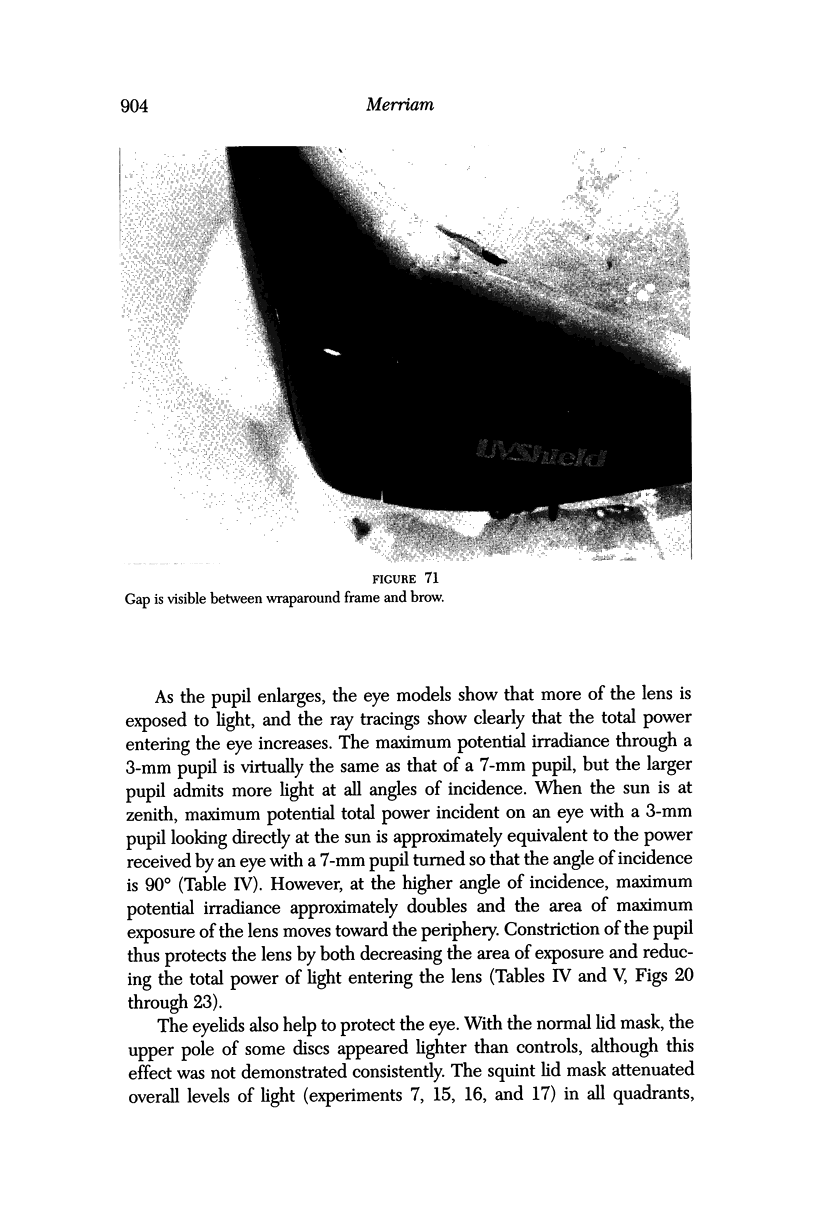
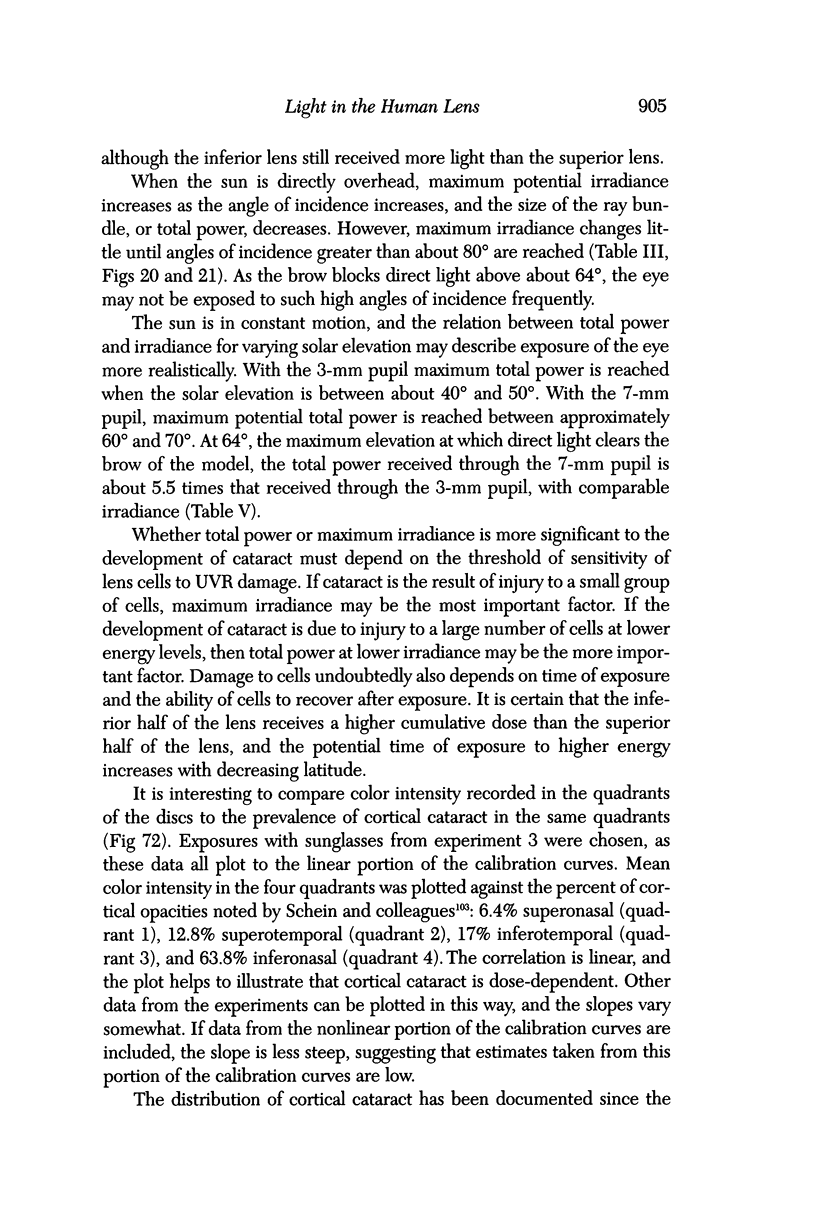
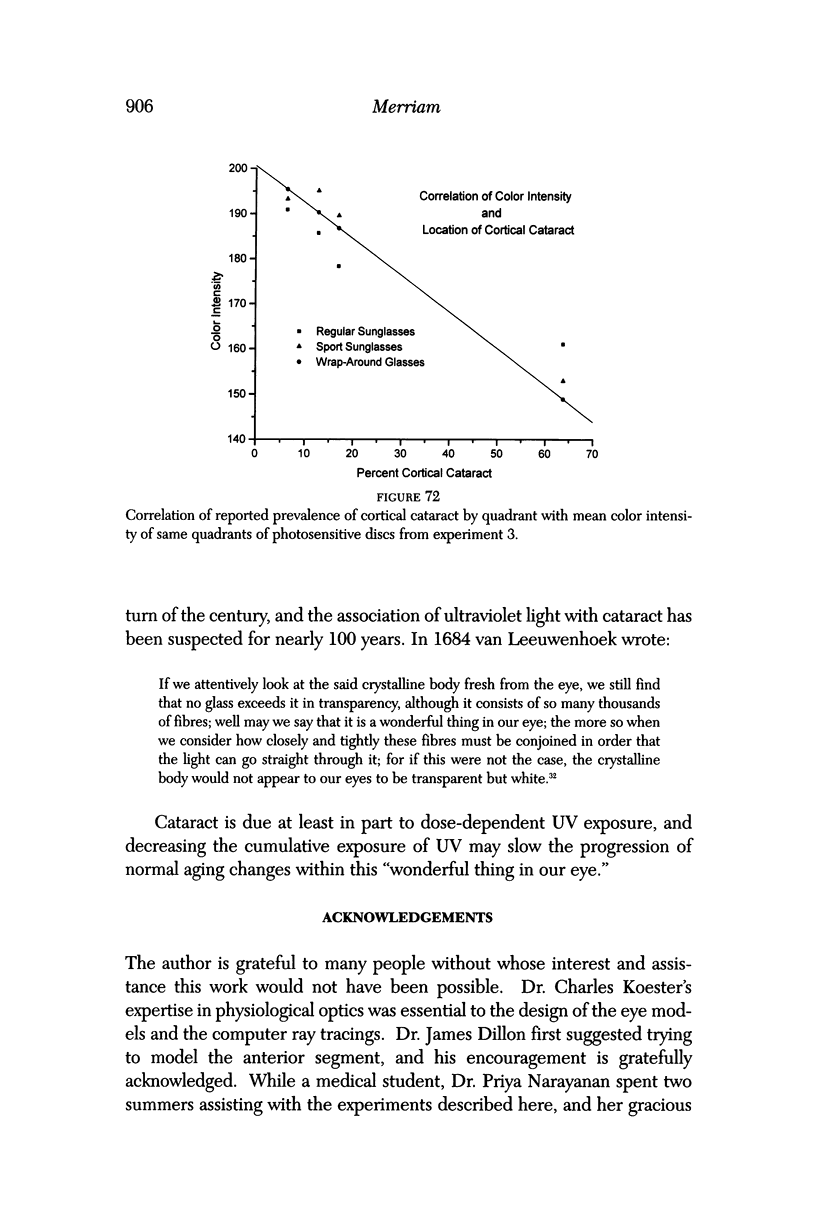
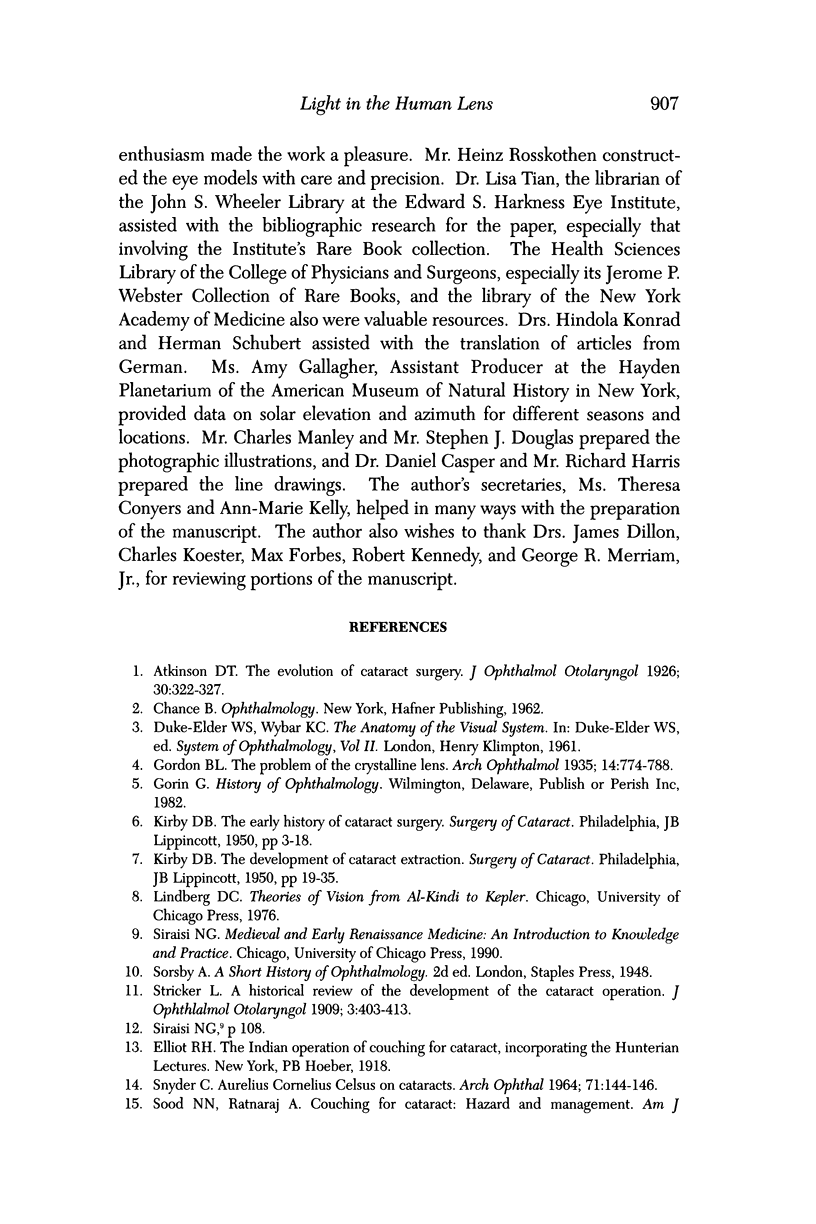
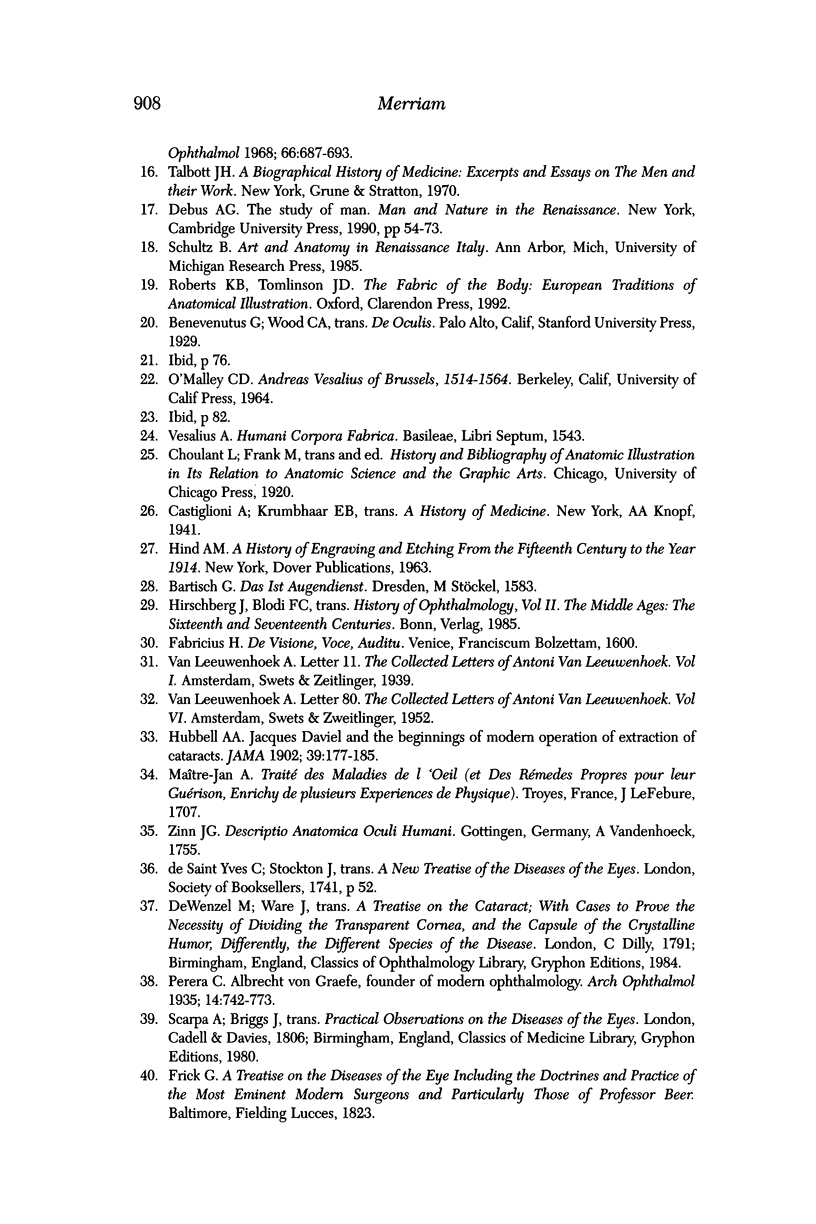
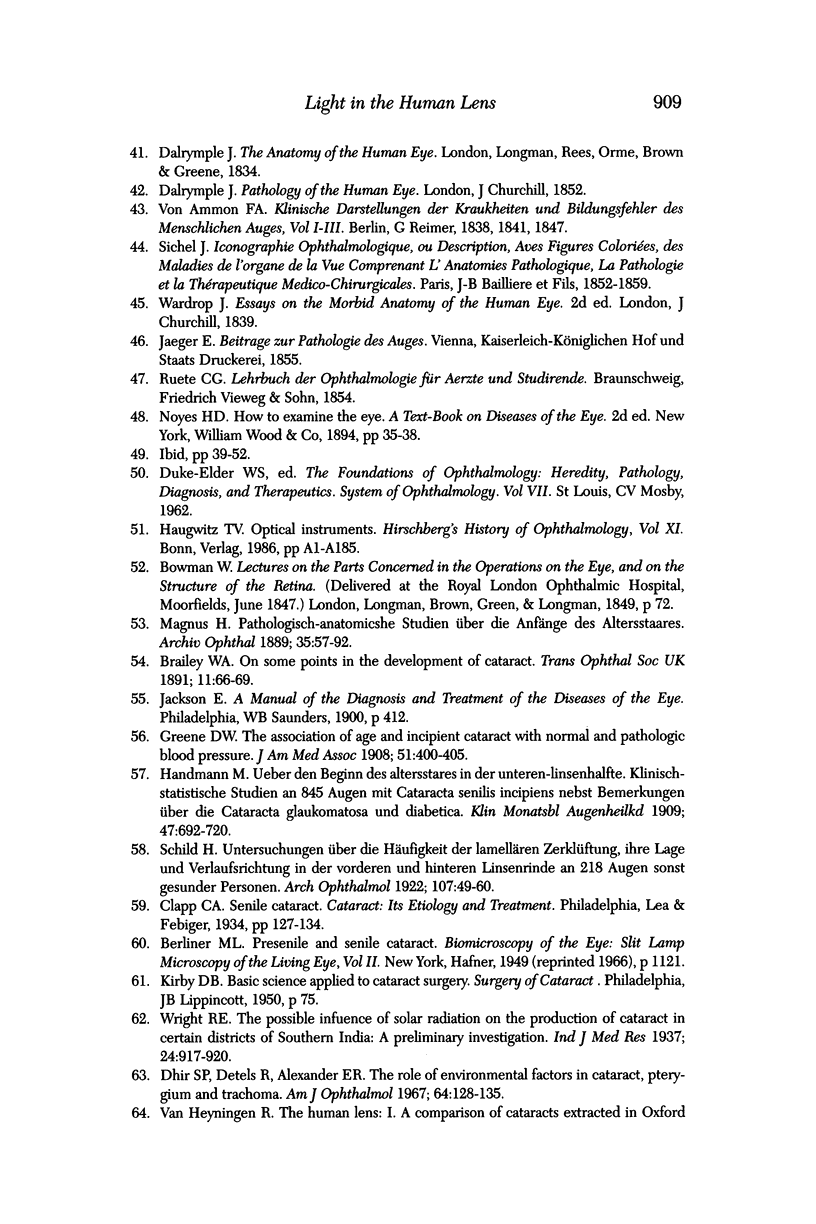
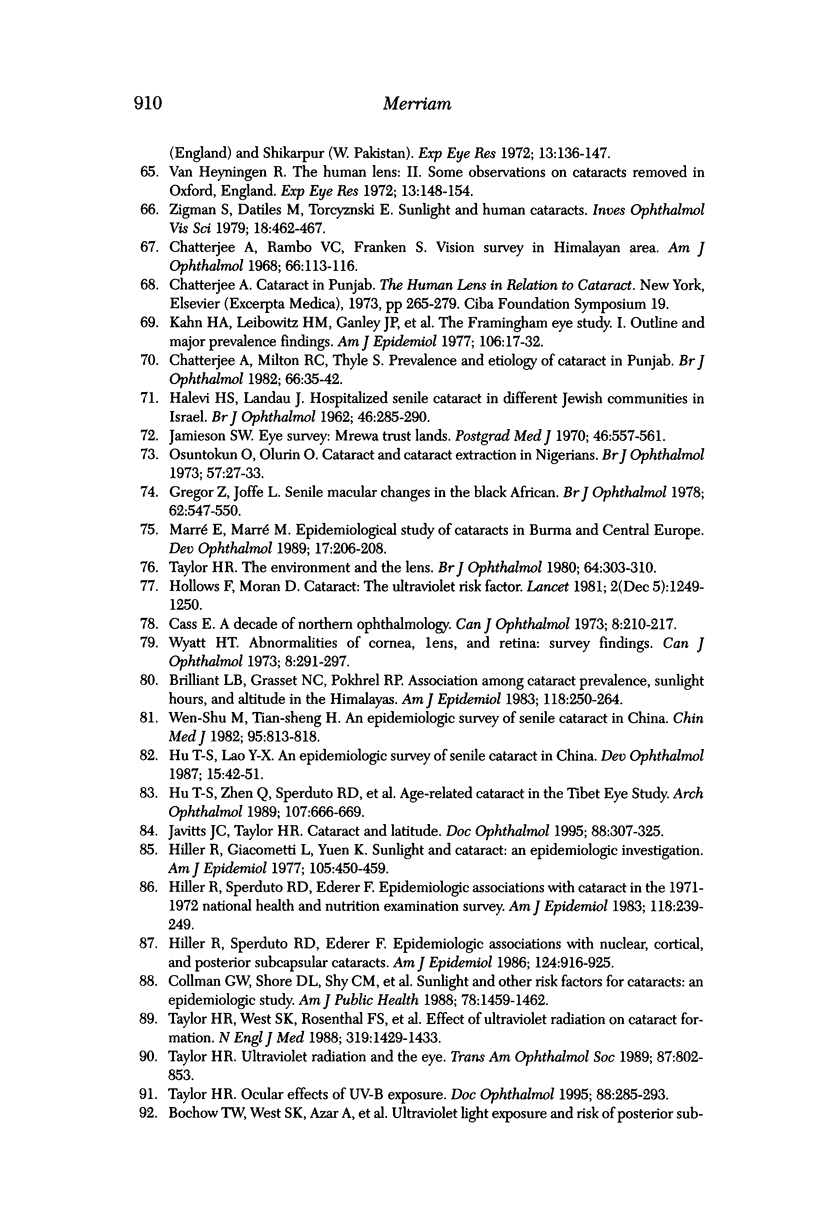
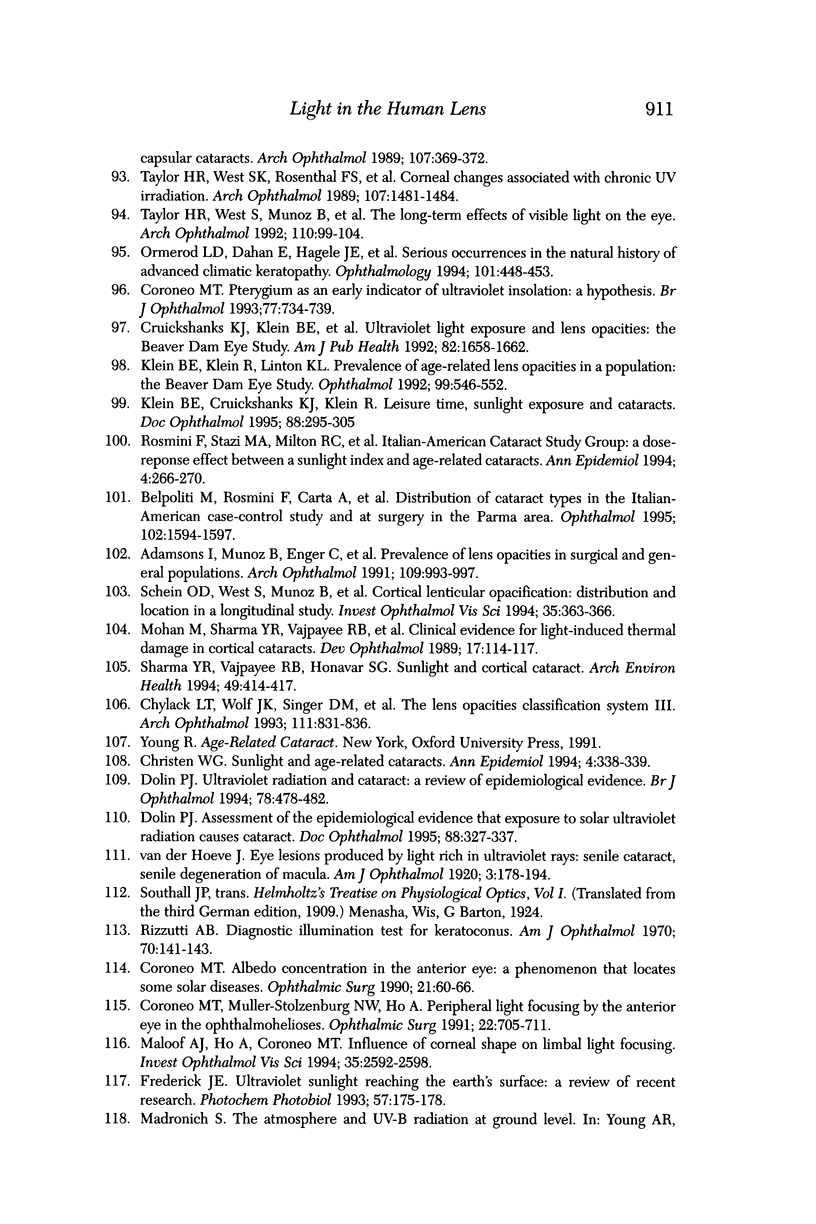
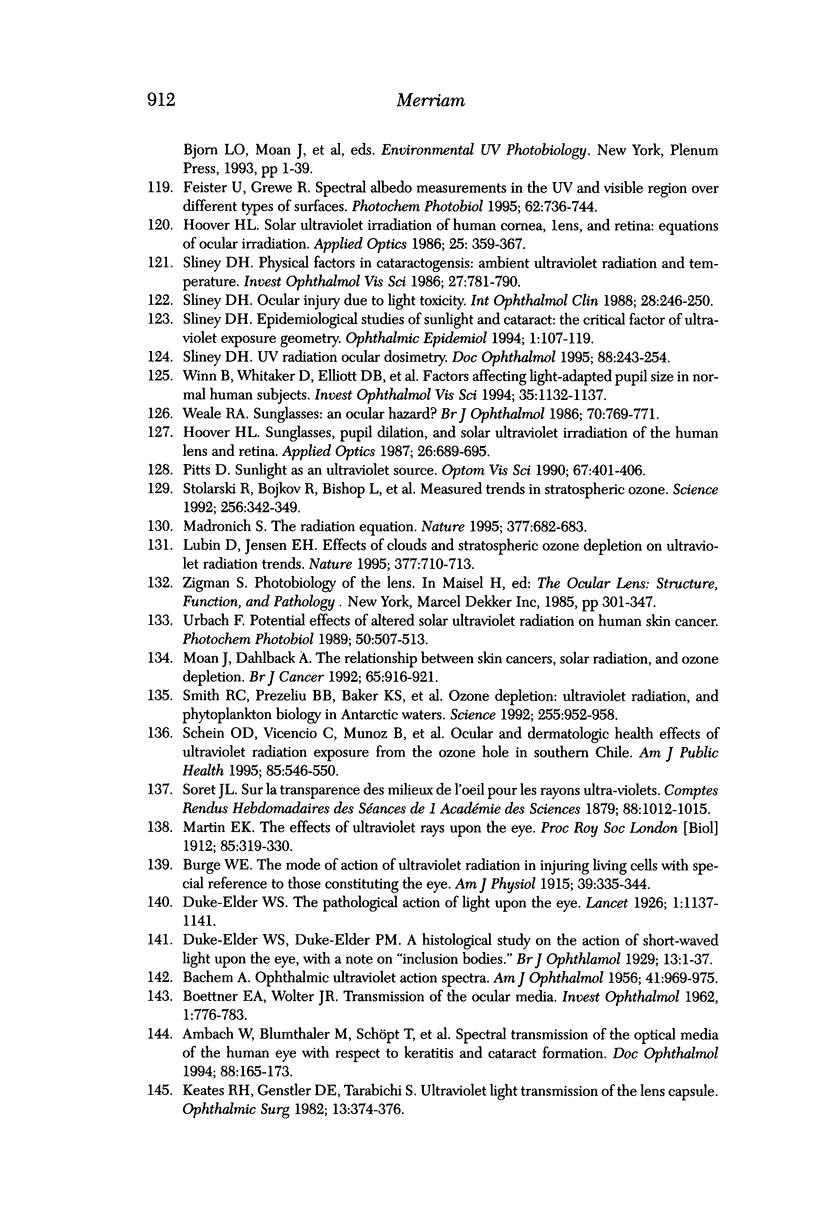
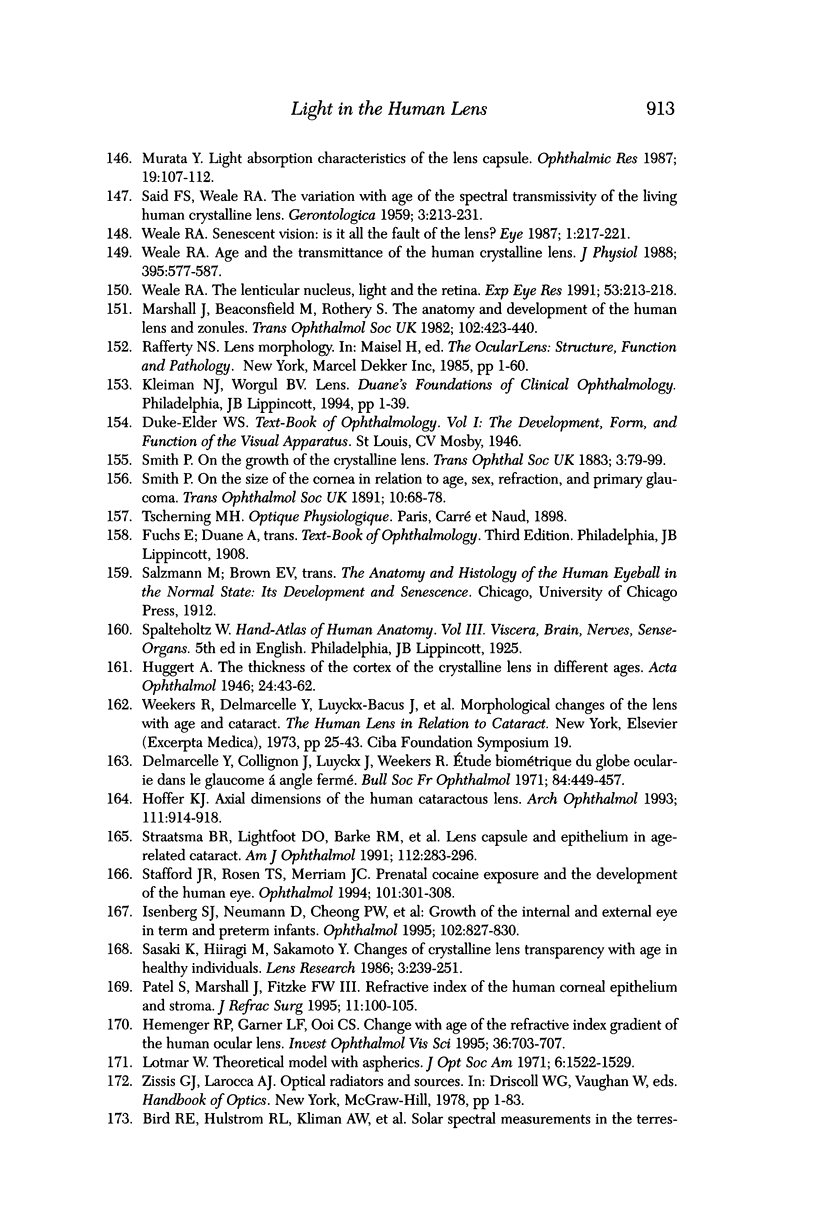
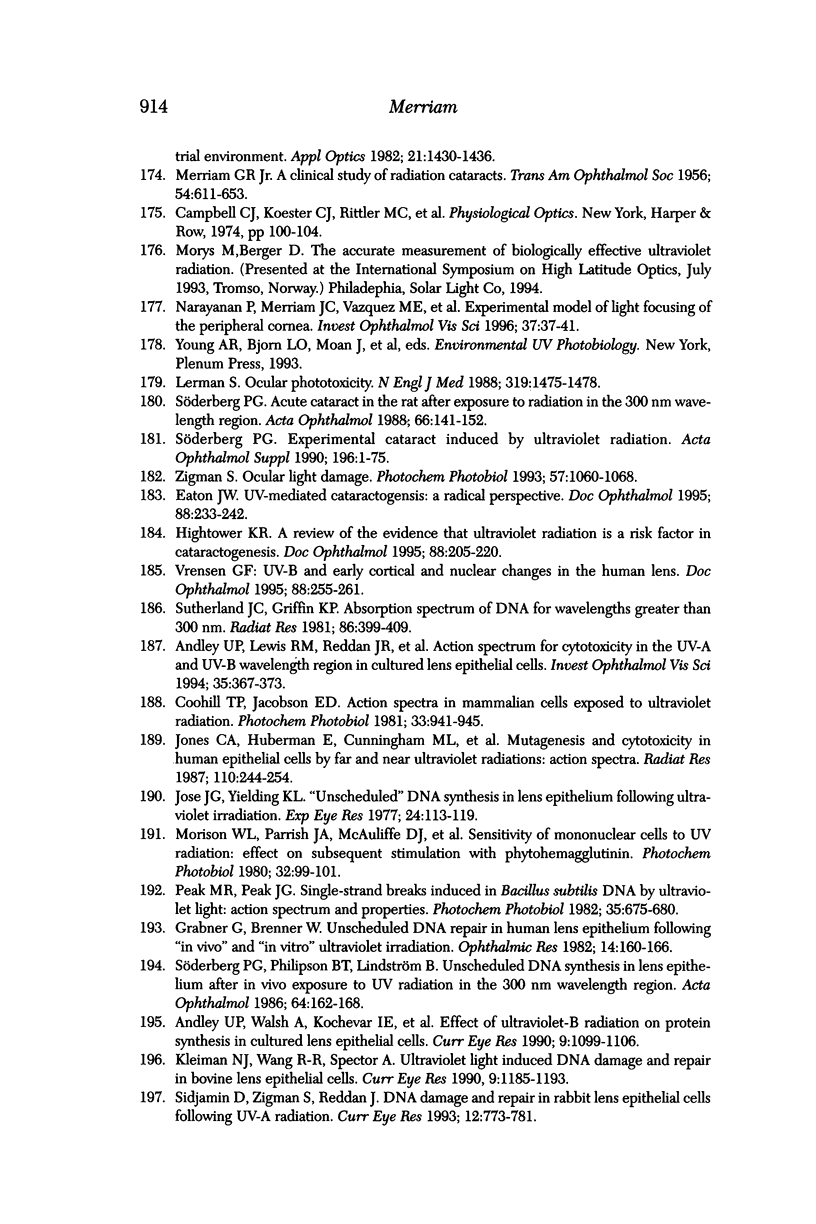
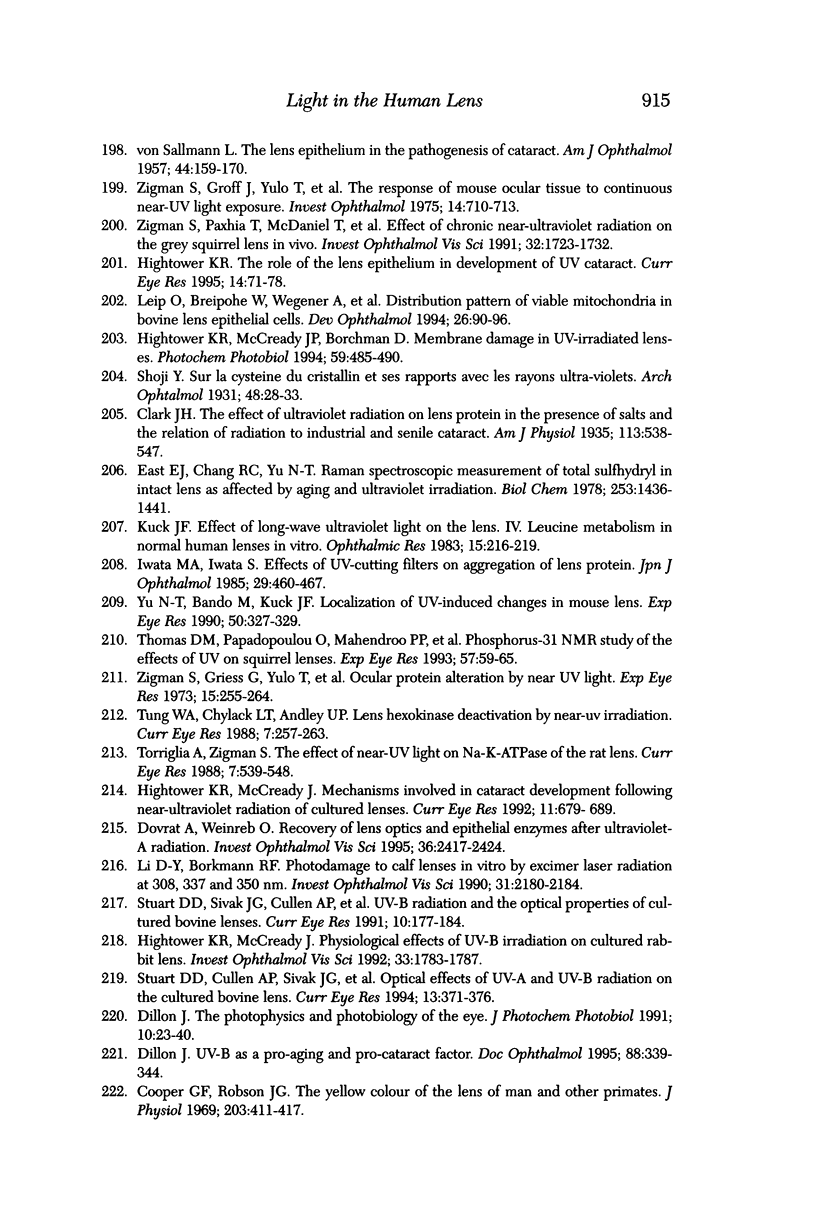
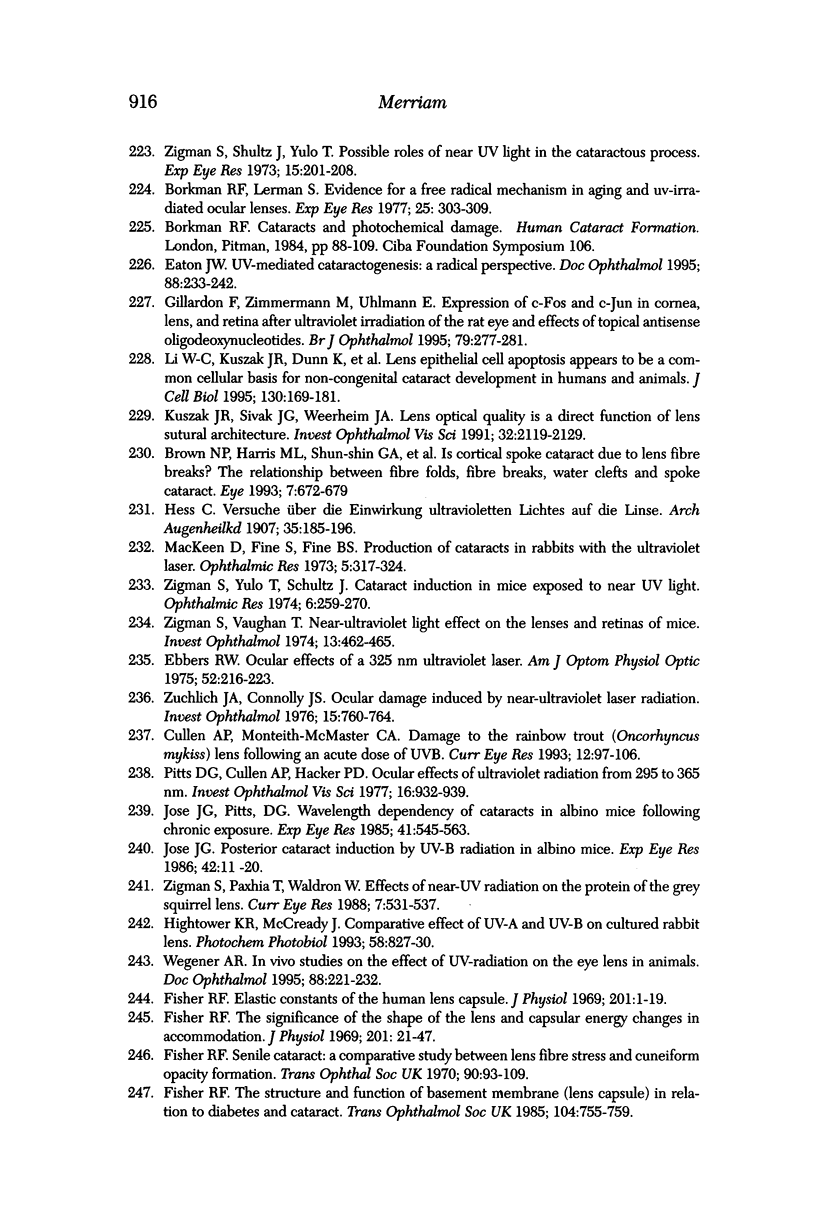
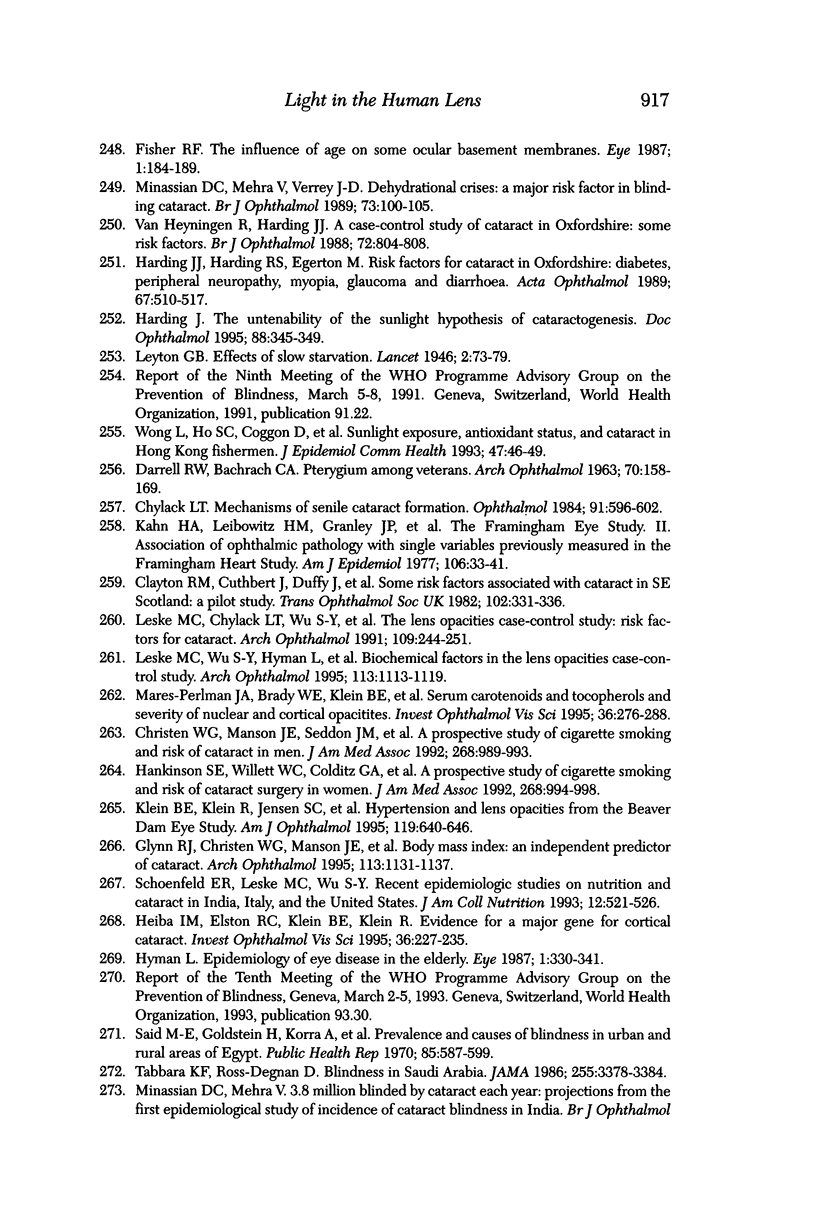
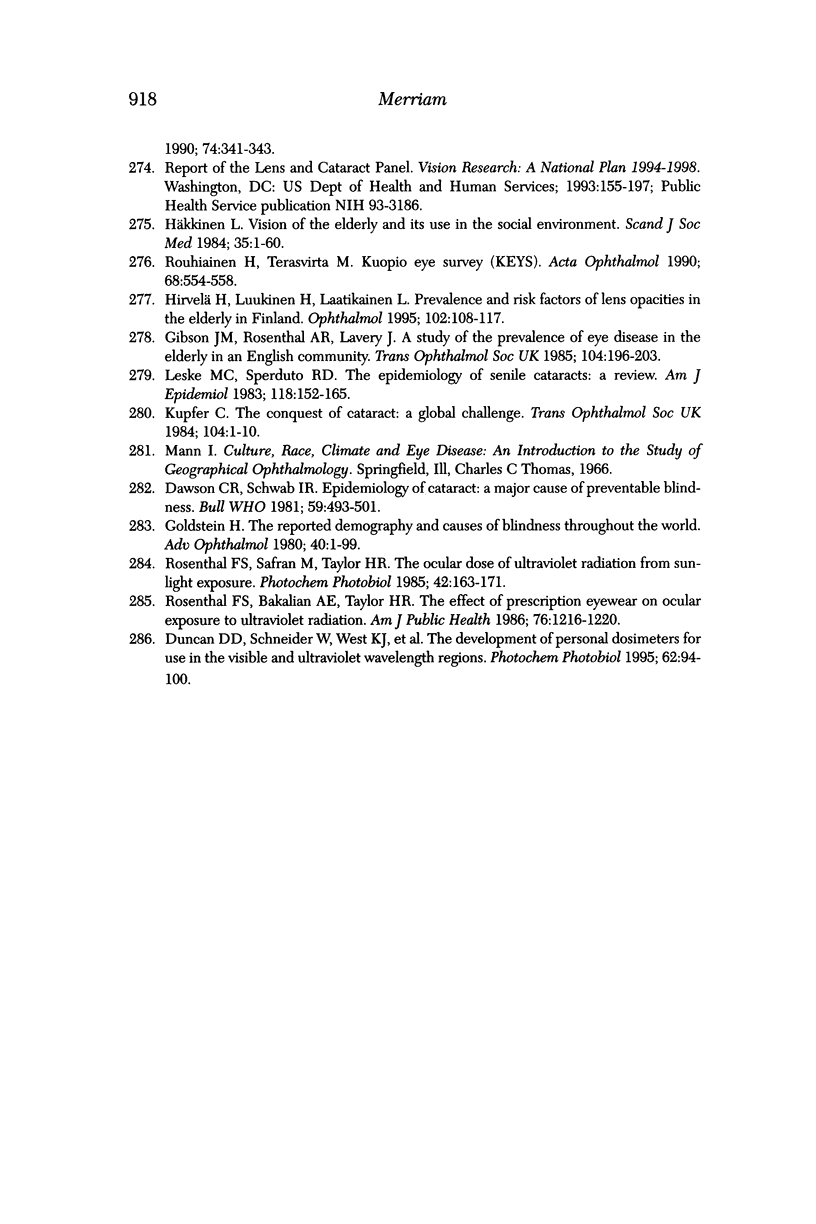
Images in this article
Selected References
These references are in PubMed. This may not be the complete list of references from this article.
- Adamsons I., Muñoz B., Enger C., Taylor H. R. Prevalence of lens opacities in surgical and general populations. Arch Ophthalmol. 1991 Jul;109(7):993–997. doi: 10.1001/archopht.1991.01080070105046. [DOI] [PubMed] [Google Scholar]
- Ambach W., Blumthaler M., Schöpf T., Ambach E., Katzgraber F., Daxecker F., Daxer A. Spectral transmission of the optical media of the human eye with respect to keratitis and cataract formation. Doc Ophthalmol. 1994;88(2):165–173. doi: 10.1007/BF01204614. [DOI] [PubMed] [Google Scholar]
- Andley U. P., Lewis R. M., Reddan J. R., Kochevar I. E. Action spectrum for cytotoxicity in the UVA- and UVB-wavelength region in cultured lens epithelial cells. Invest Ophthalmol Vis Sci. 1994 Feb;35(2):367–373. [PubMed] [Google Scholar]
- Andley U. P., Walsh A., Kochevar I. E., Reddan J. R. Effect of ultraviolet-B radiation on protein synthesis in cultured lens epithelial cells. Curr Eye Res. 1990 Nov;9(11):1099–1106. doi: 10.3109/02713689008997583. [DOI] [PubMed] [Google Scholar]
- BACHEM A. Ophthalmic ultraviolet action spectra. Am J Ophthalmol. 1956 Jun;41(6):969–975. doi: 10.1016/0002-9394(56)91044-3. [DOI] [PubMed] [Google Scholar]
- Belpoliti M., Rosmini F., Carta A., Ferrigno L., Maraini G. Distribution of cataract types in the Italian-American case-control study and at surgery in the Parma area. Ophthalmology. 1995 Nov;102(11):1594–1597. doi: 10.1016/s0161-6420(95)30823-8. [DOI] [PubMed] [Google Scholar]
- Bochow T. W., West S. K., Azar A., Munoz B., Sommer A., Taylor H. R. Ultraviolet light exposure and risk of posterior subcapsular cataracts. Arch Ophthalmol. 1989 Mar;107(3):369–372. doi: 10.1001/archopht.1989.01070010379027. [DOI] [PubMed] [Google Scholar]
- Borkman R. F. Cataracts and photochemical damage in the lens. Ciba Found Symp. 1984;106:88–109. doi: 10.1002/9780470720875.ch6. [DOI] [PubMed] [Google Scholar]
- Borkman R. F., Lerman S. Evidence for a free radical mechanism in aging and u.v.-irradiated ocular lenses. Exp Eye Res. 1977 Sep;25(3):303–309. doi: 10.1016/0014-4835(77)90097-5. [DOI] [PubMed] [Google Scholar]
- Brilliant L. B., Grasset N. C., Pokhrel R. P., Kolstad A., Lepkowski J. M., Brilliant G. E., Hawks W. N., Pararajasegaram R. Associations among cataract prevalence, sunlight hours, and altitude in the Himalayas. Am J Epidemiol. 1983 Aug;118(2):250–264. doi: 10.1093/oxfordjournals.aje.a113632. [DOI] [PubMed] [Google Scholar]
- Brown N. P., Harris M. L., Shun-Shin G. A., Vrensen G. F., Willekens B., Bron A. J. Is cortical spoke cataract due to lens fibre breaks? The relationship between fibre folds, fibre breaks, waterclefts and spoke cataract. Eye (Lond) 1993;7(Pt 5):672–679. doi: 10.1038/eye.1993.154. [DOI] [PubMed] [Google Scholar]
- Cass E. A decade of northern ophthalmology. Can J Ophthalmol. 1973 Apr;8(2):210–217. [PubMed] [Google Scholar]
- Chatterjee A., Milton R. C., Thyle S. Prevalence and aetiology of cataract in Punjab. Br J Ophthalmol. 1982 Jan;66(1):35–42. doi: 10.1136/bjo.66.1.35. [DOI] [PMC free article] [PubMed] [Google Scholar]
- Chatterjee A., Rambo V. C., Franken S. Vision survey in Himalayan area. Am J Ophthalmol. 1968 Jul;66(1):113–116. doi: 10.1016/0002-9394(68)91801-1. [DOI] [PubMed] [Google Scholar]
- Christen W. G., Manson J. E., Seddon J. M., Glynn R. J., Buring J. E., Rosner B., Hennekens C. H. A prospective study of cigarette smoking and risk of cataract in men. JAMA. 1992 Aug 26;268(8):989–993. [PubMed] [Google Scholar]
- Christen W. G. Sunlight and age-related cataracts. Ann Epidemiol. 1994 Jul;4(4):338–339. doi: 10.1016/1047-2797(94)90092-2. [DOI] [PubMed] [Google Scholar]
- Chylack L. T., Jr Mechanisms of senile cataract formation. Ophthalmology. 1984 Jun;91(6):596–602. doi: 10.1016/s0161-6420(84)34252-x. [DOI] [PubMed] [Google Scholar]
- Chylack L. T., Jr, Wolfe J. K., Singer D. M., Leske M. C., Bullimore M. A., Bailey I. L., Friend J., McCarthy D., Wu S. Y. The Lens Opacities Classification System III. The Longitudinal Study of Cataract Study Group. Arch Ophthalmol. 1993 Jun;111(6):831–836. doi: 10.1001/archopht.1993.01090060119035. [DOI] [PubMed] [Google Scholar]
- Clayton R. M., Cuthbert J., Duffy J., Seth J., Phillips C. I., Bartholomew R. S., Reid J. M. Some risk factors associated with cataract in S.E. Scotland: a pilot study. Trans Ophthalmol Soc U K. 1982;102(Pt 3):331–336. [PubMed] [Google Scholar]
- Collman G. W., Shore D. L., Shy C. M., Checkoway H., Luria A. S. Sunlight and other risk factors for cataracts: an epidemiologic study. Am J Public Health. 1988 Nov;78(11):1459–1462. doi: 10.2105/ajph.78.11.1459. [DOI] [PMC free article] [PubMed] [Google Scholar]
- Coohill T. P., Jacobson E. D. Action spectra in mammalian cells exposed to ultraviolet radiation. Photochem Photobiol. 1981 Jun;33(6):941–945. doi: 10.1111/j.1751-1097.1981.tb05518.x. [DOI] [PubMed] [Google Scholar]
- Cooper G. F., Robson J. G. The yellow colour of the lens of man and other primates. J Physiol. 1969 Aug;203(2):411–417. doi: 10.1113/jphysiol.1969.sp008871. [DOI] [PMC free article] [PubMed] [Google Scholar]
- Coroneo M. T. Albedo concentration in the anterior eye: a phenomenon that locates some solar diseases. Ophthalmic Surg. 1990 Jan;21(1):60–66. [PubMed] [Google Scholar]
- Coroneo M. T., Müller-Stolzenburg N. W., Ho A. Peripheral light focusing by the anterior eye and the ophthalmohelioses. Ophthalmic Surg. 1991 Dec;22(12):705–711. [PubMed] [Google Scholar]
- Coroneo M. T. Pterygium as an early indicator of ultraviolet insolation: a hypothesis. Br J Ophthalmol. 1993 Nov;77(11):734–739. doi: 10.1136/bjo.77.11.734. [DOI] [PMC free article] [PubMed] [Google Scholar]
- Cruickshanks K. J., Klein B. E., Klein R. Ultraviolet light exposure and lens opacities: the Beaver Dam Eye Study. Am J Public Health. 1992 Dec;82(12):1658–1662. doi: 10.2105/ajph.82.12.1658. [DOI] [PMC free article] [PubMed] [Google Scholar]
- Cullen A. P., Monteith-McMaster C. A. Damage to the rainbow trout (Oncorhyncus mykiss) lens following an acute dose of UVB. Curr Eye Res. 1993 Feb;12(2):97–106. doi: 10.3109/02713689308999477. [DOI] [PubMed] [Google Scholar]
- DARRELL R. W., BACHRACH C. A. PTERYGIUM AMONG VETERANS. AN EPIDEMIOLOGIC STUDY SHOWING A CORRELATION BETWEEN FREQUENCY OF PTERYGIUM AND DEGREE OF EXPOSURE OF ULTRAVIOLET IN SUNLIGHT. Arch Ophthalmol. 1963 Aug;70:158–169. doi: 10.1001/archopht.1963.00960050160004. [DOI] [PubMed] [Google Scholar]
- Dawson C. R., Schwab I. R. Epidemiology of cataract - a major cause of preventable blindness. Bull World Health Organ. 1981;59(4):493–501. [PMC free article] [PubMed] [Google Scholar]
- Dhir S. P., Detels R., Alexander E. R. The role of environmental factors in cataract, pterygium and trachoma. Am J Ophthalmol. 1967 Jul;64(1):128–135. doi: 10.1016/0002-9394(67)93353-3. [DOI] [PubMed] [Google Scholar]
- Dillon J. The photophysics and photobiology of the eye. J Photochem Photobiol B. 1991 Jul;10(1-2):23–40. doi: 10.1016/1011-1344(91)80209-z. [DOI] [PubMed] [Google Scholar]
- Dillon J. UV-B as a pro-aging and pro-cataract factor. Doc Ophthalmol. 1994;88(3-4):339–344. doi: 10.1007/BF01203686. [DOI] [PubMed] [Google Scholar]
- Dolin P. J. Assessment of epidemiological evidence that exposure to solar ultraviolet radiation causes cataract. Doc Ophthalmol. 1994;88(3-4):327–337. doi: 10.1007/BF01203685. [DOI] [PubMed] [Google Scholar]
- Dolin P. J. Ultraviolet radiation and cataract: a review of the epidemiological evidence. Br J Ophthalmol. 1994 Jun;78(6):478–482. doi: 10.1136/bjo.78.6.478. [DOI] [PMC free article] [PubMed] [Google Scholar]
- Dovrat A., Weinreb O. Recovery of lens optics and epithelial enzymes after ultraviolet A radiation. Invest Ophthalmol Vis Sci. 1995 Nov;36(12):2417–2424. [PubMed] [Google Scholar]
- Duke-Elder W. S., Duke-Elder P. M. A HISTOLOGICAL STUDY ON THE ACTION OF SHORT-WAVED LIGHT UPON THE EYE, WITH A NOTE ON "INCLUSION BODIES". Br J Ophthalmol. 1929 Jan;13(1):1–37. doi: 10.1136/bjo.13.1.1. [DOI] [PMC free article] [PubMed] [Google Scholar]
- Duncan D. D., Schneider W., West K. J., Kirkpatrick S. J., West S. K. The development of personal dosimeters for use in the visible and ultraviolet wavelengths regions. The Salisbury Eye Evaluation Team. Photochem Photobiol. 1995 Jul;62(1):94–100. doi: 10.1111/j.1751-1097.1995.tb05244.x. [DOI] [PubMed] [Google Scholar]
- East E. J., Chang R. C., Yu N. T., Kuck J. F., Jr Raman spectroscopic measurement of total sulfhydryl in intact lens as affected by aging and ultraviolet irradiation. Deuterium exchange as a probe for accessible sulfhydryl in living tissue. J Biol Chem. 1978 Mar 10;253(5):1436–1441. [PubMed] [Google Scholar]
- Eaton J. W. UV-mediated cataractogenesis: a radical perspective. Doc Ophthalmol. 1994;88(3-4):233–242. doi: 10.1007/BF01203677. [DOI] [PubMed] [Google Scholar]
- Eaton J. W. UV-mediated cataractogenesis: a radical perspective. Doc Ophthalmol. 1994;88(3-4):233–242. doi: 10.1007/BF01203677. [DOI] [PubMed] [Google Scholar]
- Ebbers R. W., Sears D. Ocular effects of a 325 NM ultraviolet laser. Am J Optom Physiol Opt. 1975 Mar;52(3):216–223. doi: 10.1097/00006324-197503000-00006. [DOI] [PubMed] [Google Scholar]
- Fisher R. F. Elastic constants of the human lens capsule. J Physiol. 1969 Mar;201(1):1–19. doi: 10.1113/jphysiol.1969.sp008739. [DOI] [PMC free article] [PubMed] [Google Scholar]
- Fisher R. F. Senile cataract. A comparative study between lens fibre stress and cuneiform opacity formation. Trans Ophthalmol Soc U K. 1970;90:93–109. [PubMed] [Google Scholar]
- Fisher R. F. The influence of age on some ocular basement membranes. Eye (Lond) 1987;1(Pt 2):184–189. doi: 10.1038/eye.1987.35. [DOI] [PubMed] [Google Scholar]
- Fisher R. F. The significance of the shape of the lens and capsular energy changes in accommodation. J Physiol. 1969 Mar;201(1):21–47. doi: 10.1113/jphysiol.1969.sp008740. [DOI] [PMC free article] [PubMed] [Google Scholar]
- Fisher R. F. The structure and function of basement membrane (lens capsule) in relation to diabetes and cataract. Trans Ophthalmol Soc U K. 1985;104(Pt 7):755–759. [PubMed] [Google Scholar]
- Gibson J. M., Rosenthal A. R., Lavery J. A study of the prevalence of eye disease in the elderly in an English community. Trans Ophthalmol Soc U K. 1985;104(Pt 2):196–203. [PubMed] [Google Scholar]
- Gillardon F., Zimmermann M., Uhlmann E. Expression of c-Fos and c-Jun in the cornea, lens, and retina after ultraviolet irradiation of the rat eye and effects of topical antisense oligodeoxynucleotides. Br J Ophthalmol. 1995 Mar;79(3):277–281. doi: 10.1136/bjo.79.3.277. [DOI] [PMC free article] [PubMed] [Google Scholar]
- Glynn R. J., Christen W. G., Manson J. E., Bernheimer J., Hennekens C. H. Body mass index. An independent predictor of cataract. Arch Ophthalmol. 1995 Sep;113(9):1131–1137. doi: 10.1001/archopht.1995.01100090057023. [DOI] [PubMed] [Google Scholar]
- Goldstein H. The reported demography and causes of blindness throughout the world. Adv Ophthalmol. 1980;40:1–99. [PubMed] [Google Scholar]
- Grabner G., Brenner W. Unscheduled DNA repair in human lens epithelium following 'in vivo' and 'in vitro' ultraviolet irradiation. Ophthalmic Res. 1982;14(3):160–166. doi: 10.1159/000265188. [DOI] [PubMed] [Google Scholar]
- Gregor Z., Joffe L. Senile macular changes in the black African. Br J Ophthalmol. 1978 Aug;62(8):547–550. doi: 10.1136/bjo.62.8.547. [DOI] [PMC free article] [PubMed] [Google Scholar]
- Halevi H. S., Landau J. HOSPITALIZED SENILE CATARACT IN DIFFERENT JEWISH COMMUNITIES IN ISRAEL. Br J Ophthalmol. 1962 May;46(5):285–290. doi: 10.1136/bjo.46.5.285. [DOI] [PMC free article] [PubMed] [Google Scholar]
- Hankinson S. E., Willett W. C., Colditz G. A., Seddon J. M., Rosner B., Speizer F. E., Stampfer M. J. A prospective study of cigarette smoking and risk of cataract surgery in women. JAMA. 1992 Aug 26;268(8):994–998. [PubMed] [Google Scholar]
- Harding J. J., Harding R. S., Egerton M. Risk factors for cataract in Oxfordshire: diabetes, peripheral neuropathy, myopia, glaucoma and diarrhoea. Acta Ophthalmol (Copenh) 1989 Oct;67(5):510–517. doi: 10.1111/j.1755-3768.1989.tb04101.x. [DOI] [PubMed] [Google Scholar]
- Harding J. J. The untenability of the sunlight hypothesis of cataractogenesis. Doc Ophthalmol. 1994;88(3-4):345–349. doi: 10.1007/BF01203687. [DOI] [PubMed] [Google Scholar]
- Heiba I. M., Elston R. C., Klein B. E., Klein R. Evidence for a major gene for cortical cataract. Invest Ophthalmol Vis Sci. 1995 Jan;36(1):227–235. [PubMed] [Google Scholar]
- Hemenger R. P., Garner L. F., Ooi C. S. Change with age of the refractive index gradient of the human ocular lens. Invest Ophthalmol Vis Sci. 1995 Mar;36(3):703–707. [PubMed] [Google Scholar]
- Hightower K. R. A review of the evidence that ultraviolet irradiation is a risk factor in cataractogenesis. Doc Ophthalmol. 1994;88(3-4):205–220. doi: 10.1007/BF01203675. [DOI] [PubMed] [Google Scholar]
- Hightower K. R., McCready J. P., Borchman D. Membrane damage in UV-irradiated lenses. Photochem Photobiol. 1994 Apr;59(4):485–490. doi: 10.1111/j.1751-1097.1994.tb05069.x. [DOI] [PubMed] [Google Scholar]
- Hightower K. R. The role of the lens epithelium in development of UV cataract. Curr Eye Res. 1995 Jan;14(1):71–78. doi: 10.3109/02713689508999916. [DOI] [PubMed] [Google Scholar]
- Hightower K., McCready J. Comparative effect of UVA and UVB on cultured rabbit lens. Photochem Photobiol. 1993 Dec;58(6):827–830. doi: 10.1111/j.1751-1097.1993.tb04978.x. [DOI] [PubMed] [Google Scholar]
- Hightower K., McCready J. Mechanisms involved in cataract development following near-ultraviolet radiation of cultured lenses. Curr Eye Res. 1992 Jul;11(7):679–689. doi: 10.3109/02713689209000741. [DOI] [PubMed] [Google Scholar]
- Hightower K., McCready J. Physiological effects of UVB irradiation on cultured rabbit lens. Invest Ophthalmol Vis Sci. 1992 Apr;33(5):1783–1787. [PubMed] [Google Scholar]
- Hiller R., Giacometti L., Yuen K. Sunlight and cataract: an epidemiologic investigation. Am J Epidemiol. 1977 May;105(5):450–459. doi: 10.1093/oxfordjournals.aje.a112404. [DOI] [PubMed] [Google Scholar]
- Hiller R., Sperduto R. D., Ederer F. Epidemiologic associations with cataract in the 1971-1972 National Health and Nutrition Examination Survey. Am J Epidemiol. 1983 Aug;118(2):239–249. doi: 10.1093/oxfordjournals.aje.a113631. [DOI] [PubMed] [Google Scholar]
- Hiller R., Sperduto R. D., Ederer F. Epidemiologic associations with nuclear, cortical, and posterior subcapsular cataracts. Am J Epidemiol. 1986 Dec;124(6):916–925. doi: 10.1093/oxfordjournals.aje.a114481. [DOI] [PubMed] [Google Scholar]
- Hirvelä H., Luukinen H., Laatikainen L. Prevalence and risk factors of lens opacities in the elderly in Finland. A population-based study. Ophthalmology. 1995 Jan;102(1):108–117. doi: 10.1016/s0161-6420(95)31072-x. [DOI] [PubMed] [Google Scholar]
- Hoffer K. J. Axial dimension of the human cataractous lens. Arch Ophthalmol. 1993 Jul;111(7):914–918. doi: 10.1001/archopht.1993.01090070032014. [DOI] [PubMed] [Google Scholar]
- Hollows F., Moran D. Cataract--the ultraviolet risk factor. Lancet. 1981 Dec 5;2(8258):1249–1250. doi: 10.1016/s0140-6736(81)91490-2. [DOI] [PubMed] [Google Scholar]
- Hu T. S., Lao Y. X. An epidemiologic survey of senile cataract in China. Dev Ophthalmol. 1987;15:42–51. doi: 10.1159/000414691. [DOI] [PubMed] [Google Scholar]
- Hu T. S., Zhen Q., Sperduto R. D., Zhao J. L., Milton R. C., Nakajima A. Age-related cataract in the Tibet Eye Study. Arch Ophthalmol. 1989 May;107(5):666–669. doi: 10.1001/archopht.1989.01070010684027. [DOI] [PubMed] [Google Scholar]
- Hyman L. Epidemiology of eye disease in the elderly. Eye (Lond) 1987;1(Pt 2):330–341. doi: 10.1038/eye.1987.53. [DOI] [PubMed] [Google Scholar]
- Häkkinen L. Vision in the elderly and its use in the social environment. Scand J Soc Med Suppl. 1984;35:5–60. [PubMed] [Google Scholar]
- Isenberg S. J., Neumann D., Cheong P. Y., Ling Y. L., McCall L. C., Ziffer A. J. Growth of the internal and external eye in term and preterm infants. Ophthalmology. 1995 May;102(5):827–830. doi: 10.1016/s0161-6420(95)30950-5. [DOI] [PubMed] [Google Scholar]
- Iwata M. A., Iwata S. Effects of UV-cutting filters on aggregation of lens protein. Jpn J Ophthalmol. 1985;29(4):460–467. [PubMed] [Google Scholar]
- Jamieson S. W. Eye survey--Mrewa Trust lands. Postgrad Med J. 1970 Sep;46(539):557–561. doi: 10.1136/pgmj.46.539.557. [DOI] [PMC free article] [PubMed] [Google Scholar]
- Javitt J. C., Taylor H. R. Cataract and latitude. Doc Ophthalmol. 1994;88(3-4):307–325. doi: 10.1007/BF01203684. [DOI] [PubMed] [Google Scholar]
- Jones C. A., Huberman E., Cunningham M. L., Peak M. J. Mutagenesis and cytotoxicity in human epithelial cells by far- and near-ultraviolet radiations: action spectra. Radiat Res. 1987 May;110(2):244–254. [PubMed] [Google Scholar]
- Jose J. G., Pitts D. G. Wavelength dependency of cataracts in albino mice following chronic exposure. Exp Eye Res. 1985 Oct;41(4):545–563. doi: 10.1016/s0014-4835(85)80011-7. [DOI] [PubMed] [Google Scholar]
- Jose J. G. Posterior cataract induction by UV-B radiation in albino mice. Exp Eye Res. 1986 Jan;42(1):11–20. doi: 10.1016/0014-4835(86)90013-8. [DOI] [PubMed] [Google Scholar]
- Jose J. G., Yielding K. L. "Unscheduled" DNA synthesis in lens epithelium following ultraviolet irradiation. Exp Eye Res. 1977 Feb;24(2):113–119. doi: 10.1016/0014-4835(77)90252-4. [DOI] [PubMed] [Google Scholar]
- Kahn H. A., Leibowitz H. M., Ganley J. P., Kini M. M., Colton T., Nickerson R. S., Dawber T. R. The Framingham Eye Study. I. Outline and major prevalence findings. Am J Epidemiol. 1977 Jul;106(1):17–32. doi: 10.1093/oxfordjournals.aje.a112428. [DOI] [PubMed] [Google Scholar]
- Kahn H. A., Leibowitz H. M., Ganley J. P., Kini M. M., Colton T., Nickerson R. S., Dawber T. R. The Framingham Eye Study. II. Association of ophthalmic pathology with single variables previously measured in the Framingham Heart Study. Am J Epidemiol. 1977 Jul;106(1):33–41. doi: 10.1093/oxfordjournals.aje.a112429. [DOI] [PubMed] [Google Scholar]
- Keates R. H., Genstler D. E., Tarabichi S. Ultraviolet light transmission of the lens capsule. Ophthalmic Surg. 1982 May;13(5):374–376. [PubMed] [Google Scholar]
- Kleiman N. J., Wang R. R., Spector A. Ultraviolet light induced DNA damage and repair in bovine lens epithelial cells. Curr Eye Res. 1990 Dec;9(12):1185–1193. doi: 10.3109/02713689009003475. [DOI] [PubMed] [Google Scholar]
- Klein B. E., Cruickshanks K. J., Klein R. Leisure time, sunlight exposure and cataracts. Doc Ophthalmol. 1994;88(3-4):295–305. doi: 10.1007/BF01203683. [DOI] [PubMed] [Google Scholar]
- Klein B. E., Klein R., Jensen S. C., Linton K. L. Hypertension and lens opacities from the Beaver Dam Eye Study. Am J Ophthalmol. 1995 May;119(5):640–646. doi: 10.1016/s0002-9394(14)70223-5. [DOI] [PubMed] [Google Scholar]
- Klein B. E., Klein R., Linton K. L. Prevalence of age-related lens opacities in a population. The Beaver Dam Eye Study. Ophthalmology. 1992 Apr;99(4):546–552. doi: 10.1016/s0161-6420(92)31934-7. [DOI] [PubMed] [Google Scholar]
- Kuck J. F., Jr Effect of long-wave ultraviolet light on the lens. IV. Leucine metabolism in normal human lenses in vitro. Ophthalmic Res. 1983;15(4):216–219. doi: 10.1159/000265262. [DOI] [PubMed] [Google Scholar]
- Kupfer C. Bowman lecture. The conquest of cataract: a global challenge. Trans Ophthalmol Soc U K. 1985;104(Pt 1):1–10. [PubMed] [Google Scholar]
- Kuszak J. R., Sivak J. G., Weerheim J. A. Lens optical quality is a direct function of lens sutural architecture. Invest Ophthalmol Vis Sci. 1991 Jun;32(7):2119–2129. [PubMed] [Google Scholar]
- Leip O., Breipohl W., Wegener A., Augustin A. J. Distribution pattern of viable mitochondria in bovine lens epithelial cells. Dev Ophthalmol. 1994;26:90–96. doi: 10.1159/000423769. [DOI] [PubMed] [Google Scholar]
- Lerman S. Ocular phototoxicity. N Engl J Med. 1988 Dec 1;319(22):1475–1477. doi: 10.1056/NEJM198812013192208. [DOI] [PubMed] [Google Scholar]
- Leske M. C., Chylack L. T., Jr, Wu S. Y. The Lens Opacities Case-Control Study. Risk factors for cataract. Arch Ophthalmol. 1991 Feb;109(2):244–251. doi: 10.1001/archopht.1991.01080020090051. [DOI] [PubMed] [Google Scholar]
- Leske M. C., Sperduto R. D. The epidemiology of senile cataracts: a review. Am J Epidemiol. 1983 Aug;118(2):152–165. doi: 10.1093/oxfordjournals.aje.a113625. [DOI] [PubMed] [Google Scholar]
- Leske M. C., Wu S. Y., Hyman L., Sperduto R., Underwood B., Chylack L. T., Milton R. C., Srivastava S., Ansari N. Biochemical factors in the lens opacities. Case-control study. The Lens Opacities Case-Control Study Group. Arch Ophthalmol. 1995 Sep;113(9):1113–1119. doi: 10.1001/archopht.1995.01100090039020. [DOI] [PubMed] [Google Scholar]
- Li D. Y., Borkman R. F. Photodamage to calf lenses in vitro by excimer laser radiation at 308, 337, and 350 nm. Invest Ophthalmol Vis Sci. 1990 Oct;31(10):2180–2184. [PubMed] [Google Scholar]
- Li W. C., Kuszak J. R., Dunn K., Wang R. R., Ma W., Wang G. M., Spector A., Leib M., Cotliar A. M., Weiss M. Lens epithelial cell apoptosis appears to be a common cellular basis for non-congenital cataract development in humans and animals. J Cell Biol. 1995 Jul;130(1):169–181. doi: 10.1083/jcb.130.1.169. [DOI] [PMC free article] [PubMed] [Google Scholar]
- MERRIAM G. R., Jr A clinical study of radiation cataracts. Trans Am Ophthalmol Soc. 1956;54:611–653. [PMC free article] [PubMed] [Google Scholar]
- Maloof A. J., Ho A., Coroneo M. T. Influence of corneal shape on limbal light focusing. Invest Ophthalmol Vis Sci. 1994 Apr;35(5):2592–2598. [PubMed] [Google Scholar]
- Mares-Perlman J. A., Brady W. E., Klein B. E., Klein R., Palta M., Bowen P., Stacewicz-Sapuntzakis M. Serum carotenoids and tocopherols and severity of nuclear and cortical opacities. Invest Ophthalmol Vis Sci. 1995 Feb;36(2):276–288. [PubMed] [Google Scholar]
- Marshall J., Beaconsfield M., Rothery S. The anatomy and development of the human lens and zonules. Trans Ophthalmol Soc U K. 1982;102(Pt 3):423–440. [PubMed] [Google Scholar]
- Minassian D. C., Mehra V., Verrey J. D. Dehydrational crises: a major risk factor in blinding cataract. Br J Ophthalmol. 1989 Feb;73(2):100–105. doi: 10.1136/bjo.73.2.100. [DOI] [PMC free article] [PubMed] [Google Scholar]
- Moan J., Dahlback A. The relationship between skin cancers, solar radiation and ozone depletion. Br J Cancer. 1992 Jun;65(6):916–921. doi: 10.1038/bjc.1992.192. [DOI] [PMC free article] [PubMed] [Google Scholar]
- Mohan M., Sharma Y. R., Vajpayee R. B., Bhatnagar R., Azad R. V., Mukesh K. Clinical evidence for light-induced thermal damage in cortical cataracts. Dev Ophthalmol. 1989;17:114–117. doi: 10.1159/000417013. [DOI] [PubMed] [Google Scholar]
- Morison W. L., Parrish J. A., McAuliffe D. J., Bloch K. J. Sensitivity of mononuclear cells to UV radiation: effect on subsequent stimulation with phytohemagglutinin. Photochem Photobiol. 1980 Jul;32(1):99–101. doi: 10.1111/j.1751-1097.1980.tb03993.x. [DOI] [PubMed] [Google Scholar]
- Murata Y. Light absorption characteristics of the lens capsule. Ophthalmic Res. 1987;19(2):107–112. doi: 10.1159/000265481. [DOI] [PubMed] [Google Scholar]
- Narayanan P., Merriam J. C., Vazquez M. E., Dillon J. Experimental model of light focusing of the peripheral cornea. Invest Ophthalmol Vis Sci. 1996 Jan;37(1):37–41. [PubMed] [Google Scholar]
- Ormerod L. D., Dahan E., Hagele J. E., Guzek J. P. Serious occurrences in the natural history of advanced climatic keratopathy. Ophthalmology. 1994 Mar;101(3):448–453. doi: 10.1016/s0161-6420(94)31312-1. [DOI] [PubMed] [Google Scholar]
- Osuntokun O., Olurin O. Cataract and cataract extraction in Nigerians. An evaluation of 567 extractions. Br J Ophthalmol. 1973 Jan;57(1):27–33. doi: 10.1136/bjo.57.1.27. [DOI] [PMC free article] [PubMed] [Google Scholar]
- Patel S., Marshall J., Fitzke F. W., 3rd Refractive index of the human corneal epithelium and stroma. J Refract Surg. 1995 Mar-Apr;11(2):100–105. doi: 10.3928/1081-597X-19950301-09. [DOI] [PubMed] [Google Scholar]
- Peak M. J., Peak J. G. Single-strand breaks induced in Bacillus subtilis DNA by ultraviolet light: action spectrum and properties. Photochem Photobiol. 1982 May;35(5):675–680. doi: 10.1111/j.1751-1097.1982.tb02628.x. [DOI] [PubMed] [Google Scholar]
- Pitts D. G., Cullen A. P., Hacker P. D. Ocular effects of ultraviolet radiation from 295 to 365 nm. Invest Ophthalmol Vis Sci. 1977 Oct;16(10):932–939. [PubMed] [Google Scholar]
- Pitts D. G. Sunlight as an ultraviolet source. Optom Vis Sci. 1990 Jun;67(6):401–406. doi: 10.1097/00006324-199006000-00003. [DOI] [PubMed] [Google Scholar]
- Rizzuti A. B. Diagnostic illumination test for keratoconus. Am J Ophthalmol. 1970 Jul;70(1):141–143. doi: 10.1016/0002-9394(70)90681-1. [DOI] [PubMed] [Google Scholar]
- Rosenthal F. S., Bakalian A. E., Taylor H. R. The effect of prescription eyewear on ocular exposure to ultraviolet radiation. Am J Public Health. 1986 Oct;76(10):1216–1220. doi: 10.2105/ajph.76.10.1216. [DOI] [PMC free article] [PubMed] [Google Scholar]
- Rosenthal F. S., Safran M., Taylor H. R. The ocular dose of ultraviolet radiation from sunlight exposure. Photochem Photobiol. 1985 Aug;42(2):163–171. doi: 10.1111/j.1751-1097.1985.tb01555.x. [DOI] [PubMed] [Google Scholar]
- Rosmini F., Stazi M. A., Milton R. C., Sperduto R. D., Pasquini P., Maraini G. A dose-response effect between a sunlight index and age-related cataracts. Italian-American Cataract Study Group. Ann Epidemiol. 1994 Jul;4(4):266–270. doi: 10.1016/1047-2797(94)90081-7. [DOI] [PubMed] [Google Scholar]
- Rouhiainen H., Teräsvirta M. Kuopio eye survey (KEYS). Acta Ophthalmol (Copenh) 1990 Oct;68(5):554–558. doi: 10.1111/j.1755-3768.1990.tb04786.x. [DOI] [PubMed] [Google Scholar]
- SAID F. S., WEALE R. A. The variation with age of the spectral transmissivity of the living human crystalline lens. Gerontologia. 1959;3:213–231. doi: 10.1159/000210900. [DOI] [PubMed] [Google Scholar]
- SNYDER C. AURELIUS CORNELIUS CELSUS ON CATARACTS. Arch Ophthalmol. 1964 Jan;71:144–146. doi: 10.1001/archopht.1964.00970010160024. [DOI] [PubMed] [Google Scholar]
- Said M. E., Goldstein H., Korra A., El-Kashlan K. Prevalence and causes of blindness in urban and rural areas of Egypt. Public Health Rep. 1970 Jul;85(7):587–599. [PMC free article] [PubMed] [Google Scholar]
- Schein O. D., Vicencio C., Muñoz B., Gelatt K. N., Duncan D. D., Nethercott J., Honeyman J., Koren H. S., West S. Ocular and dermatologic health effects of ultraviolet radiation exposure from the ozone hole in southern Chile. Am J Public Health. 1995 Apr;85(4):546–550. doi: 10.2105/ajph.85.4.546. [DOI] [PMC free article] [PubMed] [Google Scholar]
- Schein O. D., West S., Muñoz B., Vitale S., Maguire M., Taylor H. R., Bressler N. M. Cortical lenticular opacification: distribution and location in a longitudinal study. Invest Ophthalmol Vis Sci. 1994 Feb;35(2):363–366. [PubMed] [Google Scholar]
- Schoenfeld E. R., Leske M. C., Wu S. Y. Recent epidemiologic studies on nutrition and cataract in India, Italy and the United States. J Am Coll Nutr. 1993 Oct;12(5):521–526. doi: 10.1080/07315724.1993.10718346. [DOI] [PubMed] [Google Scholar]
- Sharma Y. R., Vajpayee R. B., Honavar S. G. Sunlight and cortical cataract. Arch Environ Health. 1994 Sep-Oct;49(5):414–417. doi: 10.1080/00039896.1994.9954995. [DOI] [PubMed] [Google Scholar]
- Sidjanin D., Zigman S., Reddan J. DNA damage and repair in rabbit lens epithelial cells following UVA radiation. Curr Eye Res. 1993 Sep;12(9):773–781. doi: 10.3109/02713689309020382. [DOI] [PubMed] [Google Scholar]
- Sliney D. H. Epidemiological studies of sunlight and cataract: the critical factor of ultraviolet exposure geometry. Ophthalmic Epidemiol. 1994 Jun;1(2):107–119. doi: 10.3109/09286589409052366. [DOI] [PubMed] [Google Scholar]
- Sliney D. H. Ocular injury due to light toxicity. Int Ophthalmol Clin. 1988 Fall;28(3):246–250. doi: 10.1097/00004397-198802830-00017. [DOI] [PubMed] [Google Scholar]
- Sliney D. H. Physical factors in cataractogenesis: ambient ultraviolet radiation and temperature. Invest Ophthalmol Vis Sci. 1986 May;27(5):781–790. [PubMed] [Google Scholar]
- Sliney D. H. UV radiation ocular exposure dosimetry. Doc Ophthalmol. 1994;88(3-4):243–254. doi: 10.1007/BF01203678. [DOI] [PubMed] [Google Scholar]
- Smith R. C., Prézelin B. B., Baker K. S., Bidigare R. R., Boucher N. P., Coley T., Karentz D., MacIntyre S., Matlick H. A., Menzies D. Ozone depletion: ultraviolet radiation and phytoplankton biology in antarctic waters. Science. 1992 Feb 21;255(5047):952–959. doi: 10.1126/science.1546292. [DOI] [PubMed] [Google Scholar]
- Stafford J. R., Jr, Rosen T. S., Zaider M., Merriam J. C. Prenatal cocaine exposure and the development of the human eye. Ophthalmology. 1994 Feb;101(2):301–308. doi: 10.1016/s0161-6420(94)31335-2. [DOI] [PubMed] [Google Scholar]
- Stolarski R., Bojkov R., Bishop L., Zerefos C., Staehelin J., Zawodny J. Measured trends in stratospheric ozone. Science. 1992 Apr 17;256(5055):342–349. doi: 10.1126/science.256.5055.342. [DOI] [PubMed] [Google Scholar]
- Straatsma B. R., Lightfoot D. O., Barke R. M., Horwitz J. Lens capsule and epithelium in age-related cataract. Am J Ophthalmol. 1991 Sep 15;112(3):283–296. doi: 10.1016/s0002-9394(14)76729-7. [DOI] [PubMed] [Google Scholar]
- Stuart D. D., Cullen A. P., Sivak J. G., Doughty M. J. Optical effects of UV-A and UV-B radiation on the cultured bovine lens. Curr Eye Res. 1994 May;13(5):371–376. doi: 10.3109/02713689409167301. [DOI] [PubMed] [Google Scholar]
- Stuart D. D., Sivak J. G., Cullen A. P., Weerheim J. A., Monteith C. A. UV-B radiation and the optical properties of cultured bovine lenses. Curr Eye Res. 1991 Feb;10(2):177–184. doi: 10.3109/02713689109001746. [DOI] [PubMed] [Google Scholar]
- Sutherland J. C., Griffin K. P. Absorption spectrum of DNA for wavelengths greater than 300 nm. Radiat Res. 1981 Jun;86(3):399–409. [PubMed] [Google Scholar]
- Söderberg P. G. Experimental cataract induced by ultraviolet radiation. Acta Ophthalmol Suppl. 1990;(196):1–75. [PubMed] [Google Scholar]
- Söderberg P. G., Philipson B. T., Lindström B. Unscheduled DNA synthesis in lens epithelium after in vivo exposure to UV radiation in the 300 nm wavelength region. Acta Ophthalmol (Copenh) 1986 Apr;64(2):162–168. doi: 10.1111/j.1755-3768.1986.tb06894.x. [DOI] [PubMed] [Google Scholar]
- Tabbara K. F., Ross-Degnan D. Blindness in Saudi Arabia. JAMA. 1986 Jun 27;255(24):3378–3384. [PubMed] [Google Scholar]
- Taylor H. R. Ocular effects of UV-B exposure. Doc Ophthalmol. 1994;88(3-4):285–293. doi: 10.1007/BF01203682. [DOI] [PubMed] [Google Scholar]
- Taylor H. R. The environment and the lens. Br J Ophthalmol. 1980 May;64(5):303–310. doi: 10.1136/bjo.64.5.303. [DOI] [PMC free article] [PubMed] [Google Scholar]
- Taylor H. R. Ultraviolet radiation and the eye: an epidemiologic study. Trans Am Ophthalmol Soc. 1989;87:802–853. [PMC free article] [PubMed] [Google Scholar]
- Taylor H. R., West S. K., Rosenthal F. S., Munoz B., Newland H. S., Emmett E. A. Corneal changes associated with chronic UV irradiation. Arch Ophthalmol. 1989 Oct;107(10):1481–1484. doi: 10.1001/archopht.1989.01070020555039. [DOI] [PubMed] [Google Scholar]
- Taylor H. R., West S. K., Rosenthal F. S., Muñoz B., Newland H. S., Abbey H., Emmett E. A. Effect of ultraviolet radiation on cataract formation. N Engl J Med. 1988 Dec 1;319(22):1429–1433. doi: 10.1056/NEJM198812013192201. [DOI] [PubMed] [Google Scholar]
- Taylor H. R., West S., Muñoz B., Rosenthal F. S., Bressler S. B., Bressler N. M. The long-term effects of visible light on the eye. Arch Ophthalmol. 1992 Jan;110(1):99–104. doi: 10.1001/archopht.1992.01080130101035. [DOI] [PubMed] [Google Scholar]
- Thomas D. M., Papadopoulou O., Mahendroo P. P., Zigman S. Phosphorus-31 NMR study of the effects of UV on squirrel lenses. Exp Eye Res. 1993 Jul;57(1):59–65. doi: 10.1006/exer.1993.1099. [DOI] [PubMed] [Google Scholar]
- Torriglia A., Zigman S. The effect of near-UV light on Na-K-ATPase of the rat lens. Curr Eye Res. 1988 Jun;7(6):539–548. doi: 10.3109/02713688809031809. [DOI] [PubMed] [Google Scholar]
- Tung W. H., Chylack L. T., Jr, Andley U. P. Lens hexokinase deactivation by near-UV irradiation. Curr Eye Res. 1988 Mar;7(3):257–263. doi: 10.3109/02713688809047031. [DOI] [PubMed] [Google Scholar]
- Urbach F. Potential effects of altered solar ultraviolet radiation on human skin cancer. Photochem Photobiol. 1989 Oct;50(4):507–513. doi: 10.1111/j.1751-1097.1989.tb05556.x. [DOI] [PubMed] [Google Scholar]
- VON SALLMANN L. The lens epithelium in the pathogenesis of cataract; the XIII Edward Jackson Memorial lecture. Am J Ophthalmol. 1957 Aug;44(2):159–170. doi: 10.1016/0002-9394(57)90001-6. [DOI] [PubMed] [Google Scholar]
- Van Heyningen R. The human lens. I. A comparison of cataracts extracted in Oxford (England) and Shikarpur (W. Pakistan). Exp Eye Res. 1972 Mar;13(2):136–147. doi: 10.1016/0014-4835(72)90026-7. [DOI] [PubMed] [Google Scholar]
- Van Heyningen R. The human lens. II. Some observations on cataracts removed in Oxford, England. Exp Eye Res. 1972 Mar;13(2):148–154. doi: 10.1016/0014-4835(72)90027-9. [DOI] [PubMed] [Google Scholar]
- Vrensen G. F. UV-B and early cortical and nuclear changes in the human lens. Doc Ophthalmol. 1994;88(3-4):255–261. doi: 10.1007/BF01203679. [DOI] [PubMed] [Google Scholar]
- Weale R. A. Age and the transmittance of the human crystalline lens. J Physiol. 1988 Jan;395:577–587. doi: 10.1113/jphysiol.1988.sp016935. [DOI] [PMC free article] [PubMed] [Google Scholar]
- Weale R. A. Senescent vision: is it all the fault of the lens? Eye (Lond) 1987;1(Pt 2):217–221. doi: 10.1038/eye.1987.40. [DOI] [PubMed] [Google Scholar]
- Weale R. A. Sunglasses--an ocular hazard? Br J Ophthalmol. 1986 Oct;70(10):769–771. doi: 10.1136/bjo.70.10.769. [DOI] [PMC free article] [PubMed] [Google Scholar]
- Weale R. A. The lenticular nucleus, light, and the retina. Exp Eye Res. 1991 Aug;53(2):213–218. doi: 10.1016/0014-4835(91)90076-q. [DOI] [PubMed] [Google Scholar]
- Wegener A. R. In vivo studies on the effect of UV-radiation on the eye lens in animals. Doc Ophthalmol. 1994;88(3-4):221–232. doi: 10.1007/BF01203676. [DOI] [PubMed] [Google Scholar]
- Winn B., Whitaker D., Elliott D. B., Phillips N. J. Factors affecting light-adapted pupil size in normal human subjects. Invest Ophthalmol Vis Sci. 1994 Mar;35(3):1132–1137. [PubMed] [Google Scholar]
- Wong L., Ho S. C., Coggon D., Cruddas A. M., Hwang C. H., Ho C. P., Robertshaw A. M., MacDonald D. M. Sunlight exposure, antioxidant status, and cataract in Hong Kong fishermen. J Epidemiol Community Health. 1993 Feb;47(1):46–49. doi: 10.1136/jech.47.1.46. [DOI] [PMC free article] [PubMed] [Google Scholar]
- Wyatt H. T. Abnormalities of cornea, lens and retina. Survey findings. Can J Ophthalmol. 1973 Apr;8(2):291–297. [PubMed] [Google Scholar]
- Yu N. T., Bando M., Kuck J. F., Jr Localization of UV-induced changes in mouse lens. Exp Eye Res. 1990 Mar;50(3):327–329. doi: 10.1016/0014-4835(90)90218-j. [DOI] [PubMed] [Google Scholar]
- Zigman S., Datiles M., Torczynski E. Sunlight and human cataracts. Invest Ophthalmol Vis Sci. 1979 May;18(5):462–467. [PubMed] [Google Scholar]
- Zigman S., Griess G., Yulo T., Schultz J. Ocular protein alterations by near UV light. Exp Eye Res. 1973 Mar;15(3):255–264. doi: 10.1016/0014-4835(73)90145-0. [DOI] [PubMed] [Google Scholar]
- Zigman S., Groff J., Yulo T., Vaughan T. The response of mouse ocular tissues to continuous near-UV light exposure. Invest Ophthalmol. 1975 Sep;14(9):710–713. [PubMed] [Google Scholar]
- Zigman S. Ocular light damage. Photochem Photobiol. 1993 Jun;57(6):1060–1068. doi: 10.1111/j.1751-1097.1993.tb02972.x. [DOI] [PubMed] [Google Scholar]
- Zigman S., Paxhia T., McDaniel T., Lou M. F., Yu N. T. Effect of chronic near-ultraviolet radiation on the gray squirrel lens in vivo. Invest Ophthalmol Vis Sci. 1991 May;32(6):1723–1732. [PubMed] [Google Scholar]
- Zigman S., Paxhia T., Waldron W. Effects of near-UV radiation on the protein of the grey squirrel lens. Curr Eye Res. 1988 Jun;7(6):531–537. doi: 10.3109/02713688809031808. [DOI] [PubMed] [Google Scholar]
- Zigman S., Schultz J., Yulo T. Possible roles of near UV light in the cataractous process. Exp Eye Res. 1973 Feb;15(2):201–208. doi: 10.1016/0014-4835(73)90120-6. [DOI] [PubMed] [Google Scholar]
- Zigman S., Vaughan T. Near-ultraviolet light effects on the lenses and retinas of mice. Invest Ophthalmol. 1974 Jun;13(6):462–465. [PubMed] [Google Scholar]
- Zuclich J. A., Connolly J. S. Ocular damage induced by near-ultraviolet laser radiation. Invest Ophthalmol Vis Sci. 1976 Sep;15(9):760–764. [PubMed] [Google Scholar]
- van Heyningen R., Harding J. J. A case-control study of cataract in Oxfordshire: some risk factors. Br J Ophthalmol. 1988 Nov;72(11):804–808. doi: 10.1136/bjo.72.11.804. [DOI] [PMC free article] [PubMed] [Google Scholar]



